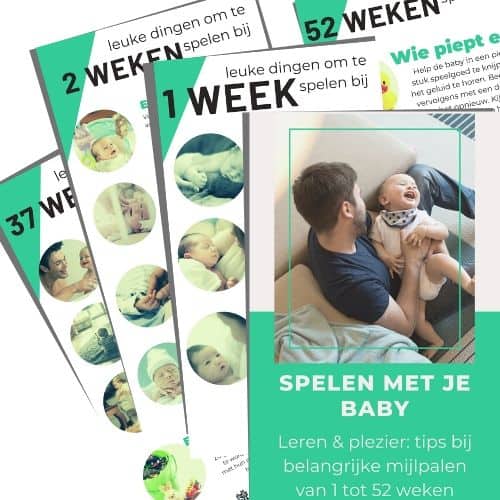52 weeks of playing and learning with your baby: a complete milestones guide

Always something to do for the holidays or rainy day?
Play Choice now has the ultimate activity book collection, with over 60 pages of fun coloring pages and educational puzzles.
Playing with your baby can be a lot of fun, but it is also very good for them.
He will probably always give indications of where he stands to do with you, but you may occasionally run out of inspiration what to explore again.
That's why I've put together this comprehensive guide full of fun activities and games to do with your baby at each milestone.
52 weeks of fun play tips for you and your baby
Click here to download all the tips as a pdf to view them later, or click on the image below:
In this guide, I'll focus on the fun things you can do with each new skill that your child is learning. Here are the most important milestones in short of Growing Bigger:

From toddler to toddler activity book collection
Educational games and coloring pages for 3 to 6 years
Your toddler and preschooler will love this e-book, along with the accompanying printables. He or she can play with it at every stage of development, together with mom and dad.
Buy at Bol.comWhat we discuss in this comprehensive post:
- 1 Key milestones of 0-3 months
- 1.1 Play with your 1 week old baby
- 1.2 Play with your 2 week old baby
- 1.3 Play with your 3 week old baby
- 1.4 Playing with your 4 week (1 month) baby
- 1.5 Play with your 5 week old baby
- 1.6 Play with your 6 week old baby
- 1.7 Play with your 7 week old baby
- 1.8 Playing with your 8 week (2 month) baby
- 1.9 Play with your 9 week old baby
- 1.10 Play with your 10 week old baby
- 1.11 Play with your 11 week old baby
- 1.12 Play with your 12 week old baby
- 1.13 Playing with your 13 week (3 month) baby
- 2 Key milestones of 4-6 months
- 2.1 Play with your 14 week old baby
- 2.2 Play with your 15 week old baby
- 2.3 Play with your 16 week old baby
- 2.4 Playing with your 17 week (4 month) baby
- 2.5 Play with your 18 week old baby
- 2.6 Play with your 19 week old baby
- 2.7 Play with your 20 week old baby
- 2.8 Play with your 21 week old baby
- 2.9 Playing with your 22 week (5 month) baby
- 2.10 Play with your 23 week old baby
- 2.11 Play with your 24 week old baby
- 2.12 Play with your 25 week old baby
- 2.13 Playing with your 26 week (6 month) baby
- 3 Key milestones of 7-9 months
- 3.1 Play with your 27 week old baby
- 3.2 Play with your 28 week old baby
- 3.3 Play with your 29 week old baby
- 3.4 Play with your 30 week old baby
- 3.5 Playing with your 31 week (7 month) baby
- 3.6 Play with your 32 week old baby
- 3.7 Play with your 33 week old baby
- 3.8 Play with your 34 week old baby
- 3.9 Playing with your 35 week (8 month) baby
- 3.10 Play with your 36 week old baby
- 3.11 Play with your 37 week old baby
- 3.12 Play with your 38 week old baby
- 3.13 Playing with your 39 week (9 month) baby
- 4 Key milestones of 10-12 months
- 4.1 Play with your 40 week old baby
- 4.2 Play with your 41 week old baby
- 4.3 Play with your 42 week old baby
- 4.4 Playing with your 43 week (10 month) baby
- 4.5 Play with your 44 week old baby
- 4.6 Play with your 45 week old baby
- 4.7 Play with your 46 week old baby
- 4.8 Play with your 47 week old baby
- 4.9 Playing with your 48 week (11 month) baby
- 4.10 Play with your 49 week old baby
- 4.11 Play with your 50 week old baby
- 4.12 Play with your 51 week old baby
- 4.13 Playing with your 52 week (12 month) baby
- 5 How does a baby learn about itself?
Key milestones of 0-3 months
Motor milestones
- Your baby learns to lie on his stomach and push himself up with his arms
- He also learns to lift his head up on his tummy
- Be able to move fists from closed to open
- Be able to bring his hands to his mouth
- Can lift legs and arms off a surface when excited
Sensory milestones
- While lying on their back, they try to grab a toy above their chest
- Lying on their back, they can visually follow a moving toy from left to right
- While lying on their back, they keep their heads centered to view faces or toys
- Being able to calm down with rocking, touch and soft sounds
- Enjoy different moves
Communication milestones
- Becomes quiet or laughs in response to sound or voice
- Turns the head to a sound or voice
- Shows interest in faces
- Makes eye contact
- Cries differently for different needs (e.g. hunger versus tired)
- Babbles and smiles
Nutritional milestones
- Sucks on nipple or bottle
- Tongue moves forward and back to suck
- Drinks 6 to 18 centilitres of liquid per feeding, 6 times a day
- Sucks and swallows well while feeding
Play with your 1 week old baby
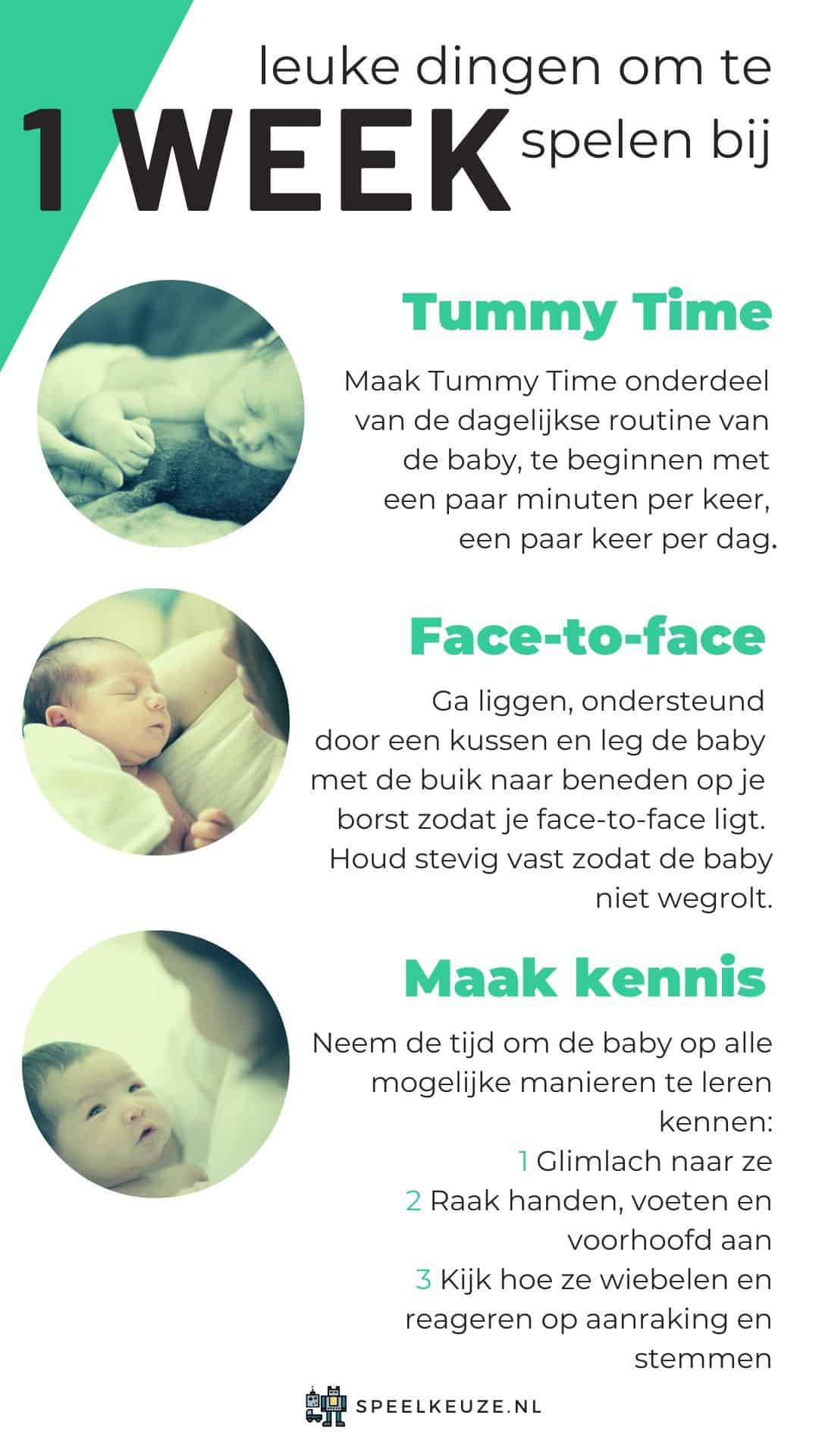
Tummy Play
Always remember: sleep on your back, on your stomach to play.
Your baby may not like to lie on his stomach at first because the back and neck muscles are not very strong yet.
Make Tummy Time part of the baby's daily routine, starting with a few minutes at a time, a few times a day, says Tineke van Westerop.
Helps baby develop core strength.
Face-to-face
Lie down supported by a pillow and place the baby belly down on your chest so that you are face-to-face. Hold firmly so the baby doesn't roll away.
This helps the baby strengthen core muscles and reach developmental milestones for this age.
Meet the baby
Take the time to get to know the baby in every way you can.
- Smile at them.
- Touch hands, feet and forehead.
- Watch them wobble and respond to touch and voices.
Helps you connect with your baby.
Play with your 2 week old baby
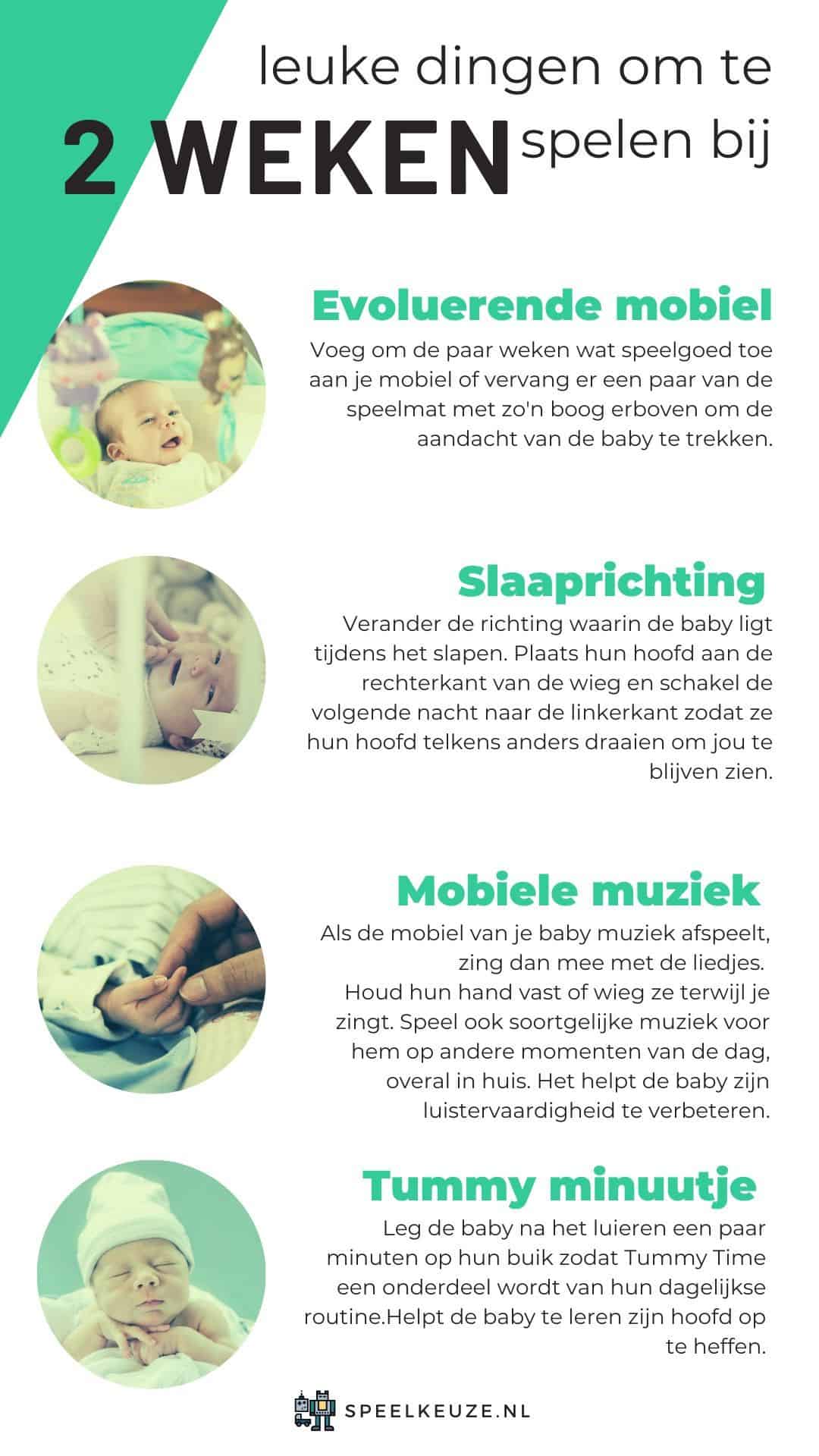
Evolving mobile
Every few weeks, add some toys to your mobile or replace a few of the play mat with such an arch above it to get the baby's attention.
Wobbling the toy also allows the baby to look at the new toy. Once the baby can sit up, take the mobile down due to safety concerns.
Helps the baby to develop vision by providing new and interesting objects and colors to look at.
Sleeping direction
Change the direction the baby lies in when sleeping. Place their head on the right side of the crib and switch to the left the next night.
Helps babies build strength by having to turn different directions to see you and, according to babybytes.nl, it is also good for a flat head
Mobile music
If your baby's mobile is playing music, sing along to the songs. Hold or rock their hand while you sing.
Play similar music for him at other times of the day, all around the house. It helps the baby improve his listening skills.
Tummy minute
After lounging, place the baby on their stomach for a few minutes so that Tummy Time becomes part of their daily routine.
Helps the baby learn to lift his head.
Play with your 3 week old baby
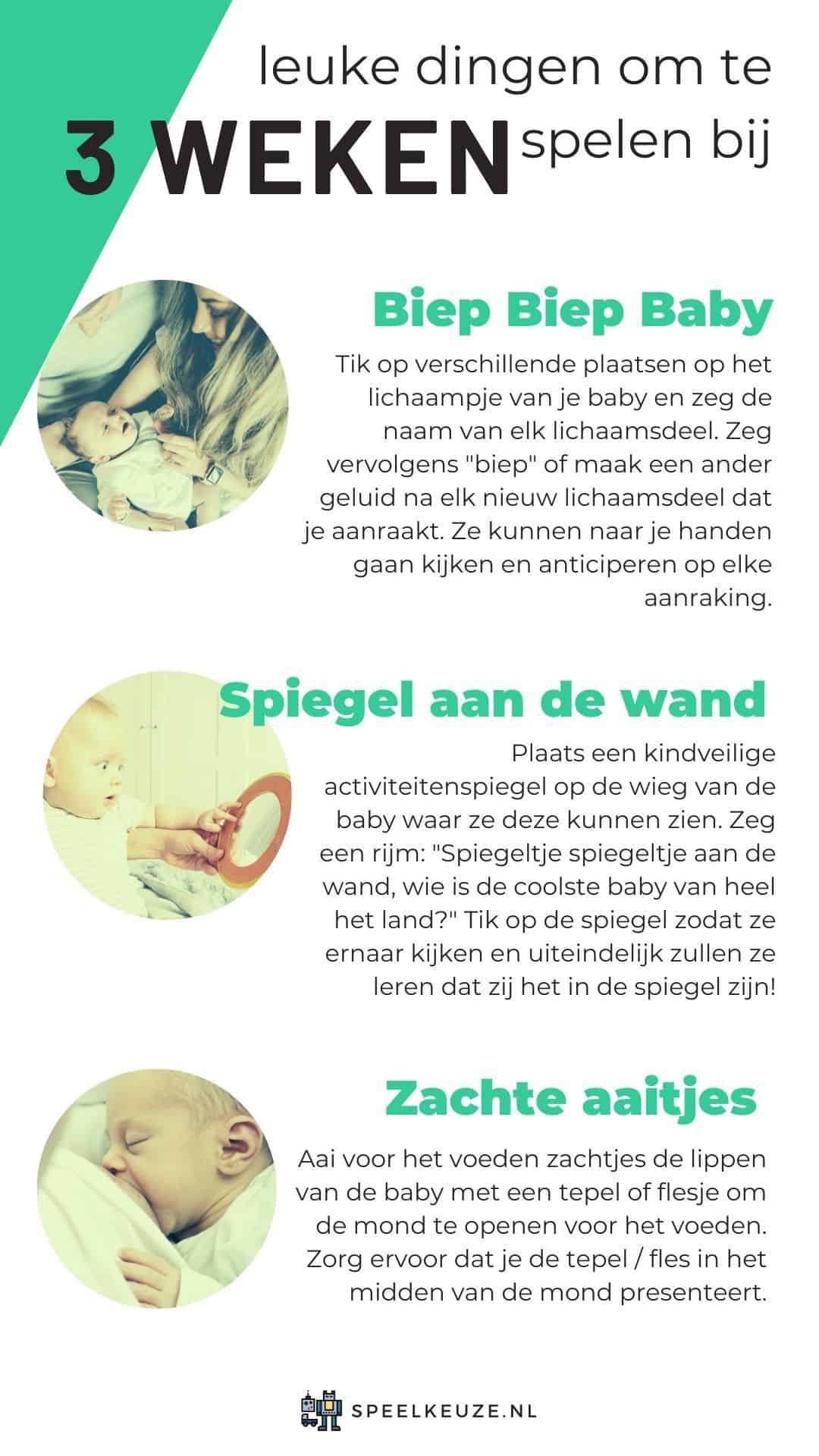
Beep Beep Baby
Tap your baby's body in several places and say the name of each body part. Then say “beep” or make a different sound after each new body part you touch.
They can start looking at your hands and anticipate every touch.
It helps the baby develop their sense of touch and body awareness.
Help sit up
Opinions are divided on this, many parents did it to help their child strengthen, but according to minime.nl, for example, research has shown that it is not a good idea to help sit too early.
If you do, do it safe and. Place the baby on its back facing you. Place your hands behind his shoulders and head for support and slowly raise them to a sitting position.
Keep repeating this movement. Once the baby can support the head, you can exercise while holding their hands.
It helps the baby build strength.
Mirror on the wall
Place a child-safe activity mirror on the baby's crib where they can see it. Say a rhyme:
"Mirror, mirror on the wall, who is the coolest baby in the country?"
Tap the mirror so they look at it and eventually they'll learn it's them in the mirror!
It helps the baby develop his vision.
Gentle pats
Before feeding, gently pat the baby's lips with a nipple or bottle to open the mouth for feeding.
Make sure to present the nipple / bottle in the center of the mouth.
Helps the baby to suckle to eat.
Playing with your 4 week (1 month) baby
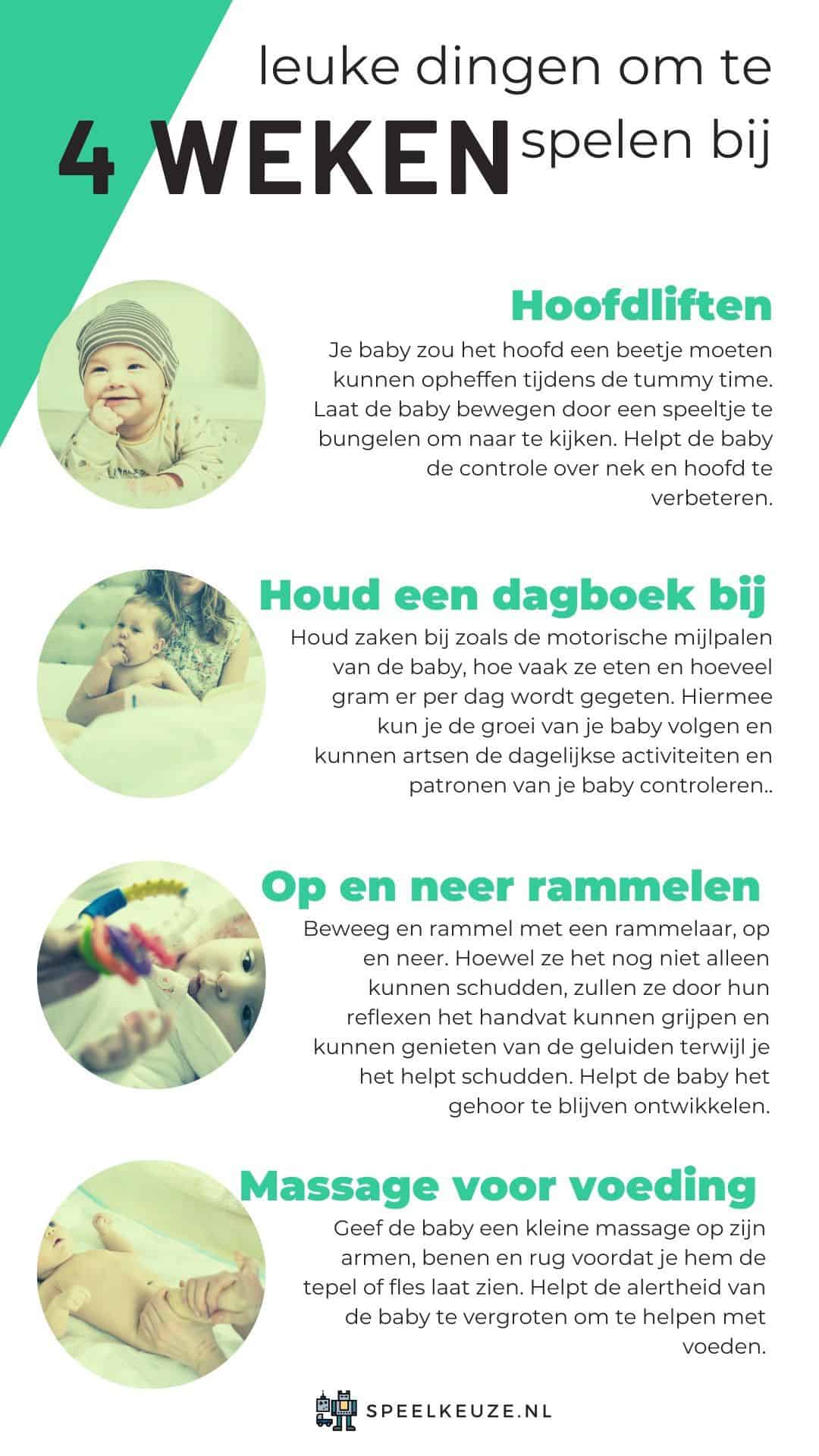
Main lifts
Your baby should be able to lift his head a little during tummy time (sometime in his second month at least). Get the baby moving by dangling a toy to look at.
It helps the baby improve neck and head control.
Keep a diary
Keep track of things like the baby's motor milestones, how often they eat and how many grams are eaten per day.
It allows you to monitor your baby's growth and allows doctors to monitor your baby's daily activities and patterns.
If you are concerned about your baby's development, make sure to share the diary with your healthcare provider.
Rattle up and down
Move and rattle with a rattle, up and down.
While they can't shake it on their own just yet, their reflexes will allow them to grab the handle and enjoy the sounds as you help shake it.
This helps the baby to continue to develop hearing.
Massage before feeding
Give the baby a small massage on his arms, legs and back before showing him the nipple or bottle.
It helps increase the baby's alertness to aid in feeding.
Play with your 5 week old baby
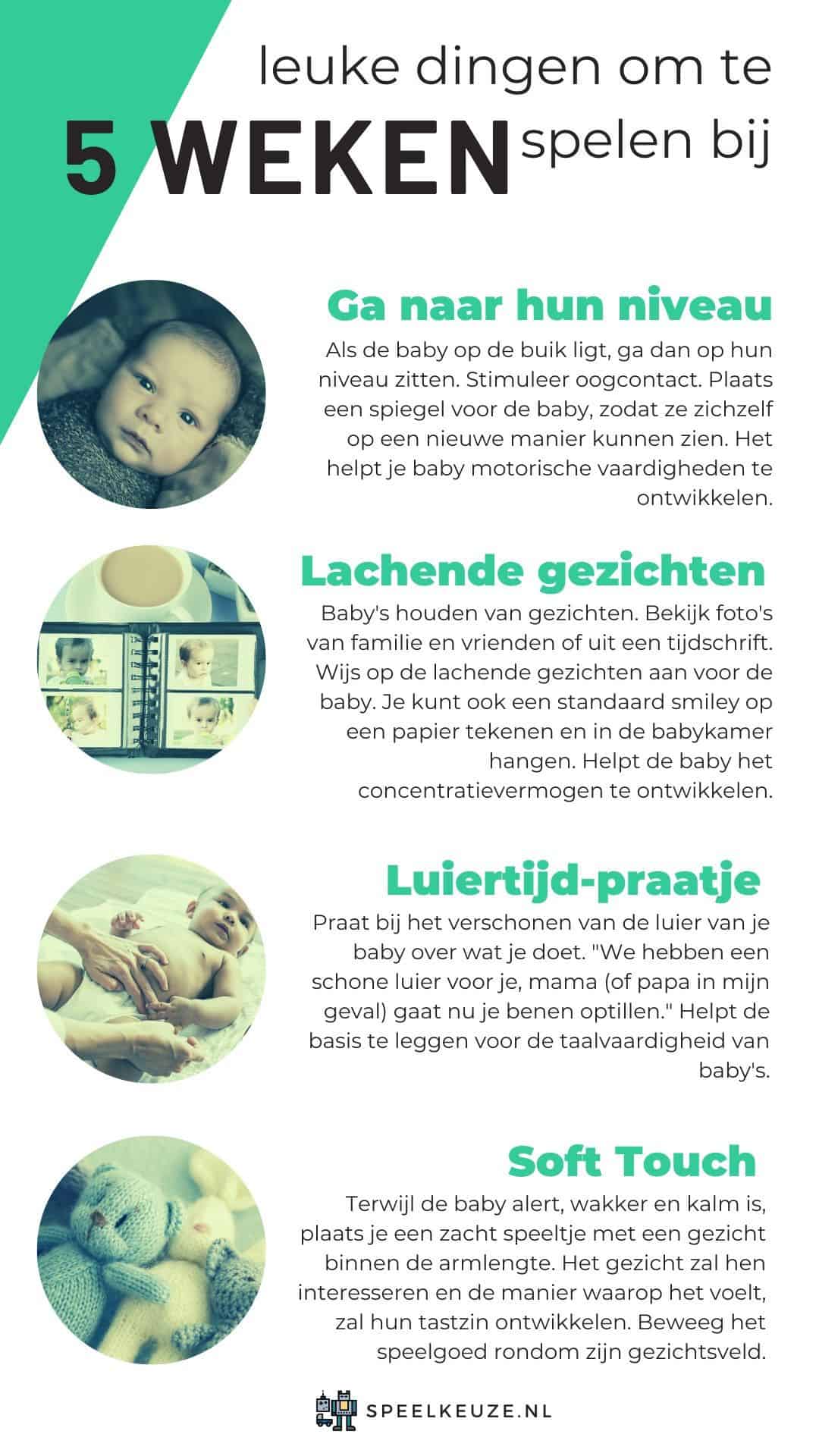
Go to their level
If the baby is on the stomach, sit on their level. Encourage eye contact. Place a mirror in front of the baby so they can see themselves in a new way.
It helps your baby develop motor skills.
Smiling faces
Babies love faces. View photos from family and friends or from a magazine. Point out the smiling faces for the baby.
You can also draw a standard smiley face on a piece of paper and hang it in the nursery.
Helps the baby develop the ability to concentrate.
Lazy time chat
When changing your baby's diaper, talk about what you are doing.
"We have a clean diaper for you, mom (or dad in my case) is now going to lift your legs."
Helps lay the foundation for babies' language skills.
Soft touch
While the baby is alert, awake, and calm, place a soft toy with a face within arm's length.
The face will interest them and the way it feels will develop their sense of touch. Move the toy up and down left and right in front of his field of vision.
It helps babies track objects and develop visual focus.
Play with your 6 week old baby
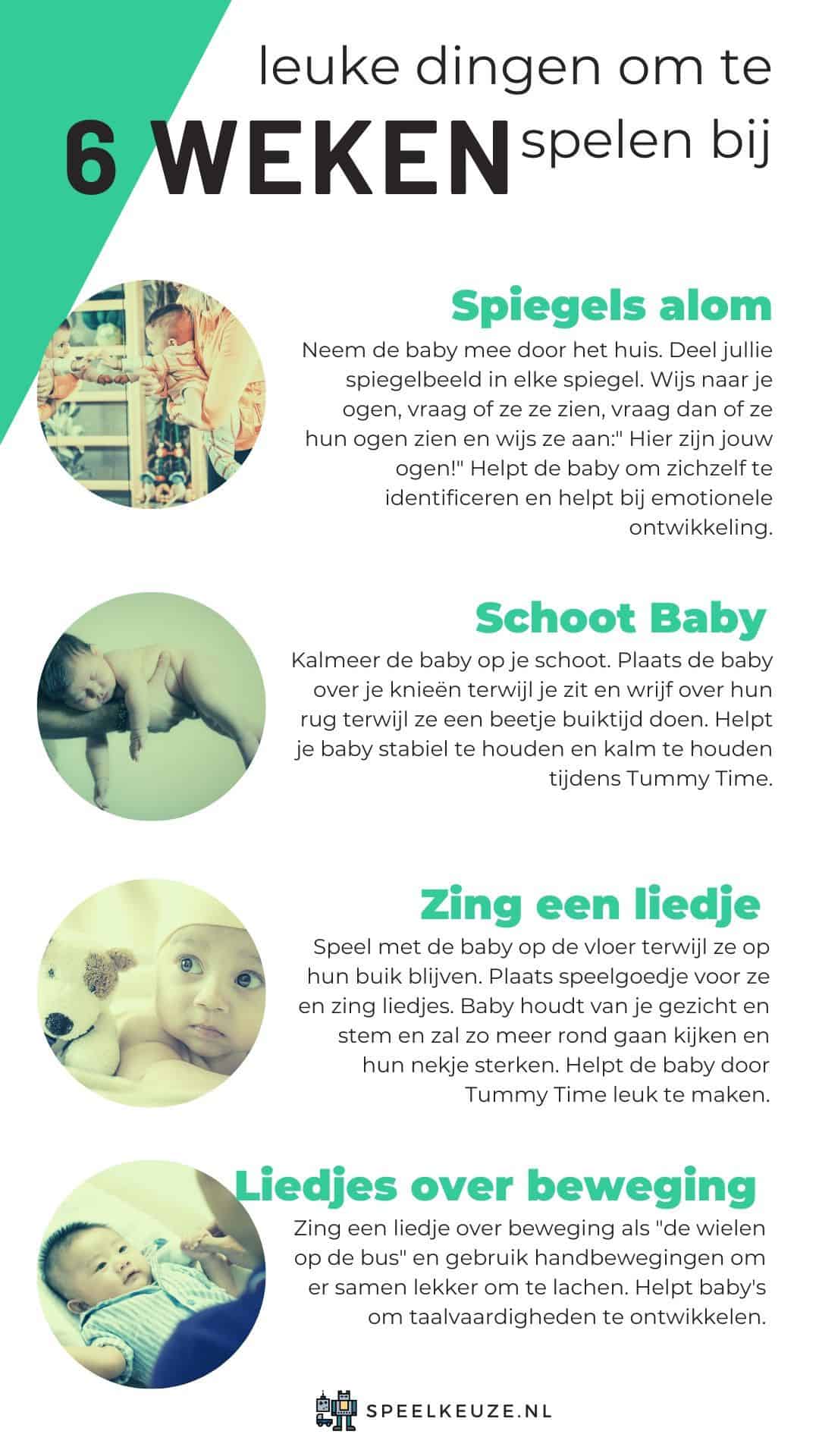
Mirrors everywhere
Take the baby around the house. Share your reflection in each mirror. Point to your eyes, ask if they see them, then ask if they see their eyes and point to them:
"Here are your eyes!"
Helps the baby identify itself and aids in emotional development.
Lap Baby
Calm the baby on your lap. Place the baby over your knees as you sit and rub their back while they do a little tummy time.
Helps keep your baby stable and calm during Tummy Time.
Sing a song
Play with the baby on the floor while they remain on their stomach. Place toys in front of them and sing songs.
Baby loves your face and voice and will start to look around and strengthen their necks.
Helps the baby by making Tummy Time fun.
Songs about movement
Sing a song about movement like "the wheels on the bus" and use hand movements to have a good laugh together.
Helps babies develop language skills.
Play with your 7 week old baby
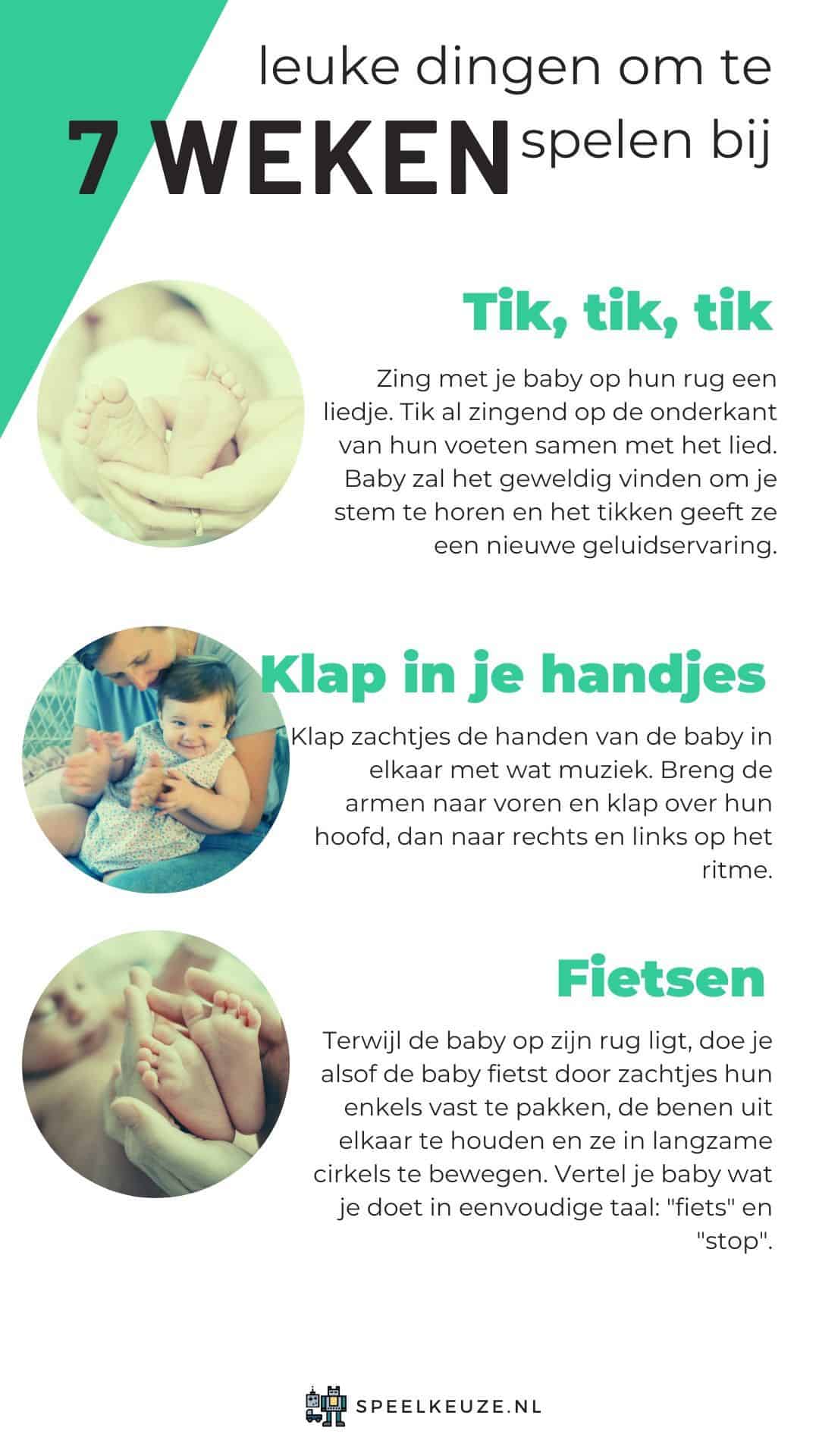
Tap, tap, tap
Sing a song with your baby on their back. While singing, tap the bottom of their feet along with the song.
Baby will love hearing your voice and the tapping will give them a new sound experience.
Helps the baby develop listening skills.
Clap your hands
Gently clap the baby's hands together with some music. Bring the arms forward and clap their heads, then right and left to the beat.
Helps the baby develop body awareness.
Bikes
While the baby is lying on his back, pretend the baby is cycling by gently grasping their ankles, keeping the legs apart and moving them in slow circles.
Tell your baby what you are doing in simple language: “cycle” and “stop”.
Helps the baby develop motor and hearing skills.
Playing with your 8 week (2 month) baby
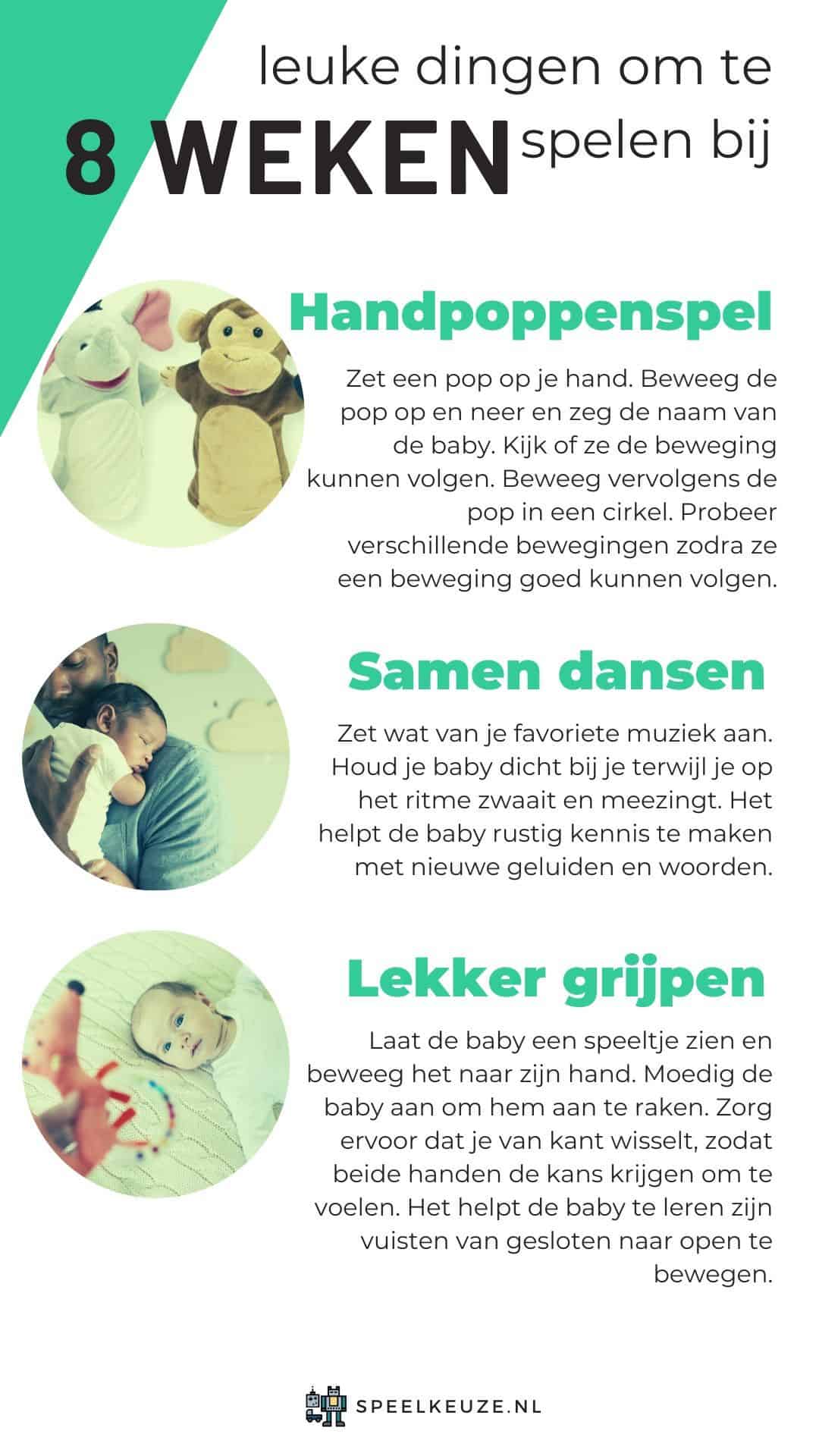
Hand puppet play
Put a doll on your hand. Move the doll up and down and say the name of the baby. See if they can follow the movement.
Then move the doll in a circle. Once they can follow a movement well, try different movements.
There are a lot you can choose from, but I always think Melissa & Doug is such a nice brand, and your child can also play with these zoo animals:
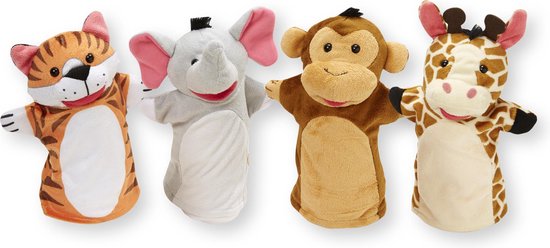
It helps the baby develop vision skills.
Dance together
Turn on some of your favorite music. Hold your baby close to you as you swing and sing along to the beat.
It helps the baby to get acquainted with new sounds and words quietly.
Nice to grab
Show the baby a toy and move it to his hand. Encourage the baby to touch him.
Make sure to switch sides so that both hands have a chance to feel.
You can even use common household items such as spoons or ladles (my son actually liked the wooden ladle best and a lot more fun than toys).
It helps the baby learn to move his fists from closed to open.
Play with your 9 week old baby
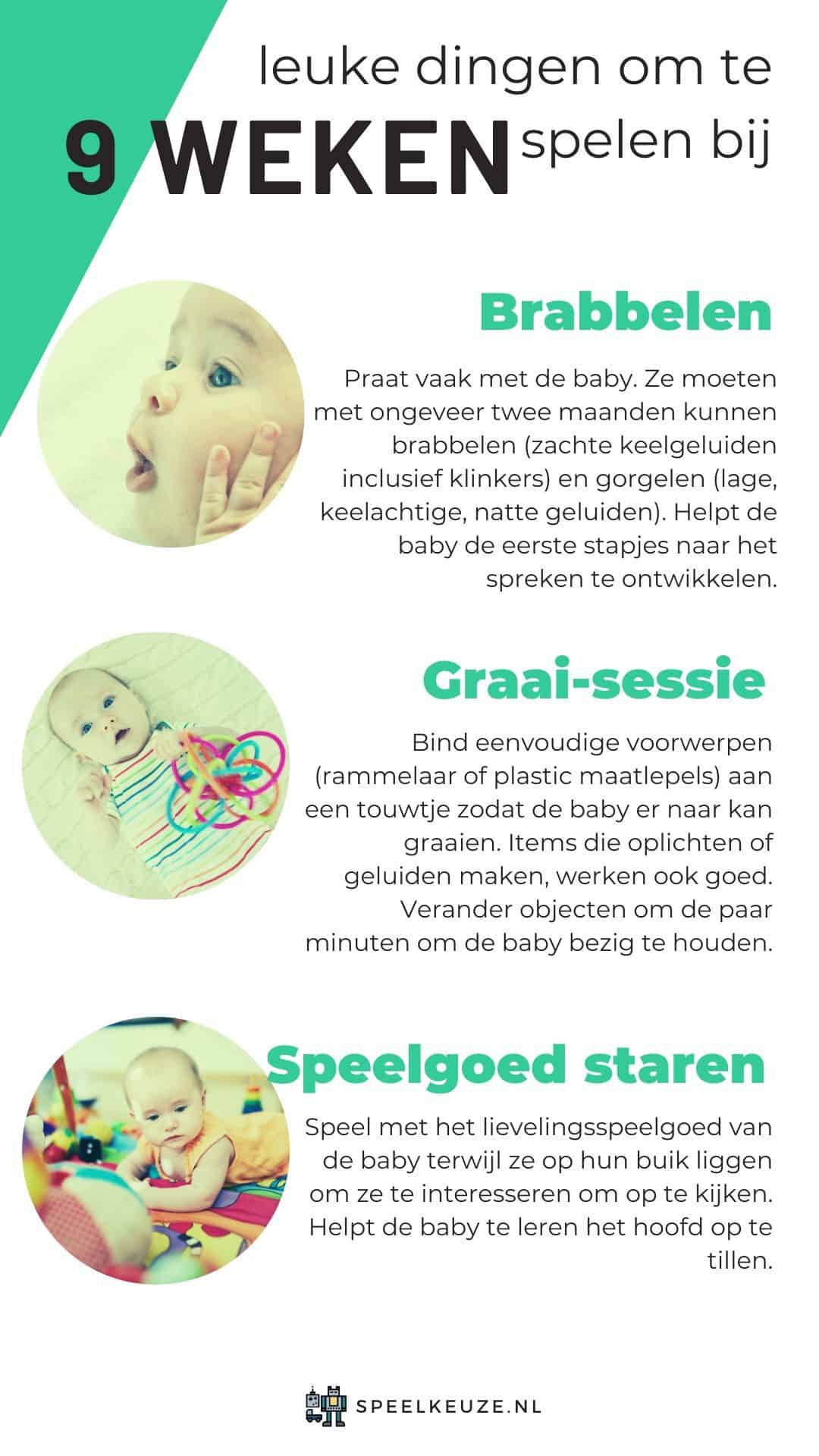
Babble and gargle
Talk to the baby often. At about two months they should be able to babble (soft guttural sounds including vowels, as Kijkopontwikkeling.nl calls it) and gargle (low, throaty, wet sounds).
Helps the baby develop the first steps to speaking.
Alternate grab session
Tie simple objects (rattle or plastic measuring spoons) to a string so that the baby can reach for them.
Items that light up or make noises also work well. Change objects every few minutes to keep baby busy.
Make sure objects are not a choking hazard.
Helps the baby develop hand-eye coordination.
Staring toys
Play with the baby's favorite toys while they lie on their stomach to get them interested in looking up.
Helps the baby learn to lift the head.
Play with your 10 week old baby
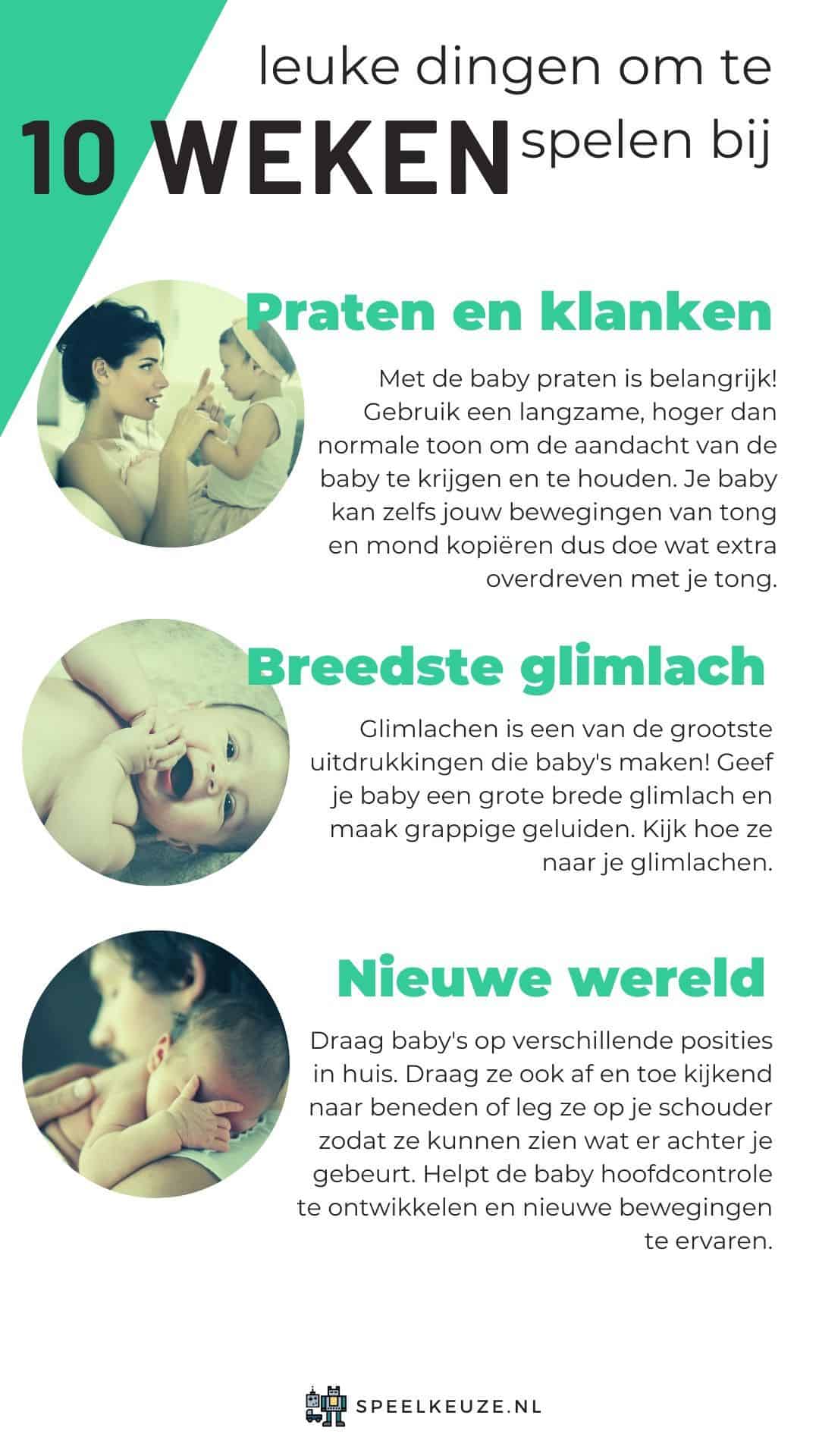
Talk and articulate
Talking to the baby is important!
Use a slow, higher-than-normal tone, almost melodic voice to get and keep the baby's attention.
Babies prefer the sound of mothers 'and fathers' voices.
Your baby can even copy your tongue and mouth movements, so go the extra mile with your tongue.
Helps the baby develop listening skills and mouth muscles.
Who has the widest smile?
Smiling is one of the greatest expressions babies make!
Give your baby a big smile and make funny sounds. Watch them smile at you.
Helps the baby bond with you and teaches them how to interact with others.
A whole new world
Carry babies in different positions around the house. Also wear them looking down from time to time or put them on your shoulder so they can see what's going on behind you.
Helps the baby develop head control and experience new movements.
Play with your 11 week old baby
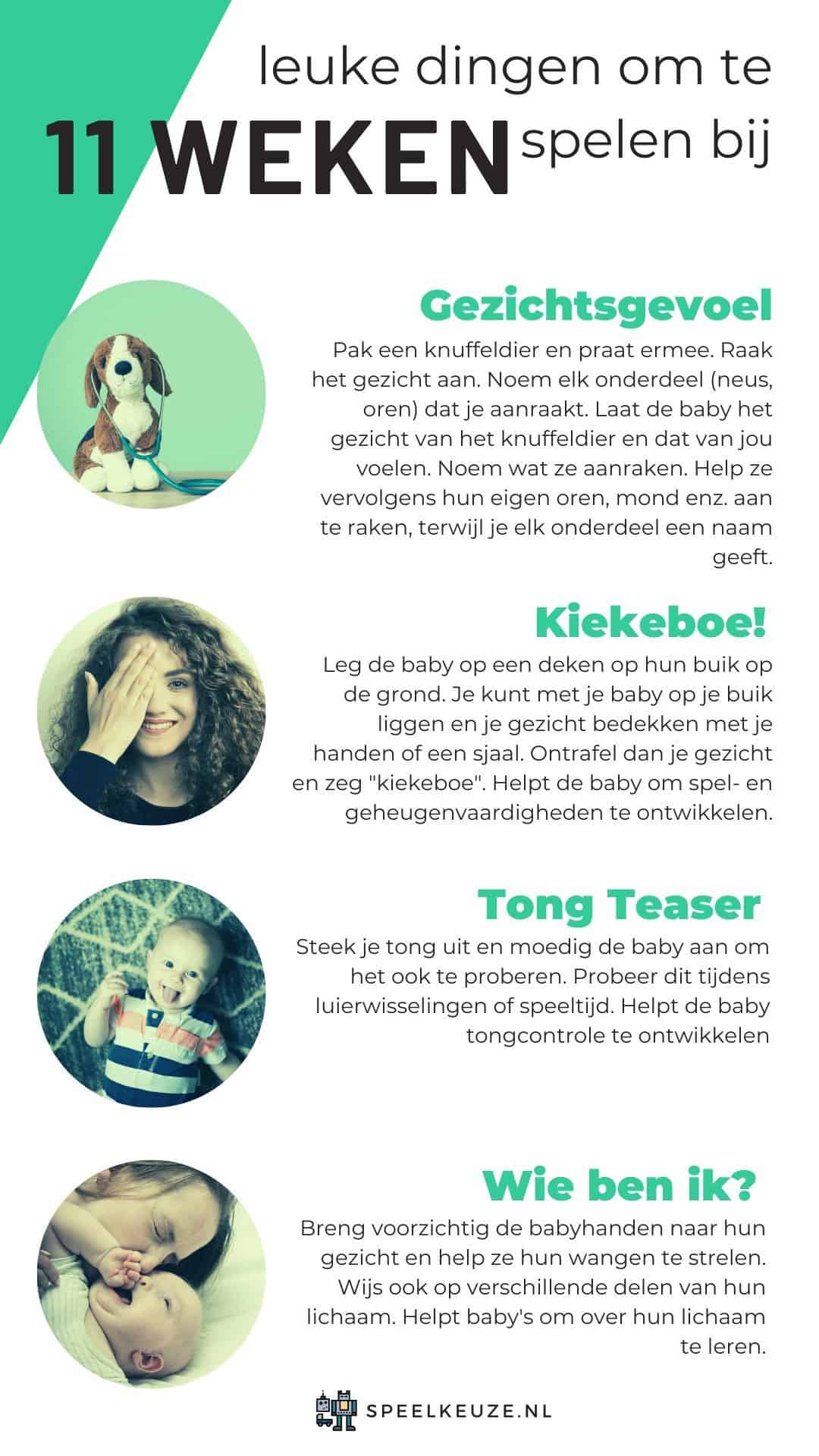
Facial feeling
Grab a stuffed animal and talk to it. Touch the face. Name every part (nose, ears) that you touch.
Let the baby feel the stuffed animal's face and yours. Name what they touch.
Then help them touch their own ears, mouth, etc., while naming each part.
Helps the baby develop the sense of touch.
Peek a boo!
Place the baby on a blanket on their stomach on the floor. You can lie on your stomach with your baby and cover your face with your hands or a scarf.
Then unravel your face and say "peek-a-boo".
Helps the baby develop play and memory skills.
Tongue Teaser
Stick out your tongue and encourage the baby to try too. Try this during diaper changes or playtime.
Helps the baby develop tongue control
Who am I?
Gently bring the baby hands to their faces and help them caress their cheeks.
Also point out different parts of their body.
Helps babies learn about their bodies.
Play with your 12 week old baby
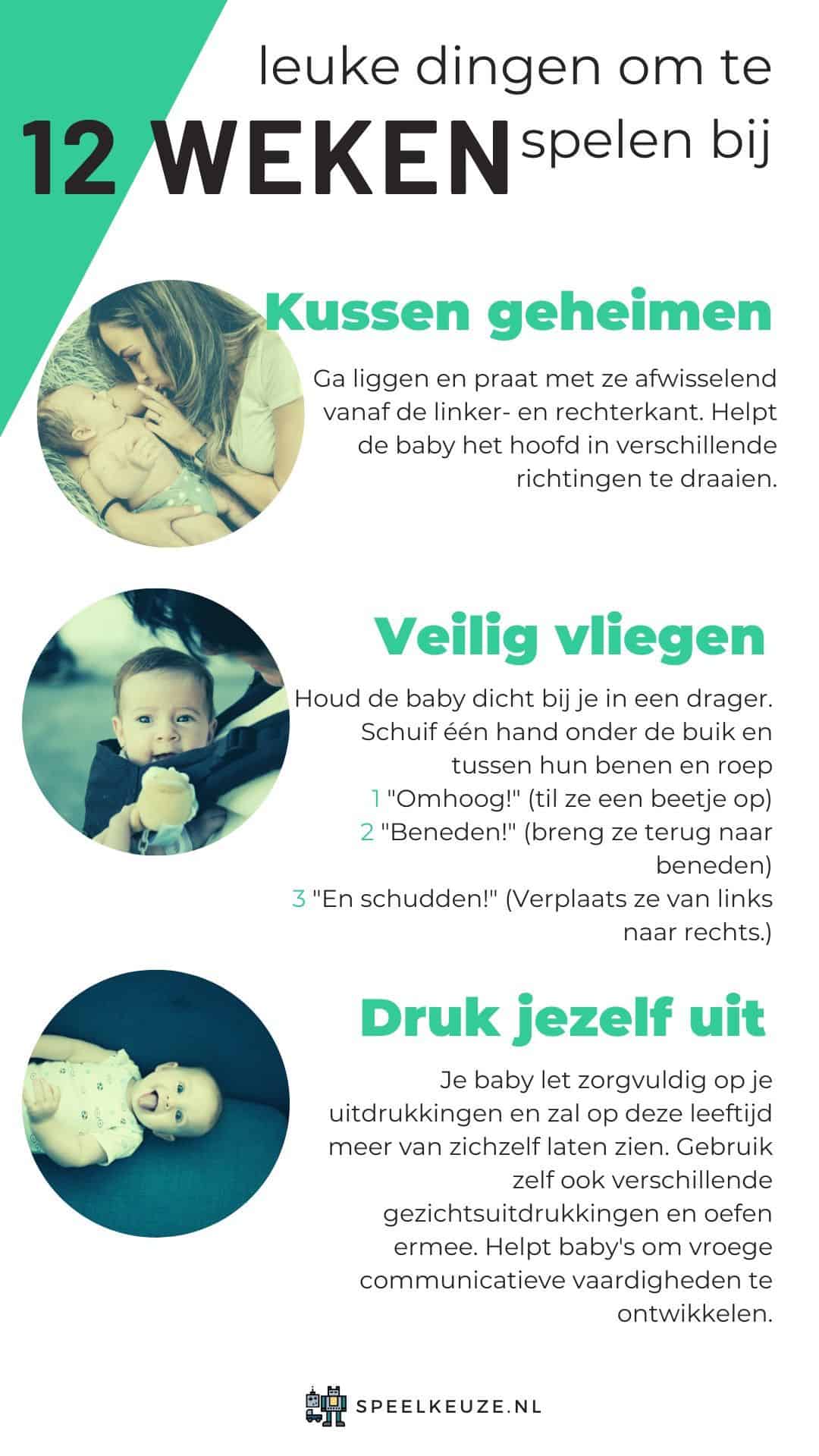
Kissing secrets
Lie down and talk to them alternately from the left and right sides.
Helps the baby turn the head in different directions.
Safety fly
Keep the baby close to you in a carrier. Slide one hand under the belly and between their legs and shout
- "Up!" (lift them up a bit)
- "Down!" (bring them back down)
- "And shake!" (Move them from left to right.)
Helps the baby build strength and communication skills.
Express yourself
Your baby is watching your expressions carefully and will show more of himself at this age. Use and practice different facial expressions yourself.
Helps babies develop early communication skills.
Playing with your 13 week (3 month) baby
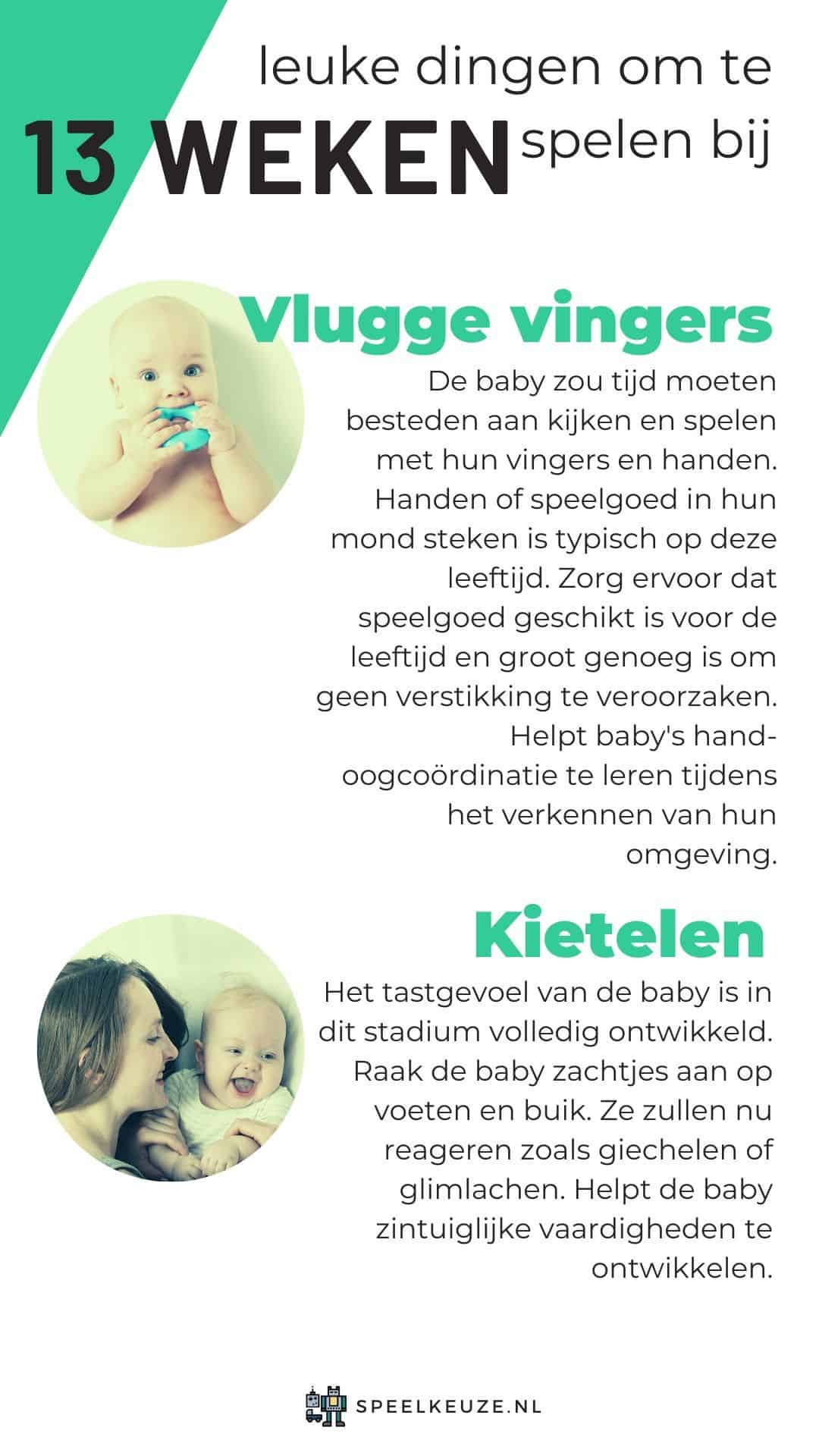
Quick fingers
The baby should spend time watching and playing with their fingers and hands. Putting hands or toys in their mouths is typical at this age.
Make sure toys are age appropriate and large enough not to cause choking.
Helps babies learn hand-eye coordination as they explore their environment.
Tickling
The baby's sense of touch is fully developed at this stage.
Touch the baby gently on the feet and stomach. They will now respond like giggles or smiles.
Helps the baby develop sensory skills.
Key milestones of 4-6 months
Motor milestones
- Uses hands to support himself while sitting
- Rolls from back to stomach and stomach to back
- Standing with support on the couch, for example, and can already carry the entire weight with his legs
- Reaches for nearby toys while lying on the stomach
- Lying on the back, reach out both hands to play with the feet
- Lying on the back, transfers a toy from one hand to the other
Sensory milestones
- Uses both hands to explore toys
- Generally happy when they are not hungry or tired
- Brings hands and objects to mouth
- Able to calm down with rocking, touch and soft sounds
- Does not get upset by everyday sounds
- Enjoy different moves
Communication milestones
- Responds to sudden noises
- Listens and responds when spoken to
- Begins to use consonant sounds when babbling, eg "Da, da, da"
- Makes different kinds of sounds to express feelings
- Notices toys that make sounds
- Used to chat to get attention
Nutritional milestones
- Shows interest in different foods
- Opens mouth as spoon approaches
- Moves mashed food from front to back in the mouth
- Starts eating grains and pureed foods: Smooth, pureed foods (one ingredient only), such as carrots, sweet potato, pumpkin, apples, pears
Play with your 14 week old baby
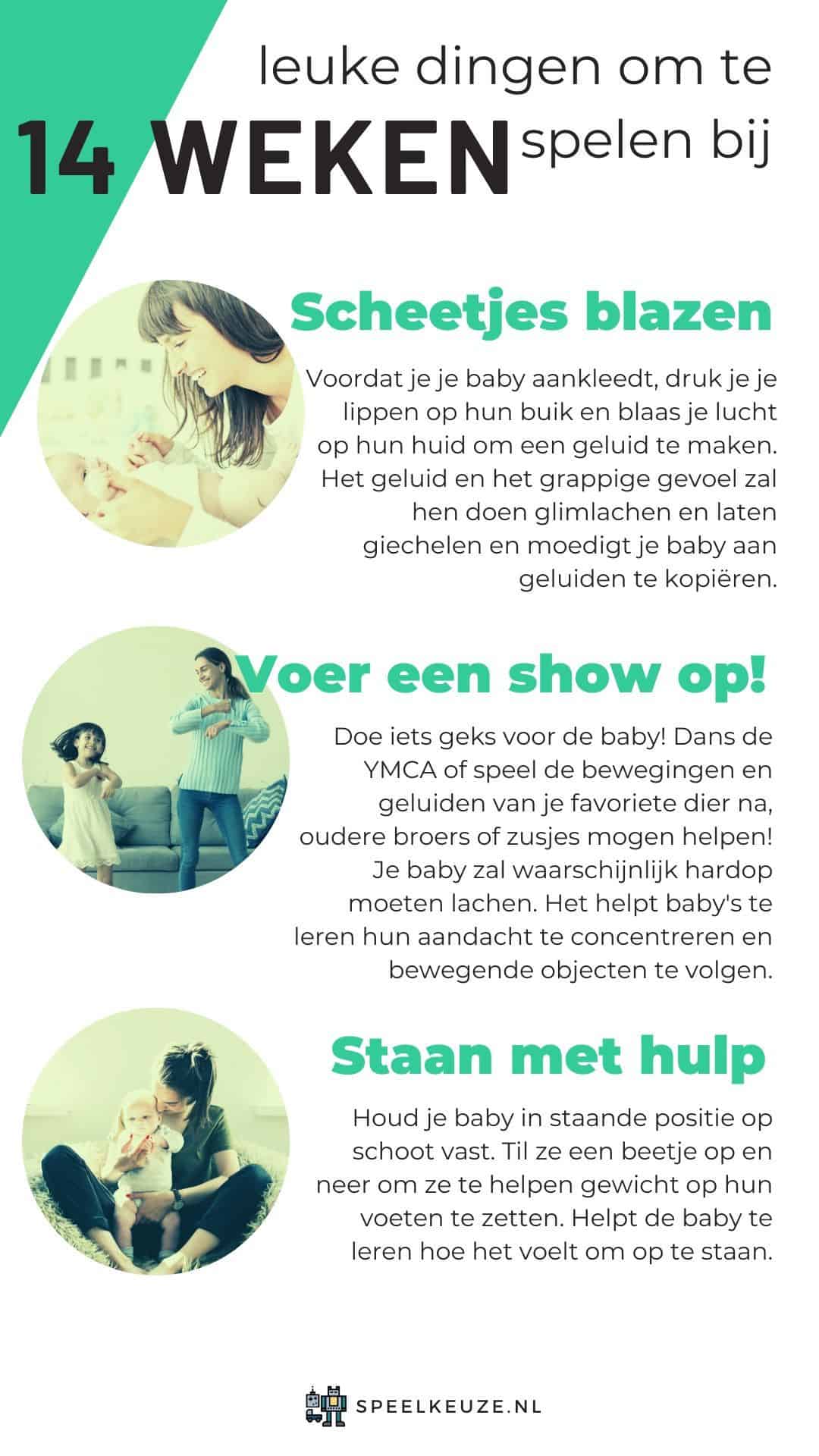
Blowing farts
Before dressing your baby, press your lips to their stomach and blow air onto their skin to make a sound.
The sound and funny feeling will make them smile and giggle.
This encourages the baby to make their own sounds and lip movements, which is good practice for chatting and copying sounds.
Helps babies build communication skills.
Put on a show!
Do something crazy for the baby! Dance the YMCA or play out the movements and sounds of your favorite animal, older siblings can help!
Your baby will probably laugh out loud.
It helps babies learn to focus their attention and track moving objects.
Stand supported
Hold your baby on your lap in a standing position. Lift them up and down a bit to help them put weight on their feet.
Helps the baby learn what it feels like to get up.
Play with your 15 week old baby
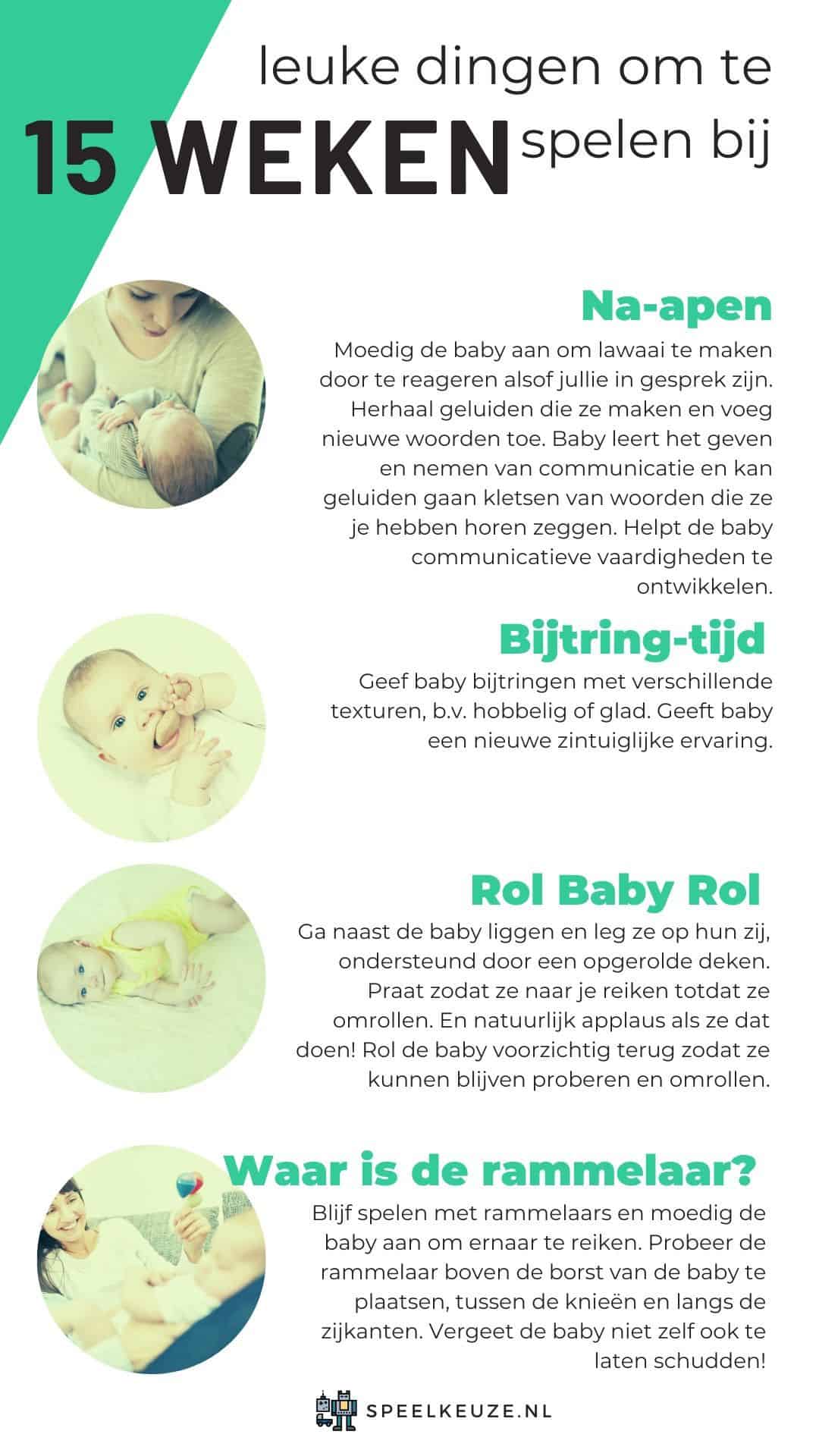
Copycat
Encourage the baby to make noise by responding as if you were talking. Repeat sounds they make and add new words.
Baby learns to give and take communication and may start chatting sounds of words they heard you say.
Helps the baby develop communication skills.
Teether time
Give baby teethers with different textures, eg bumpy or smooth.
Gives baby a new sensory experience.
Roll Baby Roll
Lie down next to the baby and lay them on their side, supported by a rolled up blanket. Talk so they reach for you until they roll over. And of course applause when they do!
Gently roll the baby back so they can keep trying and rolling over.
Helps the baby strengthen core muscles to prepare for future milestones.
Where's the rattle?
Keep playing with rattles and encourage baby to reach for them.
Try to place the rattle above the baby's chest, between the knees and along the sides.
Don't forget to shake the baby too!
Helps the baby develop motor skills by encouraging him to grab and hold toys.
Play with your 16 week old baby
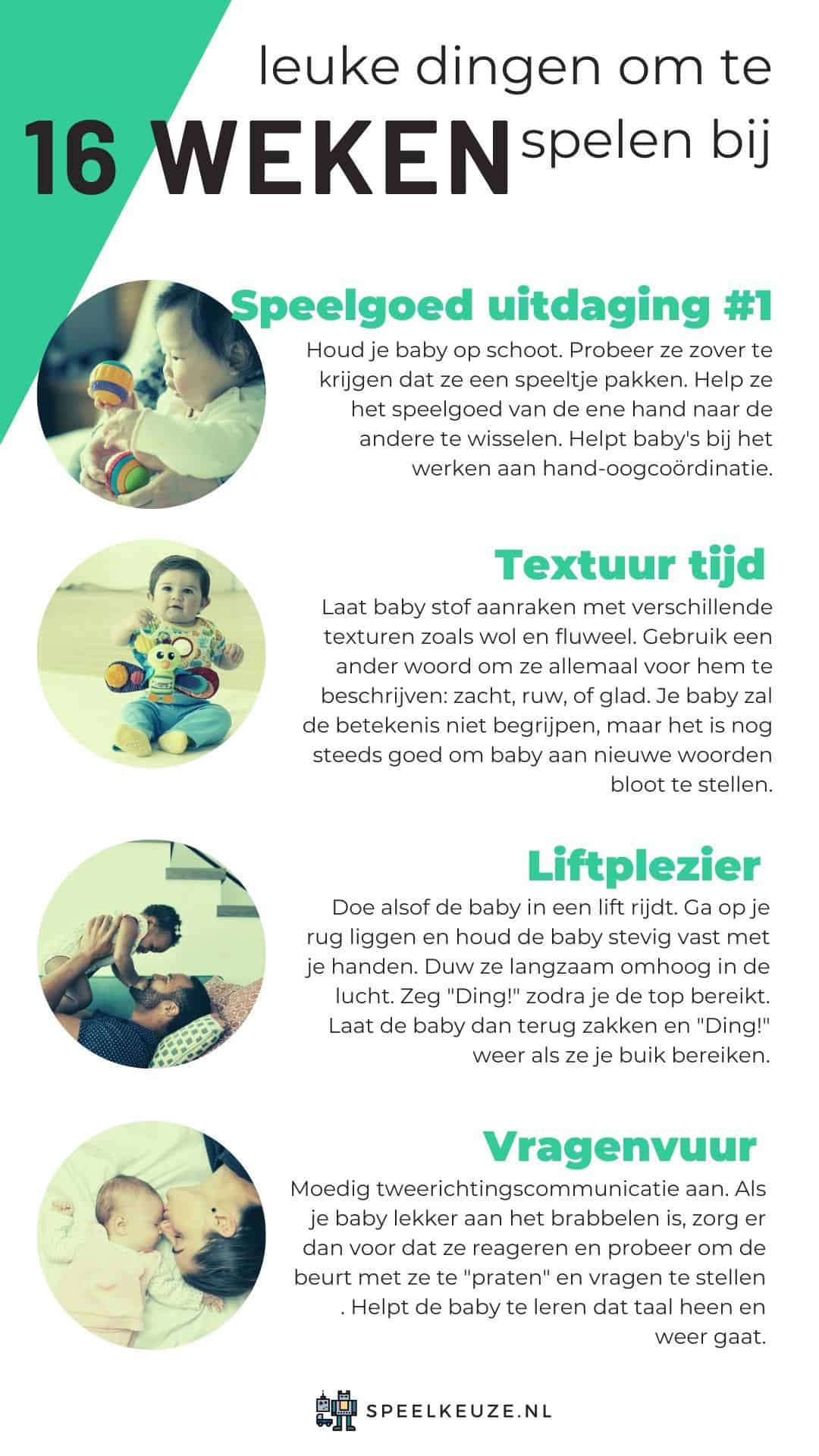
Toy Challenge # 1
Keep your baby on your lap. Try to get them to grab a toy. Help them switch the toys from one hand to the other.
Helps babies work on hand-eye coordination.
Texture time
Have baby touch fabric with different textures such as wool and velvet.
Use another word to describe them all for him:
- soft
- ruw
- glad
Your baby will not understand the meaning, but it is still good to expose baby to new words.
You can use fabrics you have in your sewing kit, or if you don't have these like me I think Lamaze's toys are so cute and useful with different textures like this Jacques de Pauw:
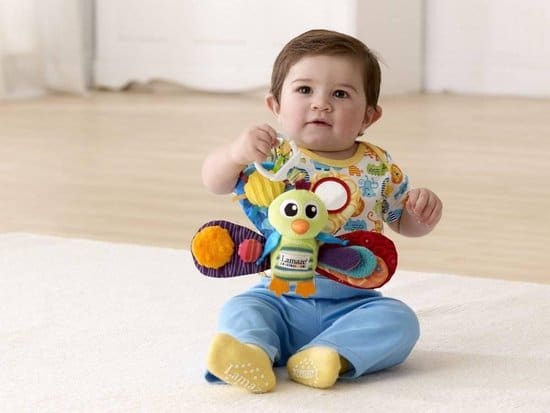
Helps babies get to know the world around them through their sense of touch.
Lift fun
Pretend the baby is riding in an elevator.
Lie on your back and hold the baby firmly with your hands. Slowly push them up into the air. Say "Ding!" once you reach the top.
Then lower the baby back and say "Ding!" again when they reach your stomach.
Helps babies build strength with Tummy Time.
Questioning
Encourage two-way communication. If your baby is babbling nicely, get them to respond and take turns “talking” and “asking questions” with them.
Helps the baby learn that language moves back and forth.
Playing with your 17 week (4 month) baby
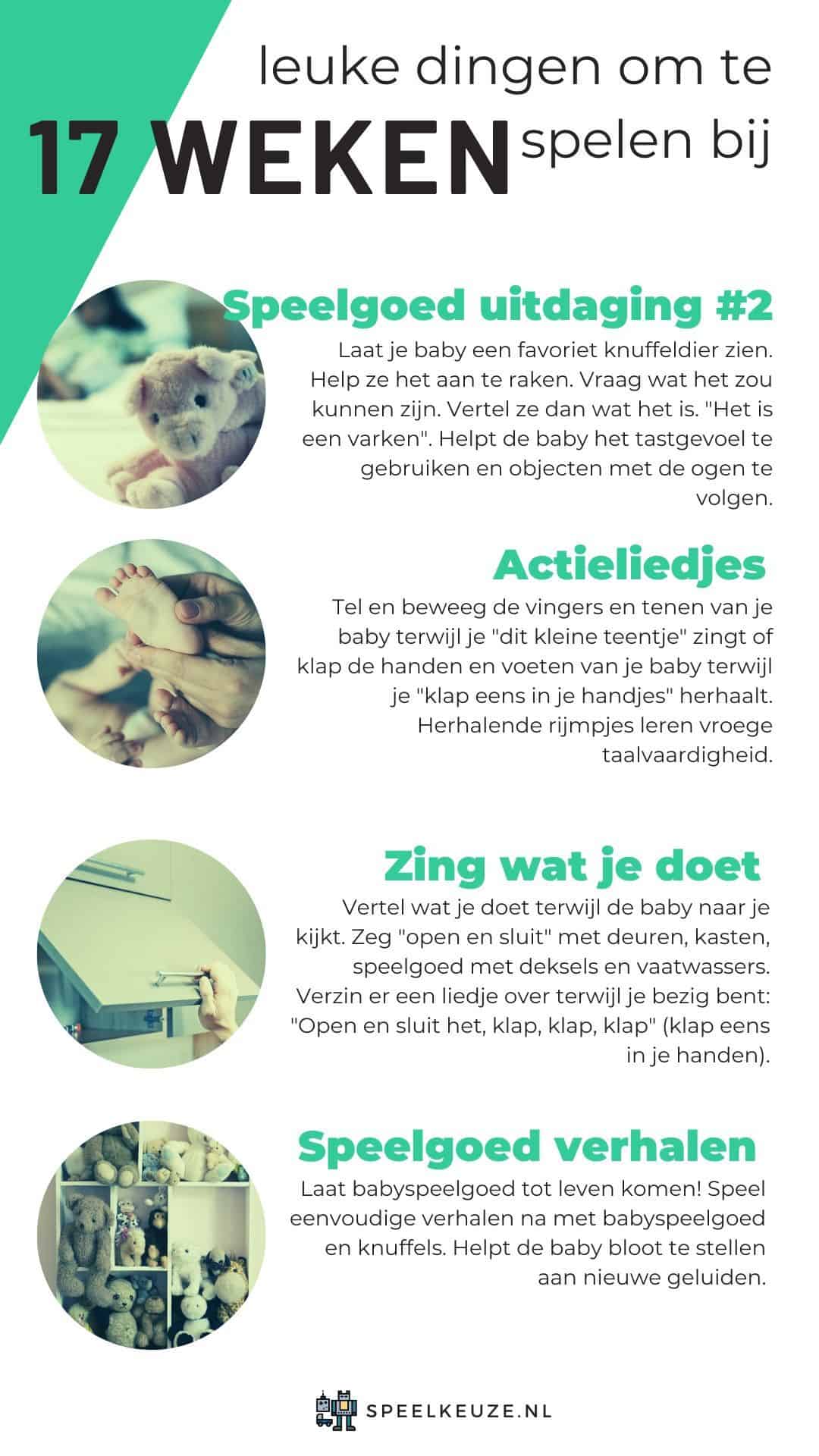
Toy Challenge # 2
Show your baby a favorite stuffed animal.
Help them touch it. Ask what it could be. Then tell them what it is. "It's a pig"
Helps the baby use the sense of touch and track objects with the eyes.
Action songs
Count and move your baby's fingers and toes as you sing “this little toe” or clap your baby's hands and feet while repeating “clap your hands”.
Repeating rhymes teach early language skills.
Helps babies build awareness of their body and practice communication skills.
Sing what you do
Share what you are doing while the baby is looking at you. Say "open and close" with doors, cabinets, toys with lids and dishwashers.
Make up a song about it while you're at it: "Open and close it, clap, clap, clap" (clap your hands once).
It helps the baby learn that words are used to describe actions and objects.
Toy stories
Let baby toys (like this one) come to life! Play out simple stories with baby toys and cuddly toys.
Helps expose the baby to new sounds.
Play with your 18 week old baby
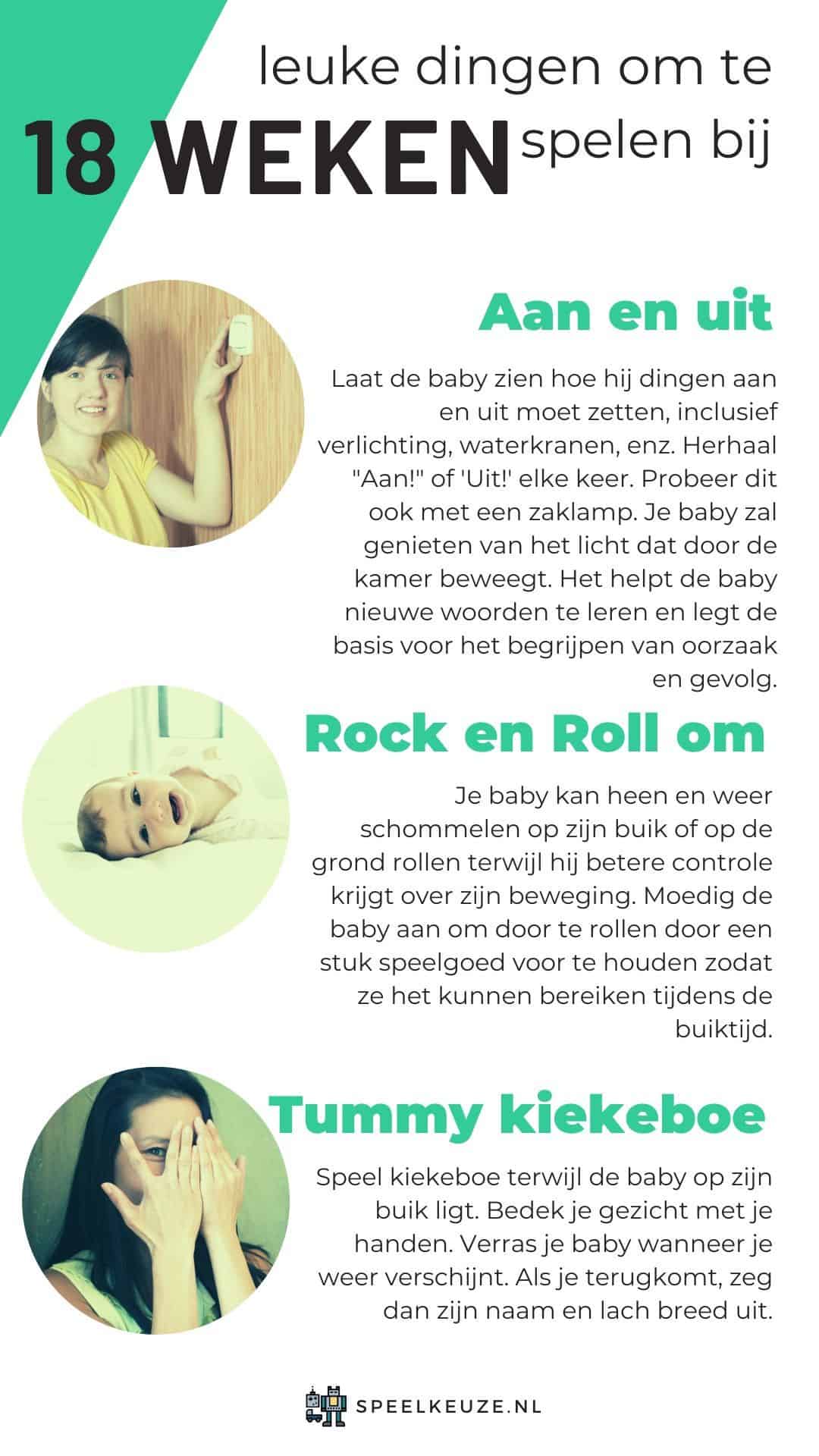
On and off
Show the baby how to turn things on and off, including lights, water taps, etc.
Repeat "On!" or 'Off!' every time. Try this with a flashlight too. Your baby will love the light moving around the room.
It helps the baby learn new words and lays the foundation for understanding cause and effect.
Rock and Roll over
Your baby can rock back and forth on his stomach or roll on the floor while gaining better control over his movement.
Encourage the baby to continue rolling by holding out a toy for them to reach during tummy time.
Helps baby build muscle to roll from stomach to back.
Tummy Time peek-a-boo
Play peek-a-boo while baby is lying on his stomach.
Cover your face with your hands. Surprise your baby when you reappear. When you return, say his name and have a big laugh.
Helps baby get playful and improves core strength during Tummy Time.
Play with your 19 week old baby
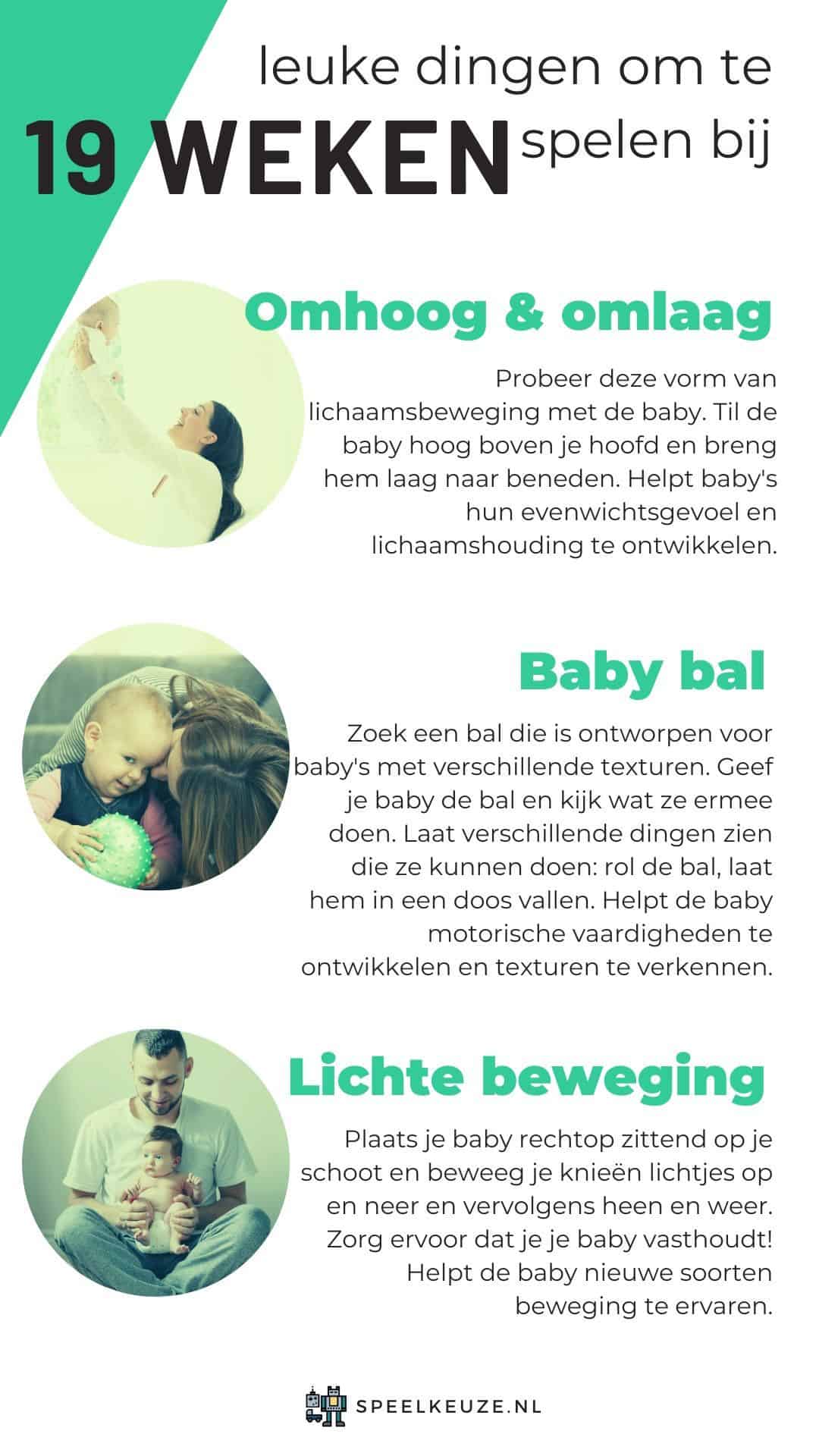
Lift up and down
Try this form of exercise with the baby.
Lift the baby high above your head and lower it low.
Helps babies develop their sense of balance and posture.
Baby ball
Find a ball designed for babies with different textures. Give your baby the ball and see what they do with it.
Show different things they can do: roll the ball, drop it into a box.
Helps the baby develop motor skills and explore textures.
Light movements
Place your baby in an upright position on your lap and slightly move your knees up and down and then back and forth.
Make sure to hold your baby!
Helps the baby experience new types of movement.
Play with your 20 week old baby
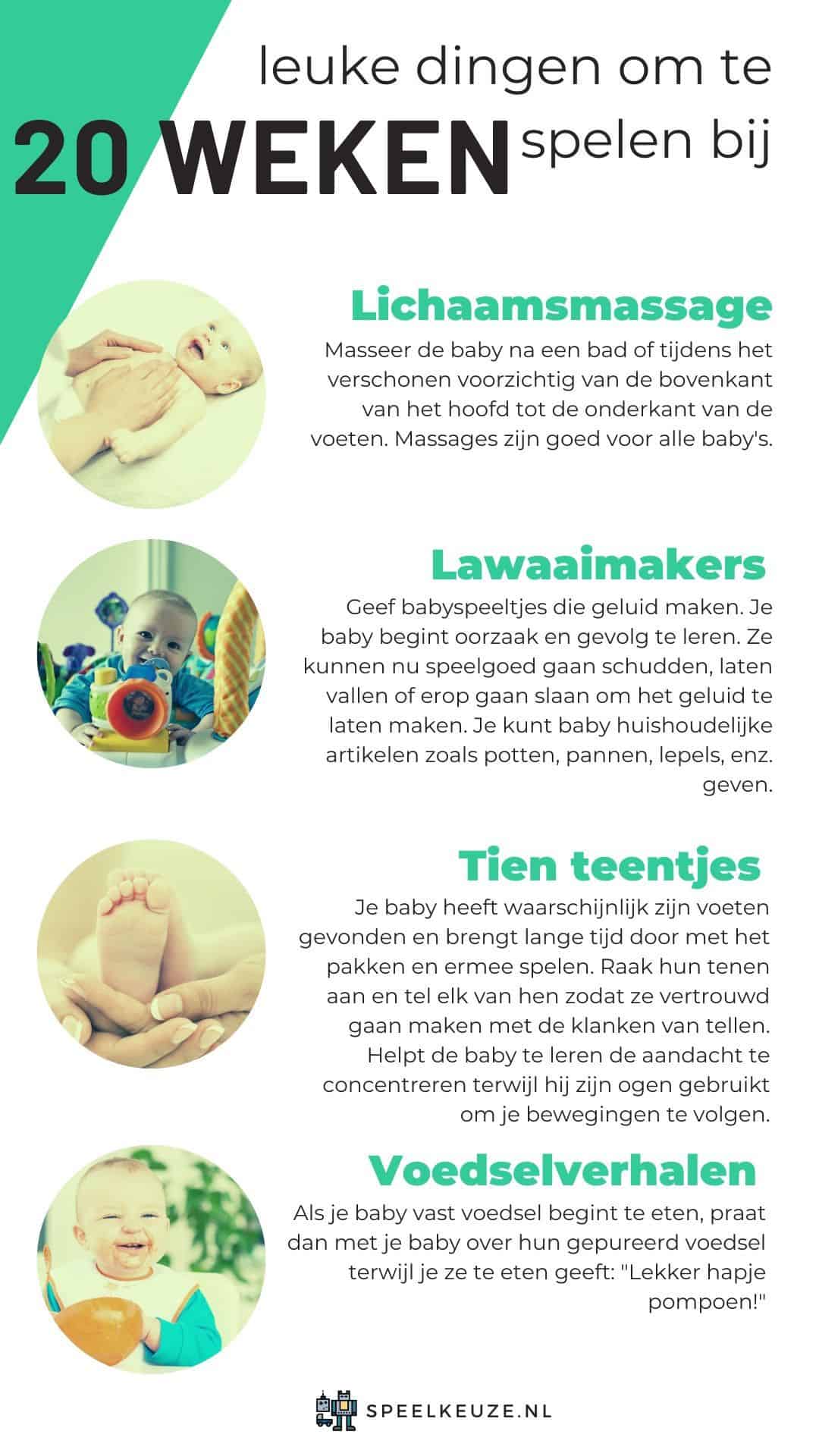
Body massage
After a bath or while changing, gently massage the baby from the top of the head to the bottom of the feet.
Massages are good for all babies and Parentsvannow says it has been around for a long time and comes from India.
Helps the baby connect with you, use their sense of touch and use their sight to focus on you.
Noise Makers
Give baby toys that make noise.
Your baby begins to learn cause and effect. They can now shake, drop, or hit a toy to make it sound.
You can give baby household items such as pots, pans, spoons, etc.
Let the baby learn to play with toys in different ways to see how they move and sound.
Ten cloves
Your baby has probably found his feet and spends a long time grabbing and playing with it.
Touch their toes and count each of them so that they become familiar with the sounds of counting.
Helps the baby learn to focus attention while using his eyes to track your movements.
Food stories
When your baby starts to eat solid foods, talk to your baby about their pureed foods while feeding them:
“Nice pumpkin snack!”
It helps babies develop language skills.
Play with your 21 week old baby
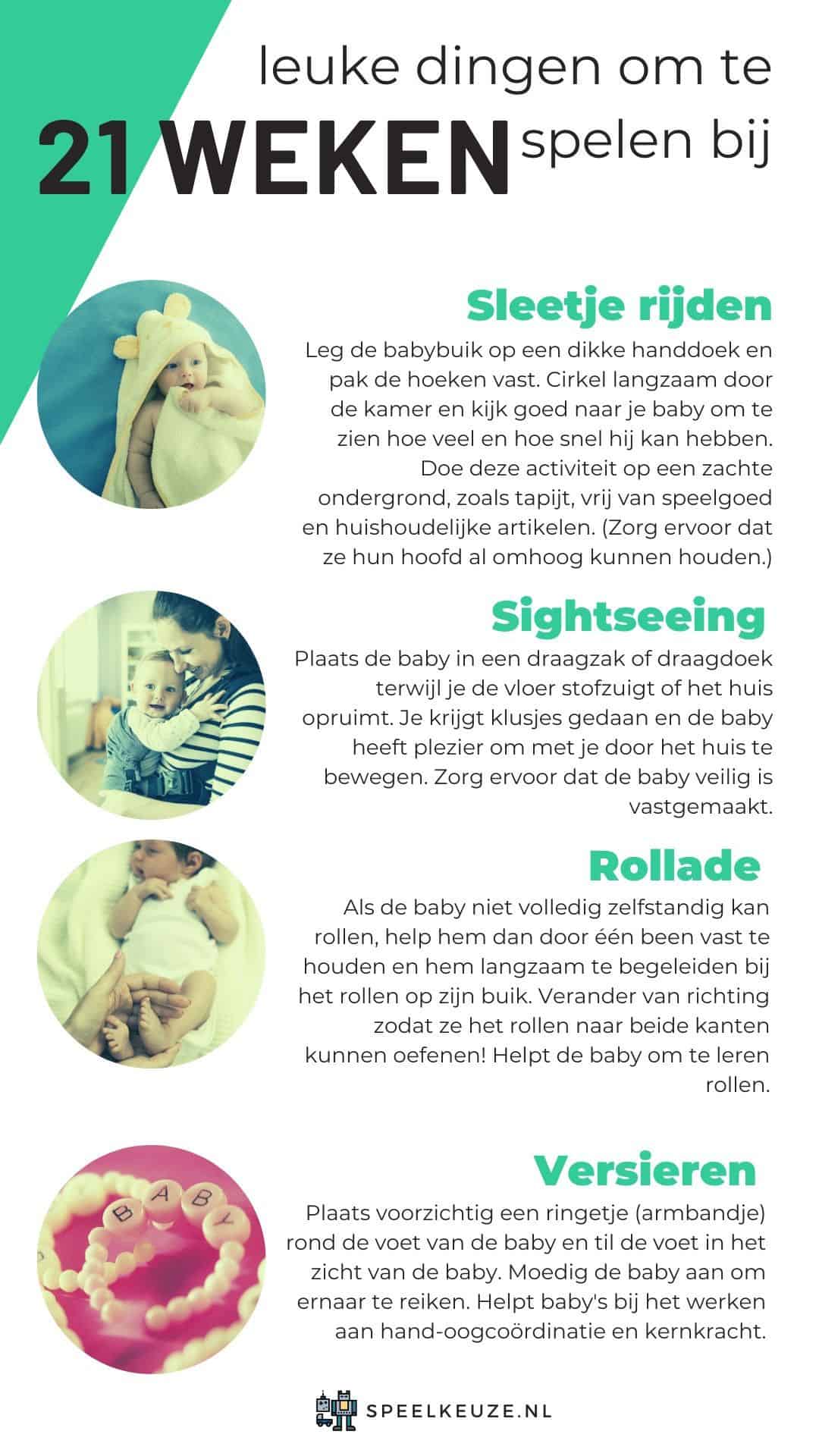
Sledging
Place the baby belly on a thick towel and grab the corners. Slowly circle the room and look closely at your baby to see how much and how fast he can take.
Do this activity on a soft surface, such as a carpet, free from toys and household items. (Make sure they can already hold their heads up.)
Helps baby improve neck and head control and strengthens back, shoulder muscles and core.
Sightseeing
Place the baby in a baby carrier or sling while you vacuum the floor or clean up the house.
You get chores done and the baby has fun moving around the house with you. Make sure the baby safe and is attached.
Helps the baby to develop the sense of balance and posture and gives the baby new opportunities to see his surroundings.
Roulade
If the baby cannot roll completely on his own, help him by holding one leg and slowly guiding him through the roll on his stomach.
Change direction so they can practice rolling in both directions!
Helps the baby learn to roll.
To decorate
Carefully place a ring (bracelet) around the baby's foot and lift the foot in sight of the baby. Encourage the baby to reach for it.
Helps babies work on hand-eye coordination and core strength.
Playing with your 22 week (5 month) baby
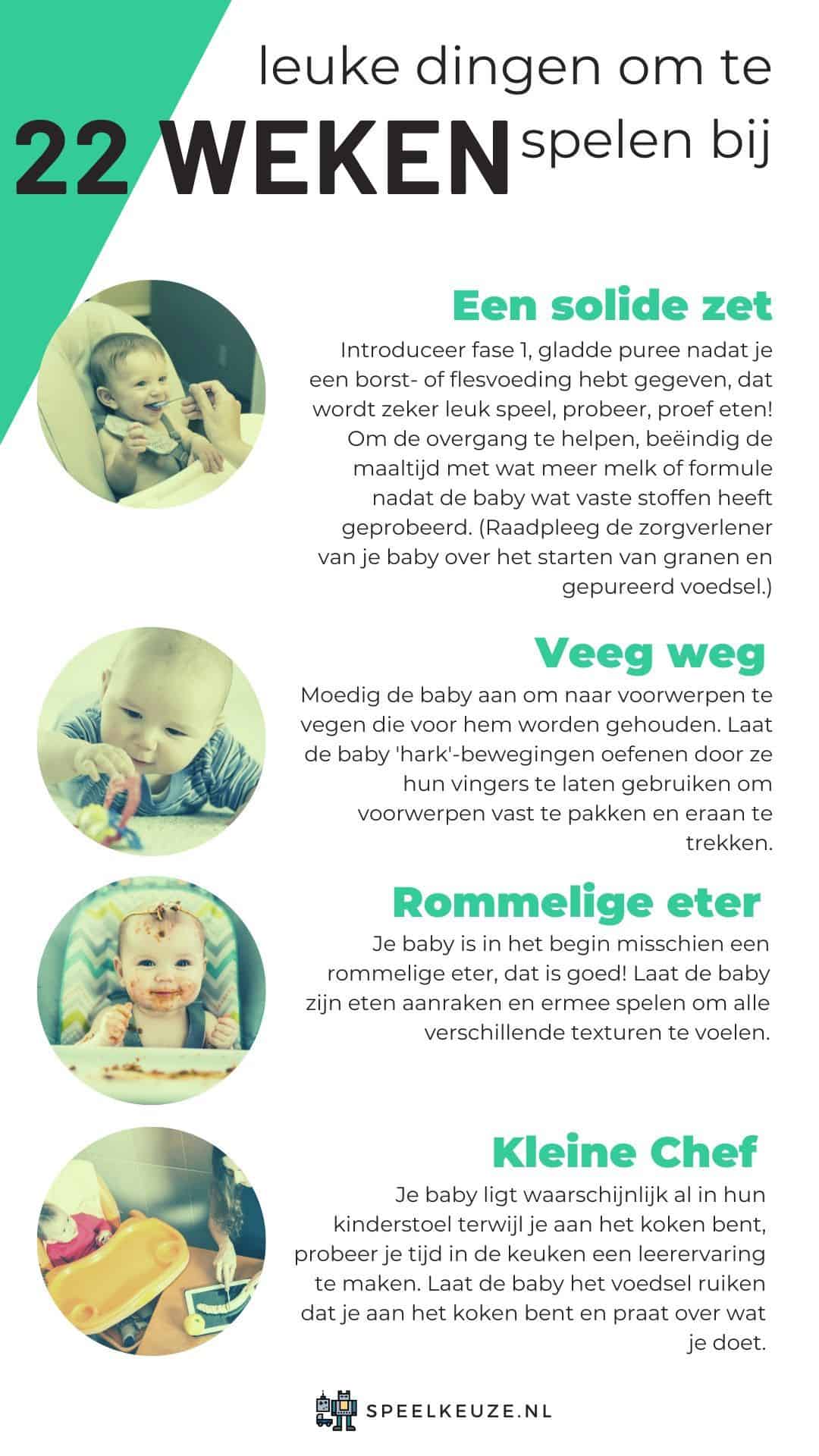
A solid move
Introduce phase 1, smooth puree after breastfeeding or bottle feeding, that's sure to be fun play, try, taste food!
To aid the transition, end the meal with some more milk or formula after the baby has tried some solids. (Consult your baby's health care provider about starting grains and pureed foods.)
Helps the baby develop feeding skills.
Wipe away
Encourage the baby to swipe at objects held in front of him.
Have the baby practice 'rake' movements by having them use their fingers to grab and pull objects.
Hold the item in different positions to encourage it to reach from side to side.
Helps the baby develop motor skills.
Messy eater
Your baby may be a messy eater at first, that's okay! Have the baby touch and play with his food to feel all the different textures.
Helps the baby learn about different food textures.
Little Chef
Your baby is probably already in their high chair while you are cooking, try to make your time in the kitchen a learning experience.
Let the baby smell the food you are cooking and talk about what you are doing.
Helps expose the baby to new sensory experiences.
Play with your 23 week old baby
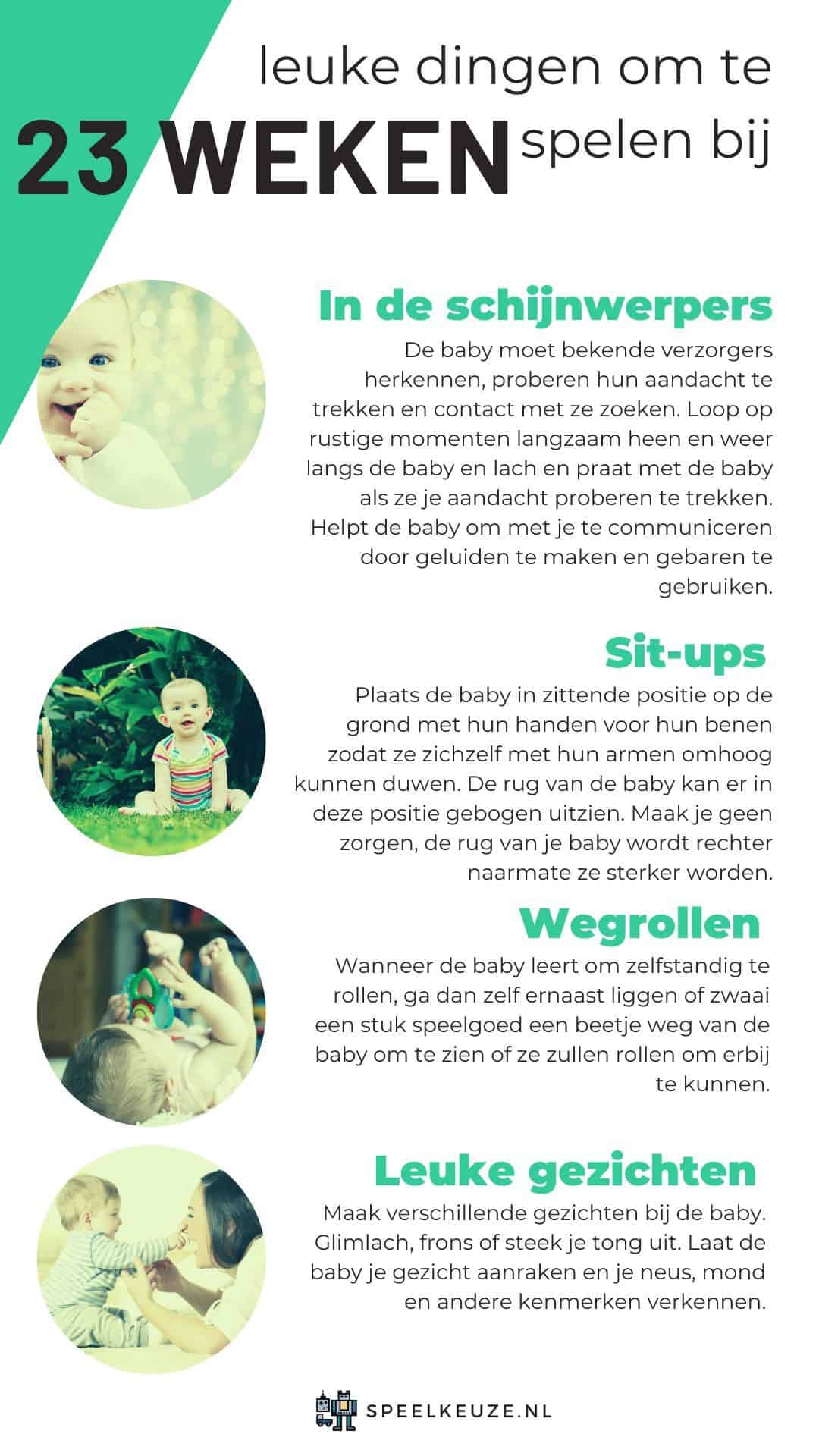
In the spotlight
The baby needs to recognize known caregivers, try to get their attention and contact them.
During quiet times, slowly walk back and forth past the baby and smile and talk to the baby when they try to get your attention.
Helps the baby communicate with you by making sounds and using gestures.
sit ups
Place the baby in a sitting position on the floor with their hands in front of their legs so that they can push themselves up with their arms.
The baby's back may look arched in this position. Don't worry, your baby's back will get straighter as they get stronger.
Helps the baby to learn to sit.
Roll away
When the baby learns to roll on their own, lie down next to them or swing a toy a bit away from the baby to see if they will roll to reach it.
Helps baby develop core muscle strength.
Nice faces
Make different faces on the baby.
- Smile,
- frons
- or stick your tongue out.
Let the baby touch your face and explore your nose, mouth and other features.
Helps the baby learn to focus his eyes on objects.
Play with your 24 week old baby
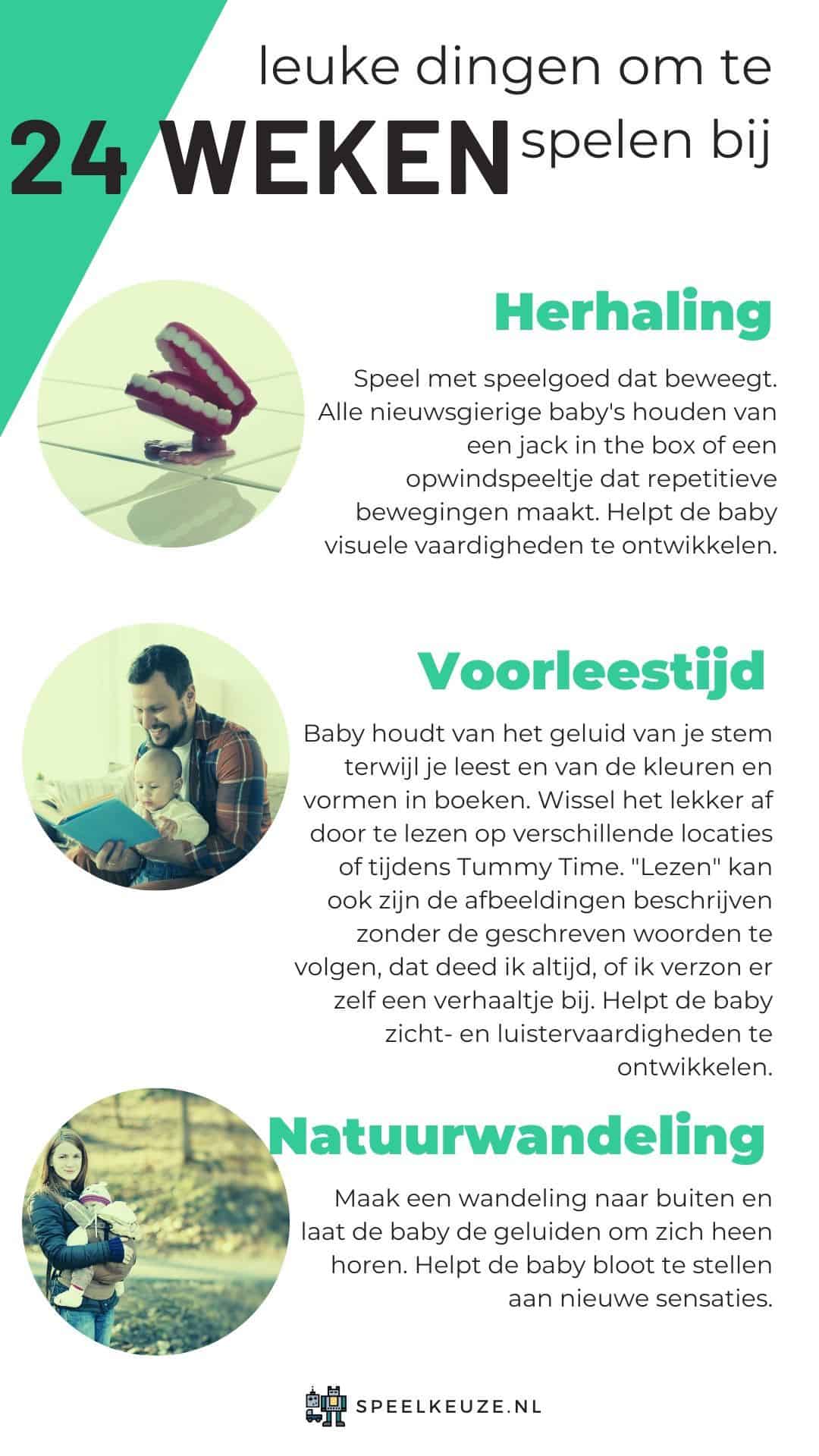
Repeat
Play with toys that move. All curious babies love a jacket in the box or a wind-up toy that makes repetitive movements.
Helps the baby develop visual skills.
Reading time
Baby loves the sound of your voice as you read and the colors and shapes in books. Alternate between reading at different locations or during Tummy Time.
“Reading” could also be describing the pictures without following the written words, I always did, or I made up a story myself.
Helps the baby develop sight and listening skills.
Nature walk
Take a walk outside and let the baby hear the sounds around him.
Helps expose the baby to new sensations.
Play with your 25 week old baby
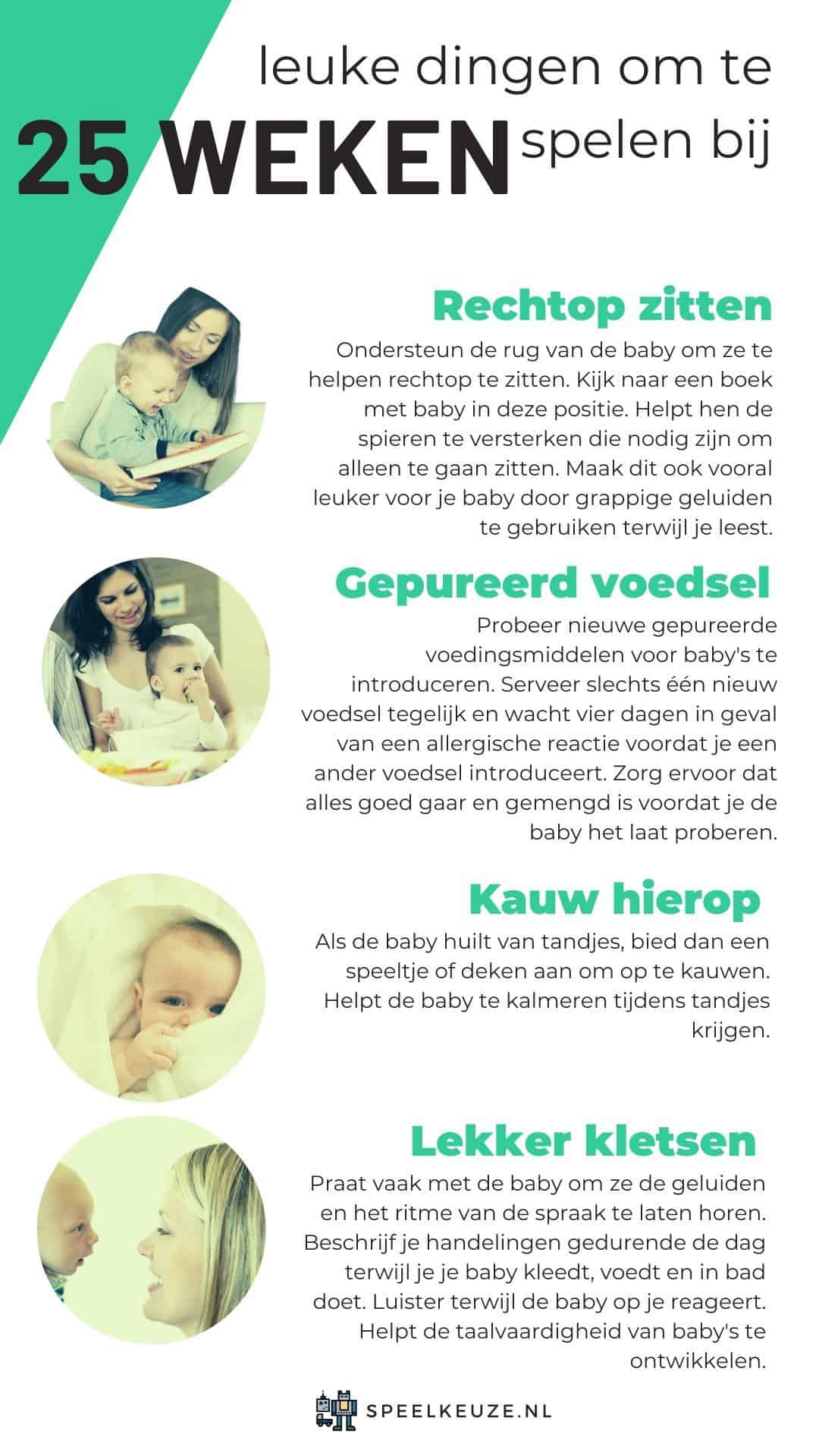
Sit up straight
Support the baby's back to help them sit up. Look at a book with baby in this position.
Helps them strengthen the muscles needed to sit on their own. Also make this more fun for your baby by using funny sounds while you read.
Helps the baby develop strength.
Pureed foods
Try introducing new pureed foods for babies.
Only serve one new food at a time and in case of an allergic reaction, wait four days before introducing another food.
Make sure everything is cooked and mixed well before you let the baby try it.
Helps the baby develop feeding and swallowing skills.
Chew on this
If the baby is crying from teething, offer a toy or blanket to chew.
Helps to calm the baby during teething.
Nice chat
Talk to the baby often to let them hear the sounds and rhythm of the speech.
Describe your actions during the day as you dress, feed and bathe your baby. Listen as the baby responds to you.
Helps develop babies' language skills.
Playing with your 26 week (6 month) baby
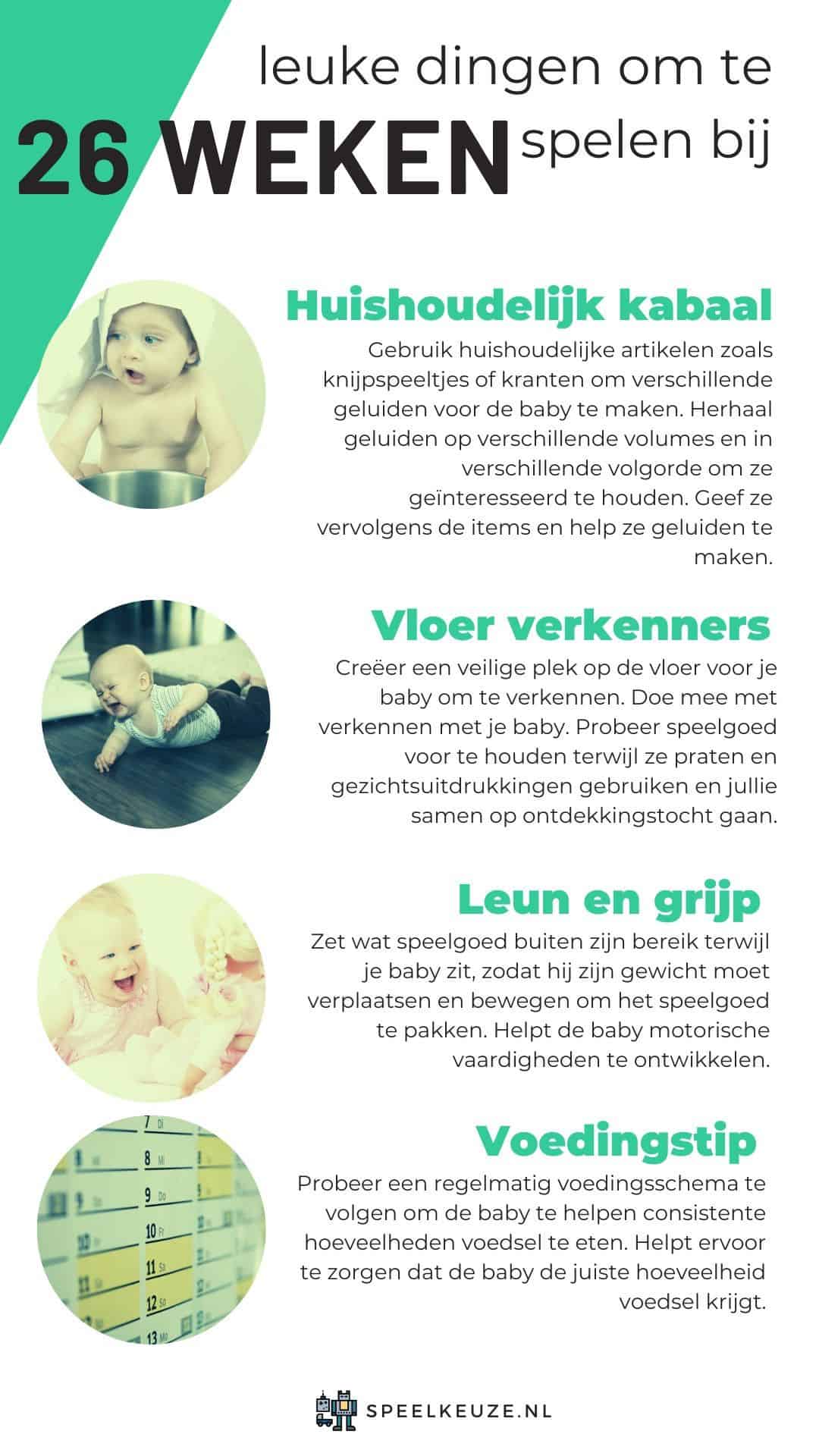
Household noise
Use household items such as squeeze toys or newspapers to make different sounds for the baby.
Repeat sounds at different volumes and in different order to keep them interested. Then give them the items and help them make sounds.
Helps the baby develop motor and listening skills.
Floor scouts
Create a safe place on the floor for your baby to explore. Join in exploring with your baby.
Try to hold up toys while they talk and use facial expressions and explore together.
Helps baby improve neck and head control, strengthen back, shoulder muscles and core.
Lean and grab
Put some toys out of reach while your baby is sitting so that he has to shift and move his weight to get the toy.
Helps the baby develop motor skills.
Feeding tip
Try to follow a regular feeding schedule to help the baby eat consistent amounts of food.
Helps ensure that the baby is getting the right amount of food.
Key milestones of 7-9 months
Motor milestones
- Sit without support
- Sit and reach for toys without falling
- Moves from stomach to sitting and back
- Starts to move with alternating leg and arm movements, eg crawling
- Lifts the head and pushes from the stomach with the elbows
- Turns the head to follow objects while seated
- Has more control when rolling and sitting
- Picks up small objects with thumbs and fingers
- Imitates others in simple play
Sensory milestones
- Enjoy a variety of moves - bounce up and down, rock back and forth
- Examines and views an object with both hands and mouth
- Turns over several pages of a thick (cardboard) book at the same time
- Experiments with the amount of force required to pick up different objects
- Focuses on objects near and far
- Examines shapes, sizes and textures of toys and surroundings
- Observes the environment from different positions - lying on the back or stomach, sitting, crawling and standing with assistance
Communication milestones
- Uses a wider variety of sounds and syllable combinations when babbling
- Looks for known objects and people when they are mentioned
- Recognizes sound by their own name
- Participates in two-way communication
- Follows some routine commands in conjunction with gestures
- Shows recognition of frequently used words
- Simple gestures, eg shaking head for “no”
- Imitates sounds
Nutritional milestones
- In a high chair, hold the bottle and drink from it
- Starts eating thicker pureed foods
- Loves chew toys that can massage sore and swollen gums while teething
- Stays full longer after eating
- Starts looking for and reaching for objects, such as food that is nearby
- Shows a strong response to new smells and flavors
Play with your 27 week old baby
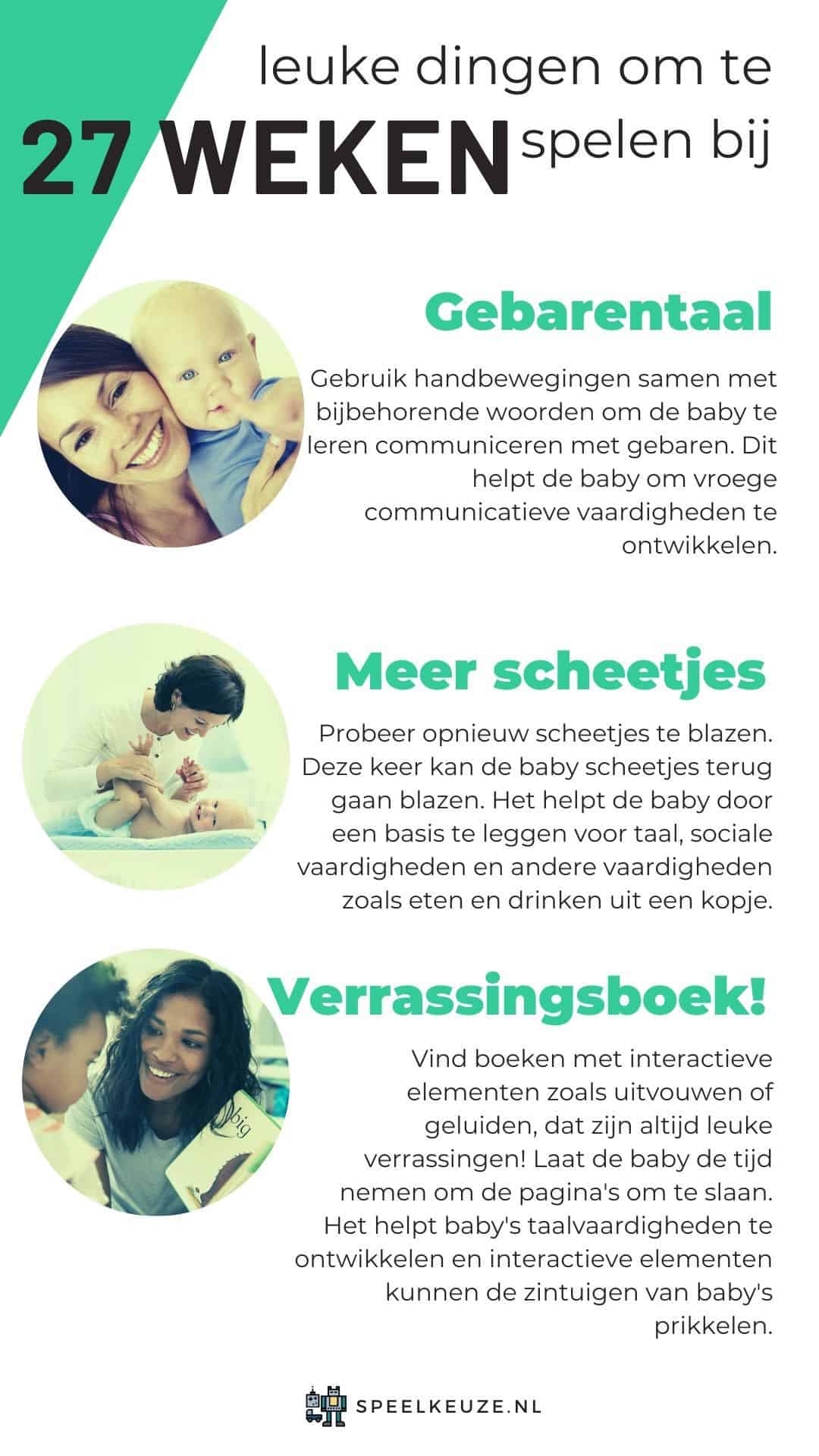
Sign language
Use hand movements along with associated words to teach the baby to communicate with gestures.
This helps the baby to develop early communication skills.
Blow more farts
Try blowing farts again. This time, the baby can start blowing farts back.
It helps the baby by laying a foundation for language, social skills and other skills such as eating and drinking from a cup.
Surprise book!
Find books with interactive elements such as folds or sounds, these are always nice surprises!
Let the baby take time to turn the pages.
It helps babies develop language skills and interactive elements can stimulate babies' senses.
Play with your 28 week old baby
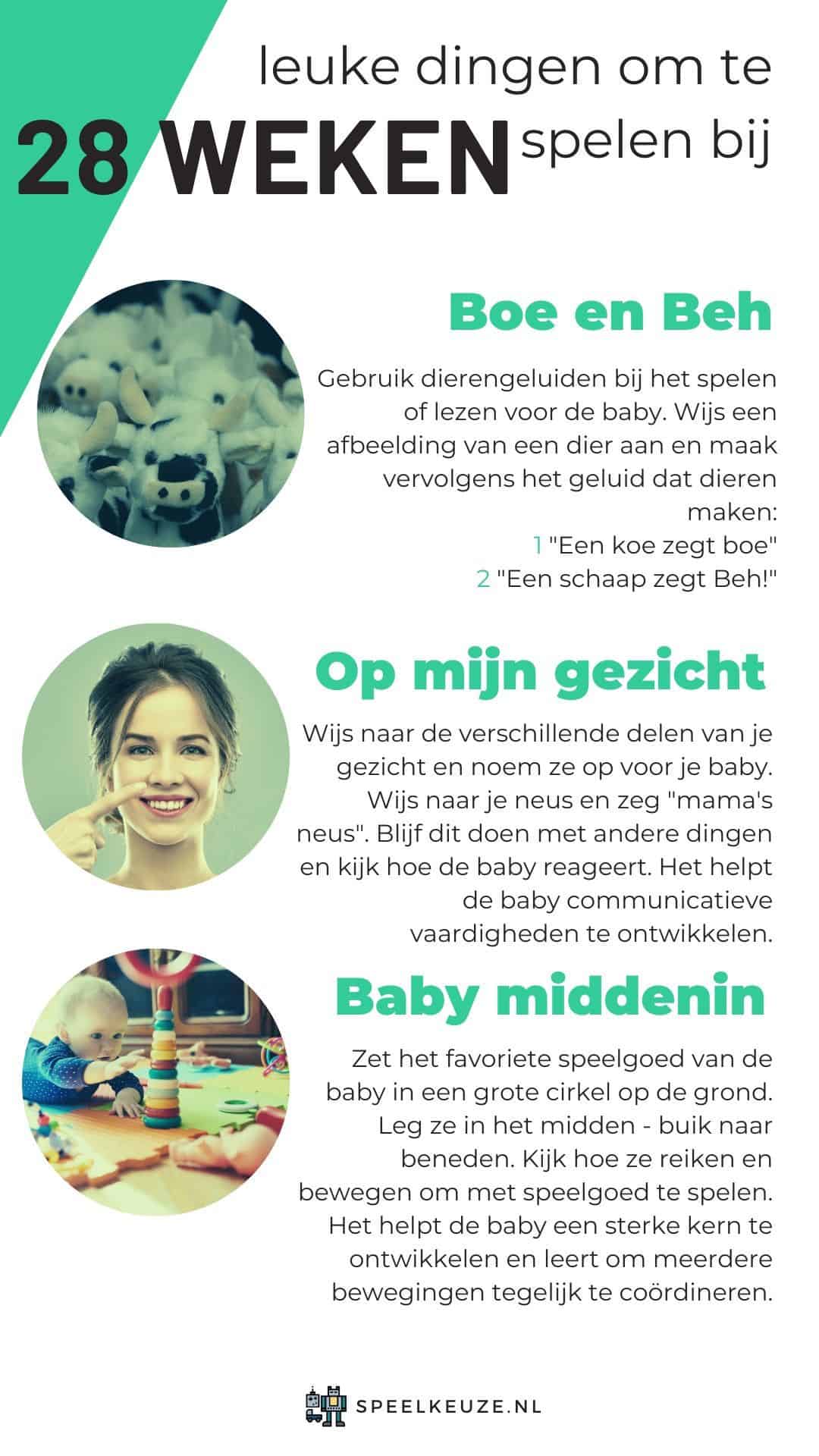
Boe and Beh
Use animal sounds when playing or reading to the baby.
Point to a picture of an animal, then make the sounds that animals make:
- "A cow says boo"
- "A sheep says Beh!"
Helps the baby learn to listen to different types of sounds.
What's on my face?
Point to the different parts of your face and name them for your baby.
Point to your nose and say "mom's nose". Keep doing this with other things and see how the baby reacts.
It helps the baby develop communication skills.
Baby in the middle
Place the baby's favorite toys in a large circle on the floor. Place them in the middle - belly down.
Watch them reach and move to play with toys.
It helps the baby develop a strong core and learns to coordinate multiple movements at once.
Play with your 29 week old baby
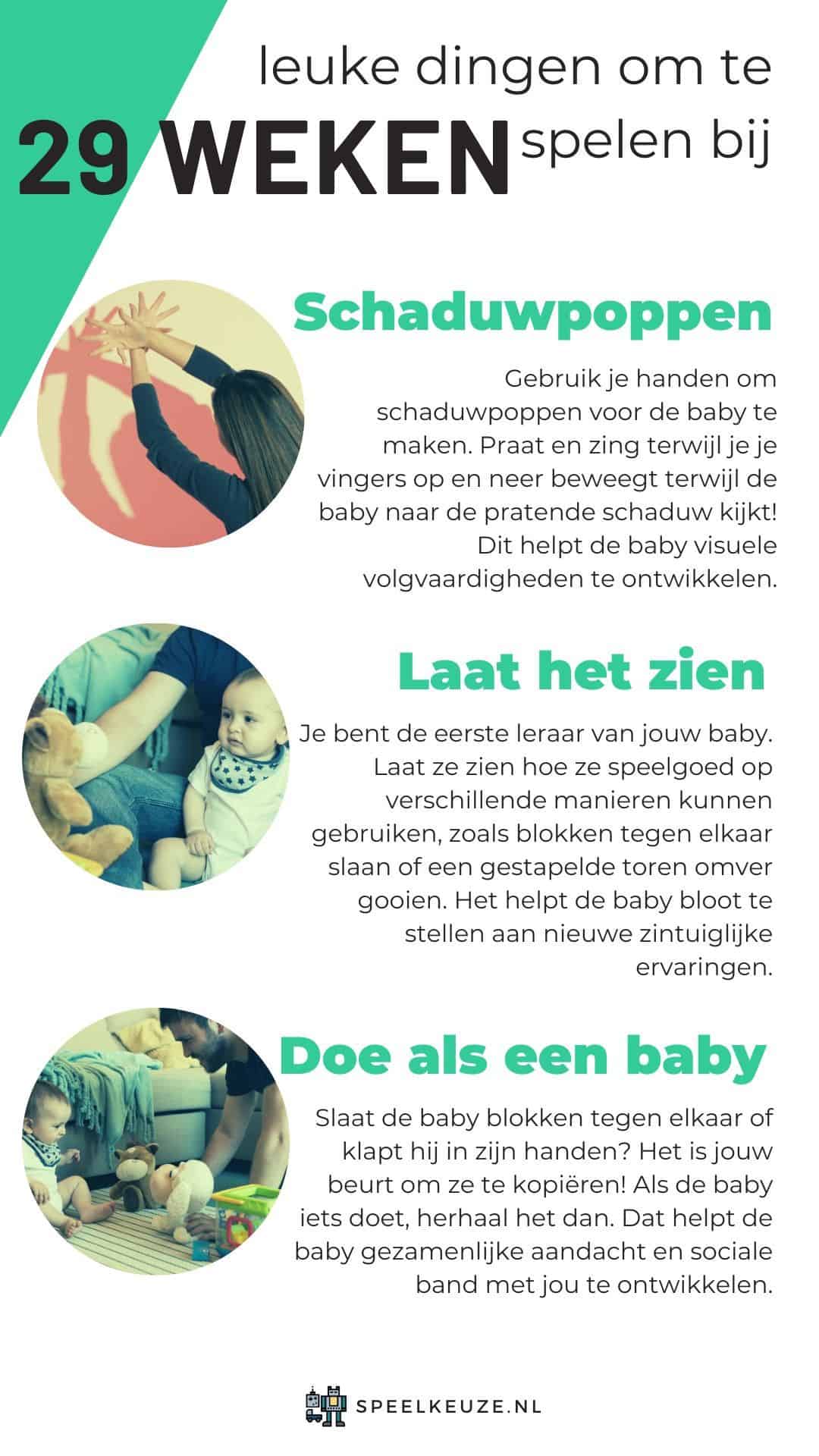
Shadow puppets
Use your hands to make shadow puppets for the baby.
Talk and sing while moving your fingers up and down while the baby looks at the talking shadow!
This helps the baby develop visual tracking skills.
Show it
You are your baby's first teacher.
Show them how to use toys in different ways, such as hitting blocks together or knocking over a stacked tower.
It helps expose the baby to new sensory experiences.
Act like a baby
Is the baby hitting blocks together or clapping his hands? It's your turn to copy them!
If the baby does something, repeat it.
That helps the baby develop joint attention and social connection with you.
Play with your 30 week old baby
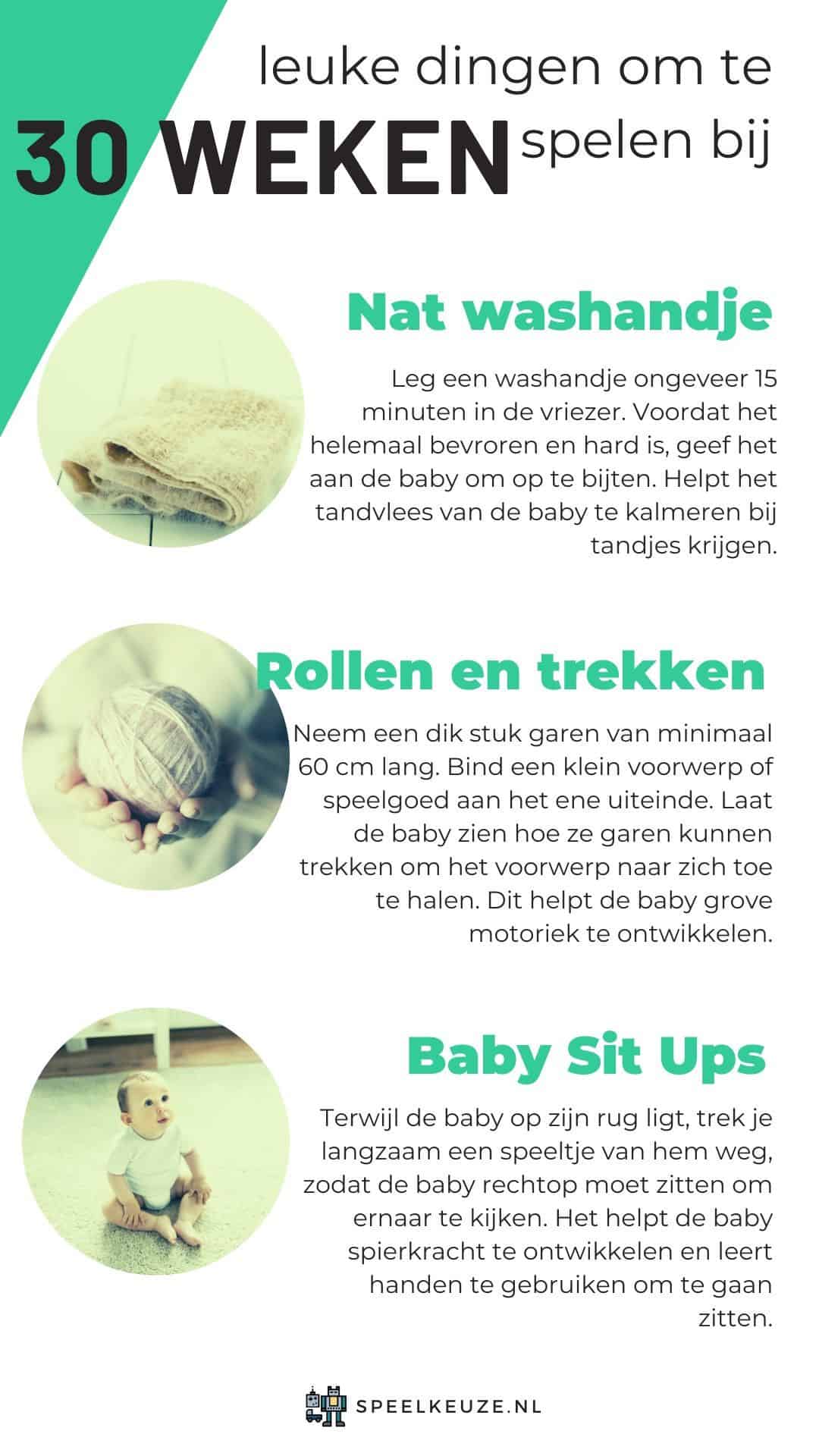
Wet washcloth
Place a washcloth in the freezer for about 15 minutes. Before it is completely frozen and hard, give it to the baby to bite on.
Helps soothe the baby's gums when teething.
Roll and pull
Take a thick piece of yarn that is at least 60 cm long. Tie a small object or toy to one end.
Show the baby how to draw yarn to bring the object to them.
This helps the baby develop gross motor skills.
Baby Sit Ups
While the baby is on his back, slowly pull a toy away from him so that the baby has to sit up to look at it.
It helps the baby develop muscle strength and learns to use hands to sit.
Playing with your 31 week (7 month) baby
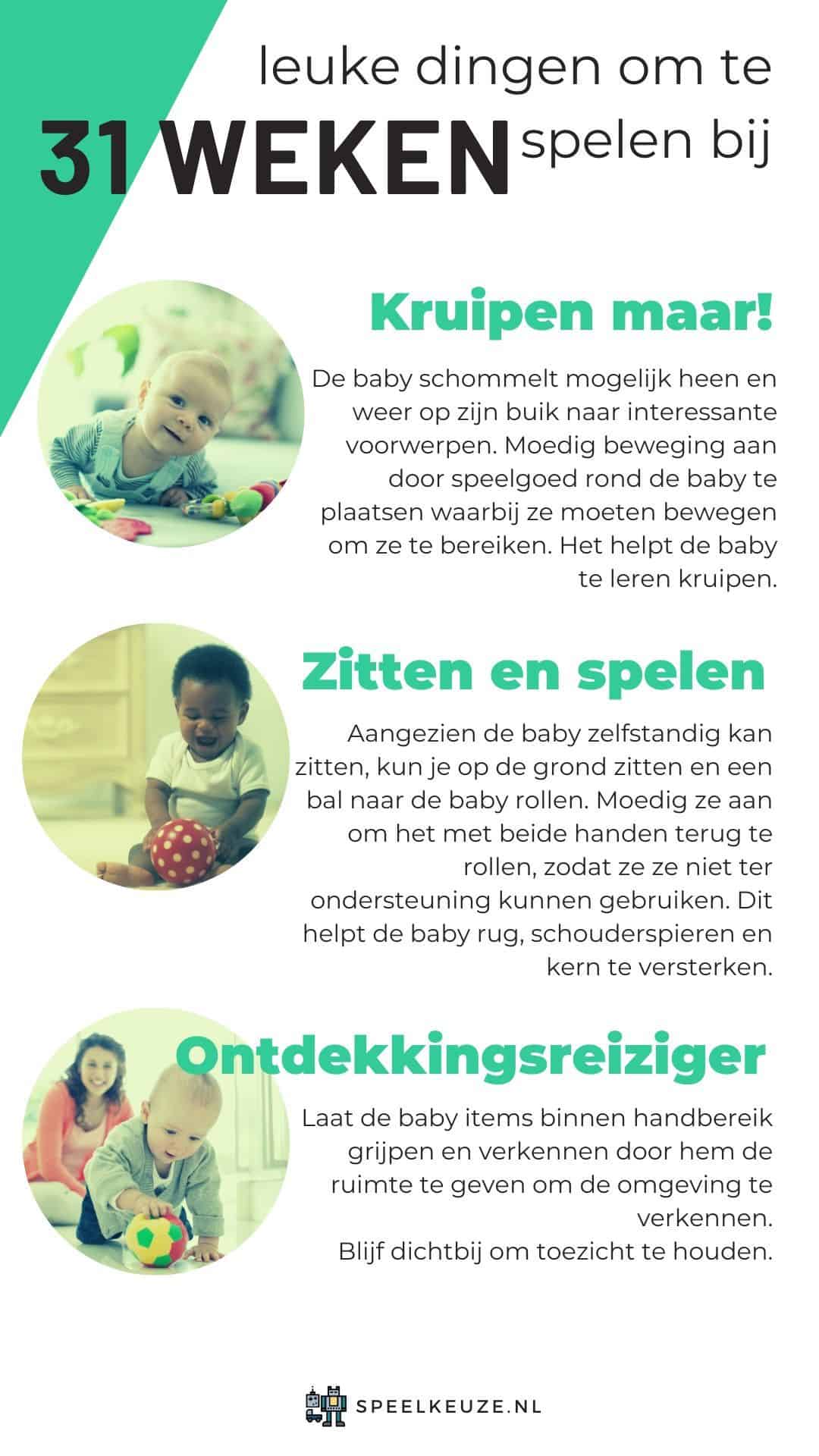
To crawl but!
The baby may be rocking back and forth on its stomach for interesting objects.
Encourage movement by placing toys around the baby that require movement to reach them.
It helps the baby learn to crawl.
Sit to play
Since the baby can sit independently, you can sit on the floor and roll a ball towards the baby.
Encourage them to roll it back with both hands so they can't use it for support.
This helps the baby to strengthen the back, shoulder muscles and core.
Explorer
Let the baby grab and explore items within reach by giving him space to explore the environment.
Stay close to supervise.
Helps the baby gain new tactile experiences.
Play with your 32 week old baby
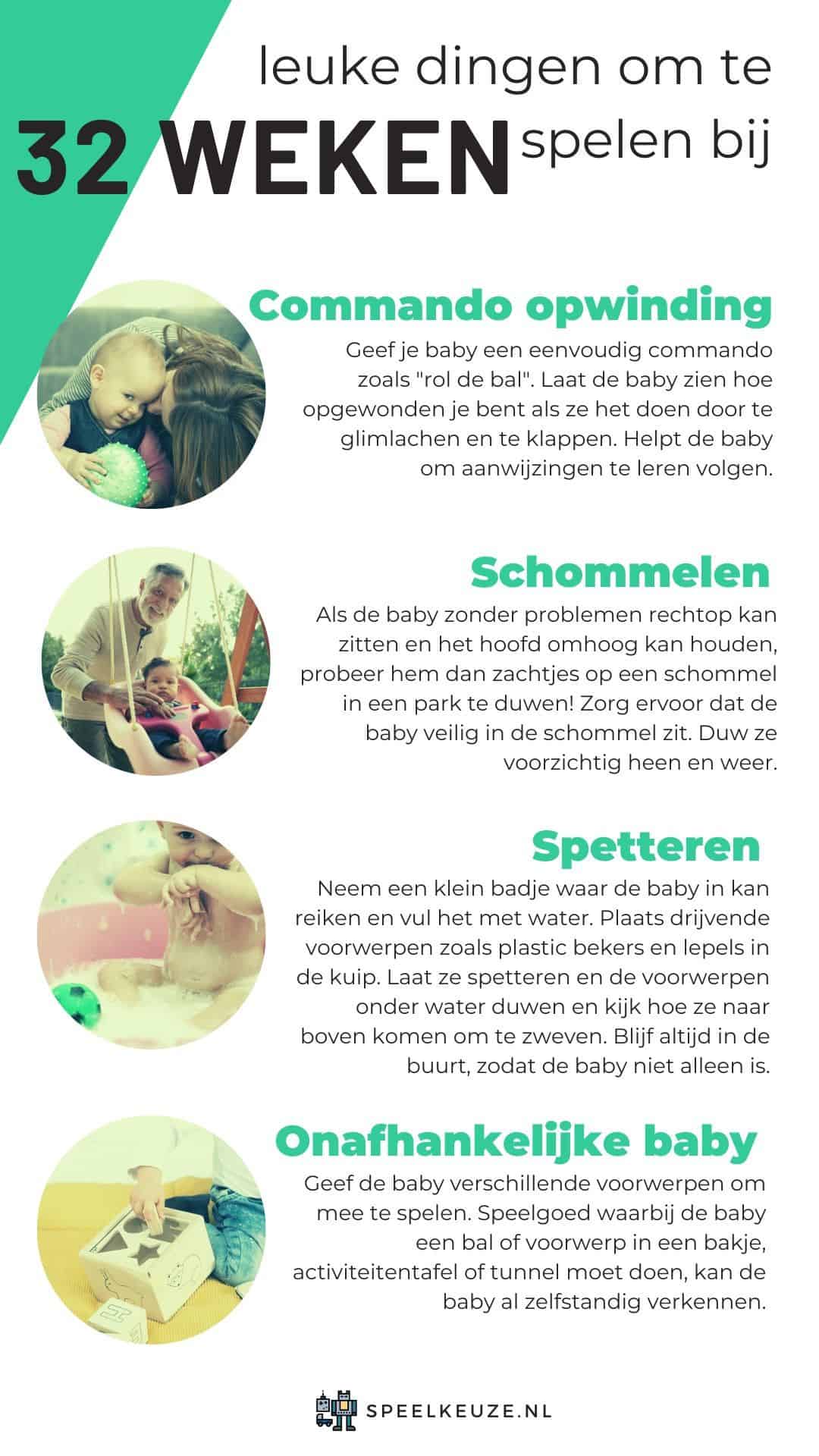
Command excitement
Give your baby a simple command such as “roll the ball”. Show the baby how excited you are when they do it by smiling and clapping.
Helps the baby learn to follow directions.
To swing
If the baby can sit up without any problems and keep its head up, try pushing it gently on a swing in a park!
Make sure the baby safe and sitting in the swing. Gently push them back and forth.
Helps the baby develop gross motor skills.
Splashing
Take a small bath for the baby to reach and fill it with water. Place floating objects such as plastic cups and spoons in the tub.
Let them splash and push the objects underwater and watch them rise to float.
Always stay close so that the baby is not alone.
Helps the baby develop motor and sensory skills.
Independent baby
Give the baby various objects to play with.
Toys where the baby has to put a ball or object in a bowl, activity table or tunnel, the baby can already explore independently.
Helps the baby with motor and sensory skills.
Play with your 33 week old baby
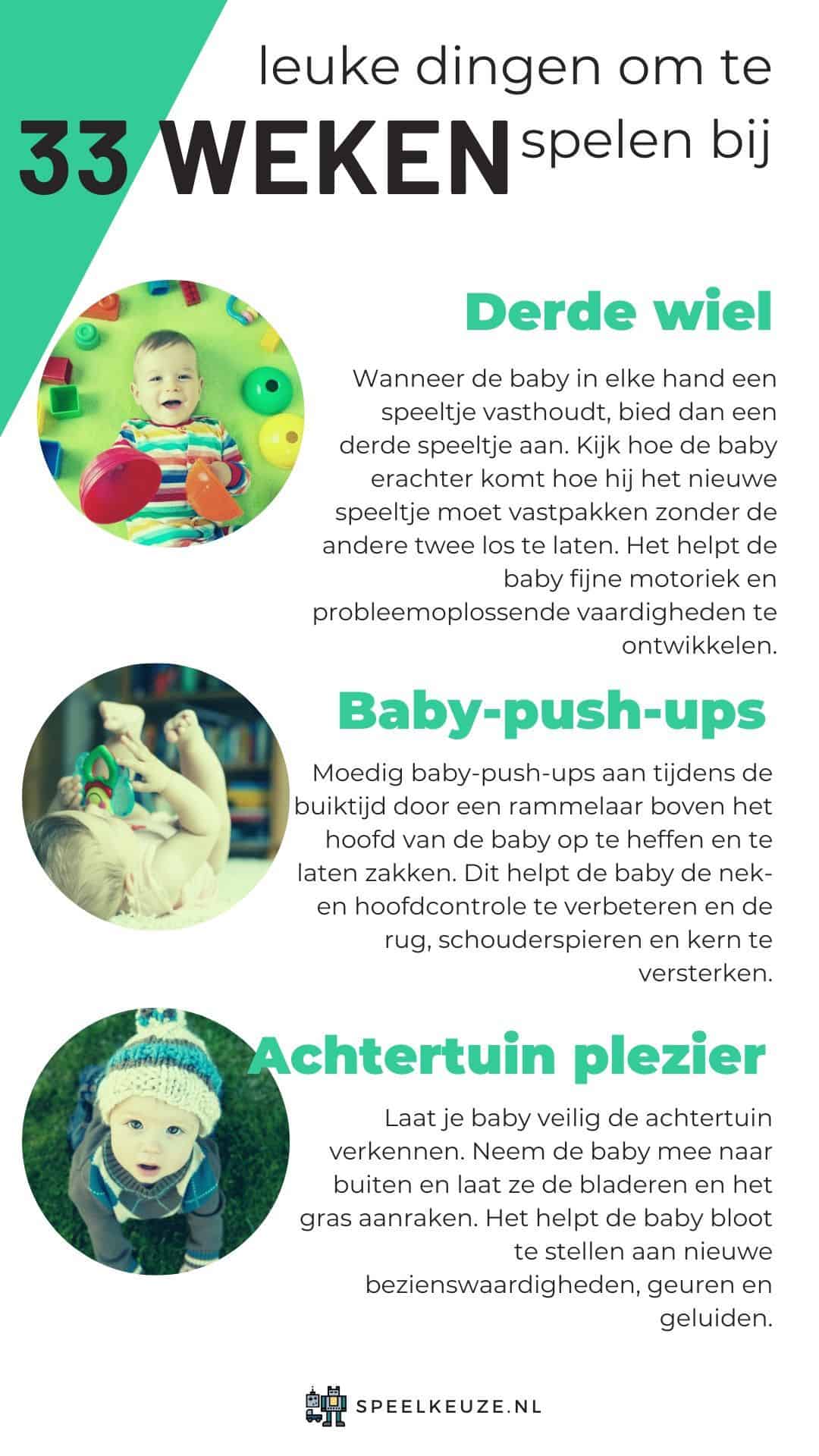
Third wheel
When the baby is holding a toy in each hand, offer a third toy.
Watch the baby figure out how to handle the new toy without letting go of the other two.
It helps the baby develop fine motor and problem solving skills.
Baby push-ups
Encourage baby push-ups during tummy time by raising and lowering a rattle above the baby's head.
This helps the baby improve neck and head control and strengthen the back, shoulder muscles and core.
Backyard fun
Leave your baby safe and exploring the backyard.
Take the baby outside and let them touch the leaves and grass.
It helps expose the baby to new sights, smells and sounds.
Play with your 34 week old baby
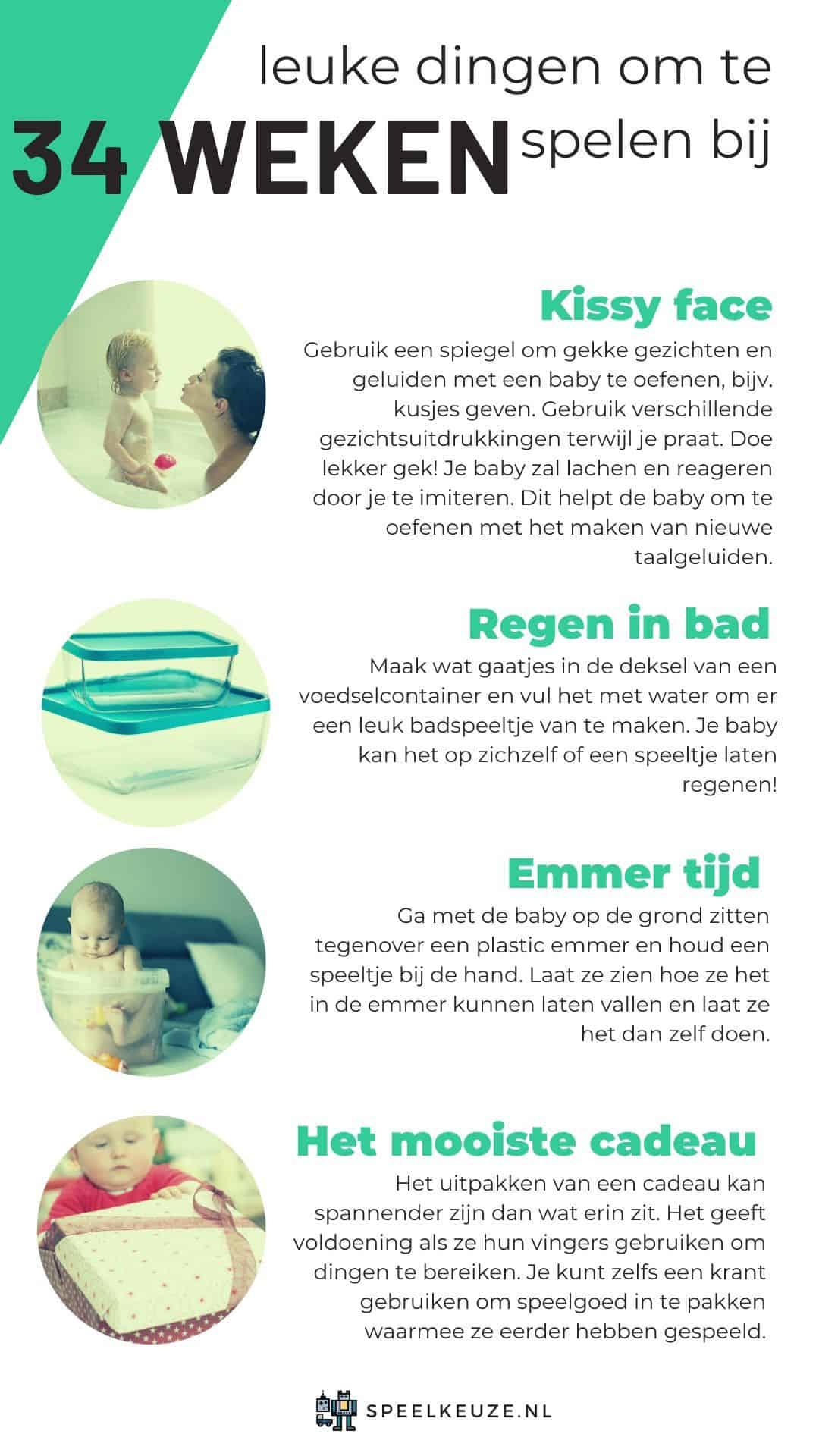
kissy face
Use a mirror to practice funny faces and sounds with a baby, such as giving kisses.
Use different facial expressions while you talk. Be crazy! Your baby will laugh and respond by imitating you.
This will help the baby to practice making new language sounds.
Rain in the bath
Punch some holes in the lid of a food container and fill it with water to make a fun bath toy.
Your baby can let it rain on its own or a toy!
This helps babies develop playing skills while using their senses.
Bucket of time
Sit with the baby on the floor opposite a plastic bucket and have a toy nearby.
Show them how to drop it in the bucket and then let them do it themselves.
It helps the baby build hand-eye coordination while learning how to copy your movements.
The most beautiful gift
Unwrapping a gift can be more exciting than what's inside. It is satisfying when they use their fingers to achieve things.
You can even use newspaper to wrap toys they've played with before.
It helps the baby develop fine motor skills and hand-eye coordination.
Playing with your 35 week (8 month) baby
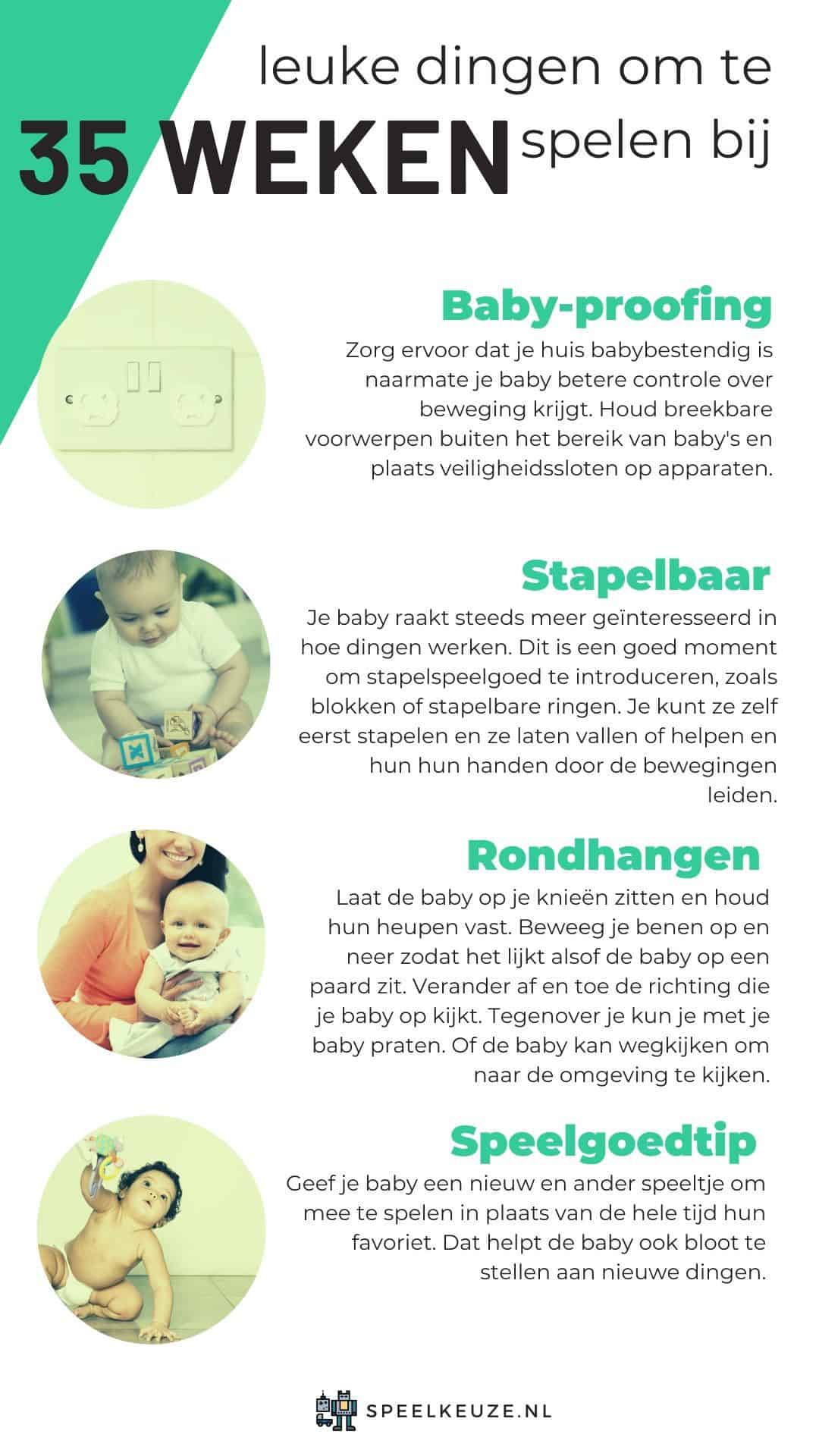
Baby proofing
As your baby gets better control over movement, make sure your home is baby proof.
Keep fragile items out of the reach of babies and put safety locks on devices.
It helps the baby safe and while exploring and becoming independent.
Stackable
Your baby is becoming more and more interested in how things work.
This is a good time to introduce stacking toys, such as blocks or stackable rings.
You can stack them yourself first and drop them or help and guide their hands through the movements.
This helps the baby develop visual and thinking skills.
Hanging around
Have the baby on your knees and hold their hips. Move your legs up and down so that it looks like the baby is on a horse.
From time to time, change the direction your baby is facing. You can talk to your baby in front of you. Or the baby can look away to look at the surroundings.
It helps expose the baby to new types of movement.
Toy tip
Give your baby a new and different toy to play with instead of their favorite all the time.
That also helps expose the baby to new things.
Play with your 36 week old baby
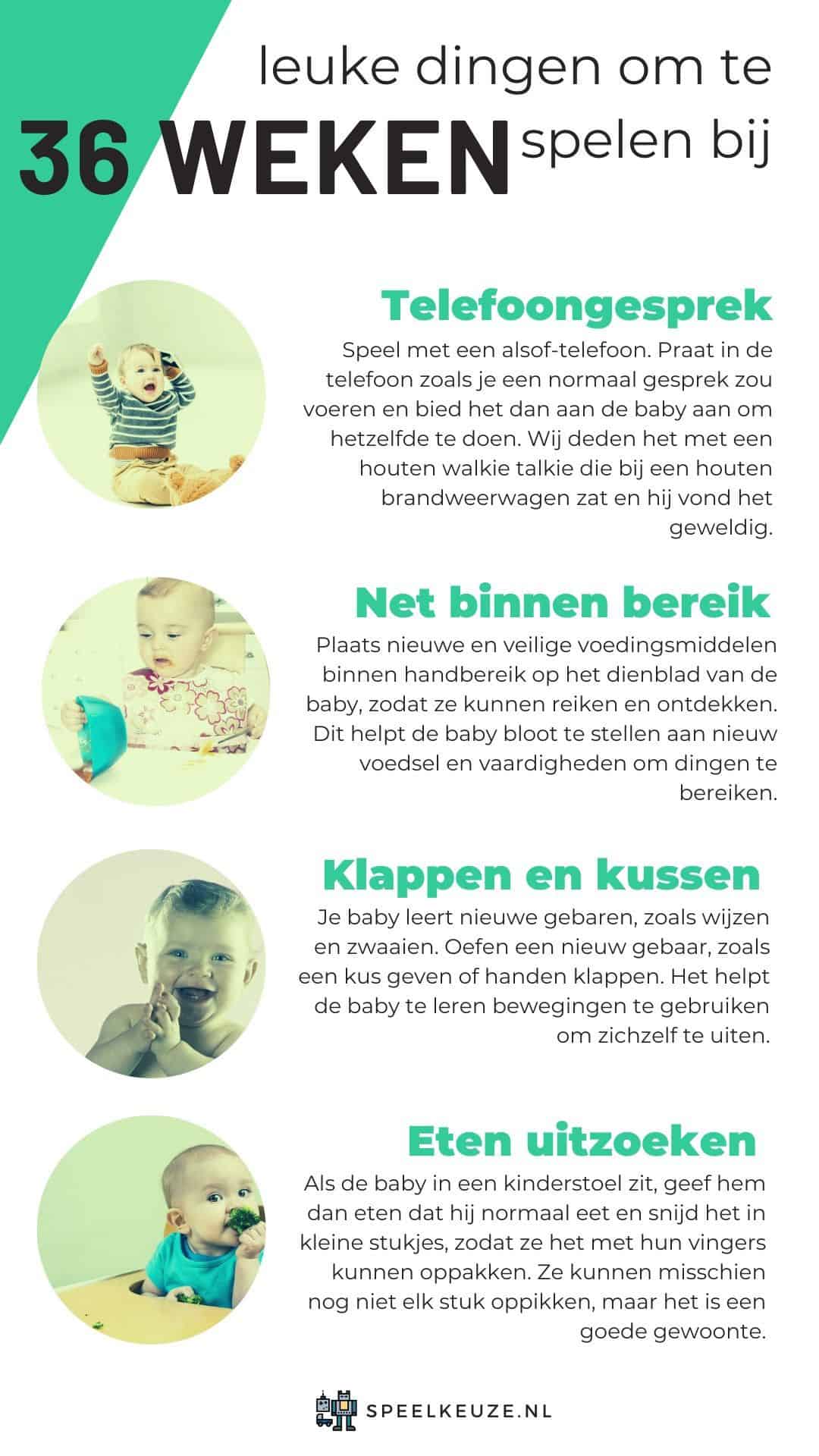
Telephone call
Play with a pretend phone. Talk into the phone as you would on a normal conversation and then offer the baby to do the same.
We did it with a wooden walkie talkie (nice as a first introductory game) that came with a wooden fire truck and he loved it.
This helps the baby to develop listening and communication skills while learning about the objects in the house.
Just within reach
Place new and safe foods within easy reach on the baby's tray for them to reach and explore.
This helps expose the baby to new foods and skills for achieving things.
Clapping and kissing
Your baby will learn new gestures, such as pointing and waving.
Practice a new gesture, such as giving a kiss or clapping hands.
It helps the baby learn to use movements to express themselves.
Selecting food
If the baby is in a high chair, give them food they normally eat and cut it into small pieces so they can pick it up with their fingers.
They may not be able to pick up every piece just yet, but it's good practice.
Helps the baby develop fine motor skills.
Play with your 37 week old baby
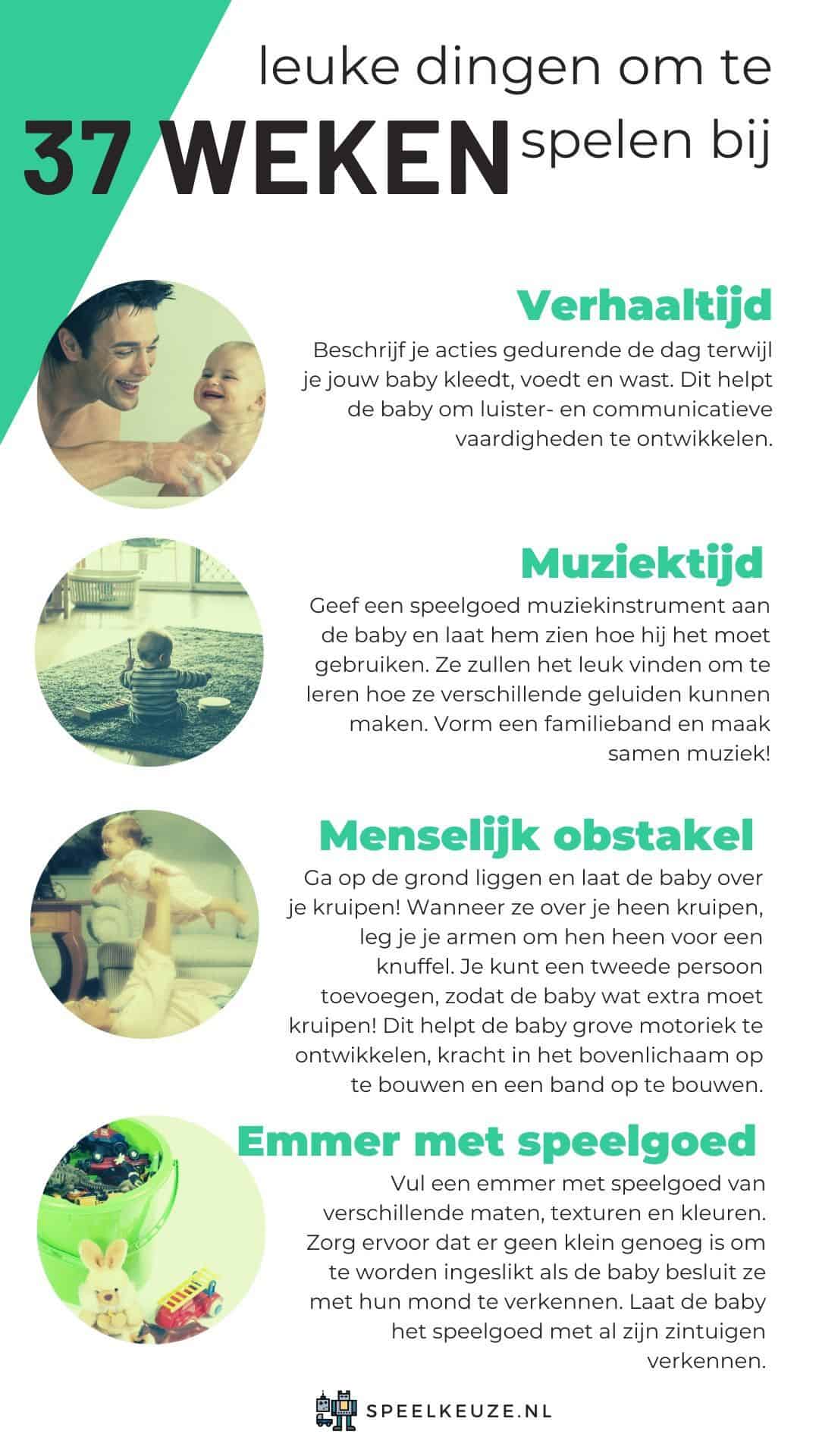
Story time
Describe your actions during the day as you dress, feed and wash your baby.
This helps the baby to develop listening and communication skills.
Music time
Give a toy musical instrument to the baby and show him how to use it.
They will enjoy learning how to make different sounds. Form a family band and make music together!
It helps the baby develop sensory skills.
Human obstacle
Lie on the floor and let the baby crawl over you! When they crawl over you, put your arms around them for a hug.
You can add a second person so the baby has to crawl a little extra!
This helps the baby develop gross motor skills, build upper body strength and bond.
Bucket with toys
Fill a bucket with toys of different sizes, textures and colors.
Make sure there are none small enough to be swallowed if the baby decides to explore them with their mouth.
Let the baby explore the toy with all his senses.
It helps the baby develop sensory skills.
Play with your 38 week old baby
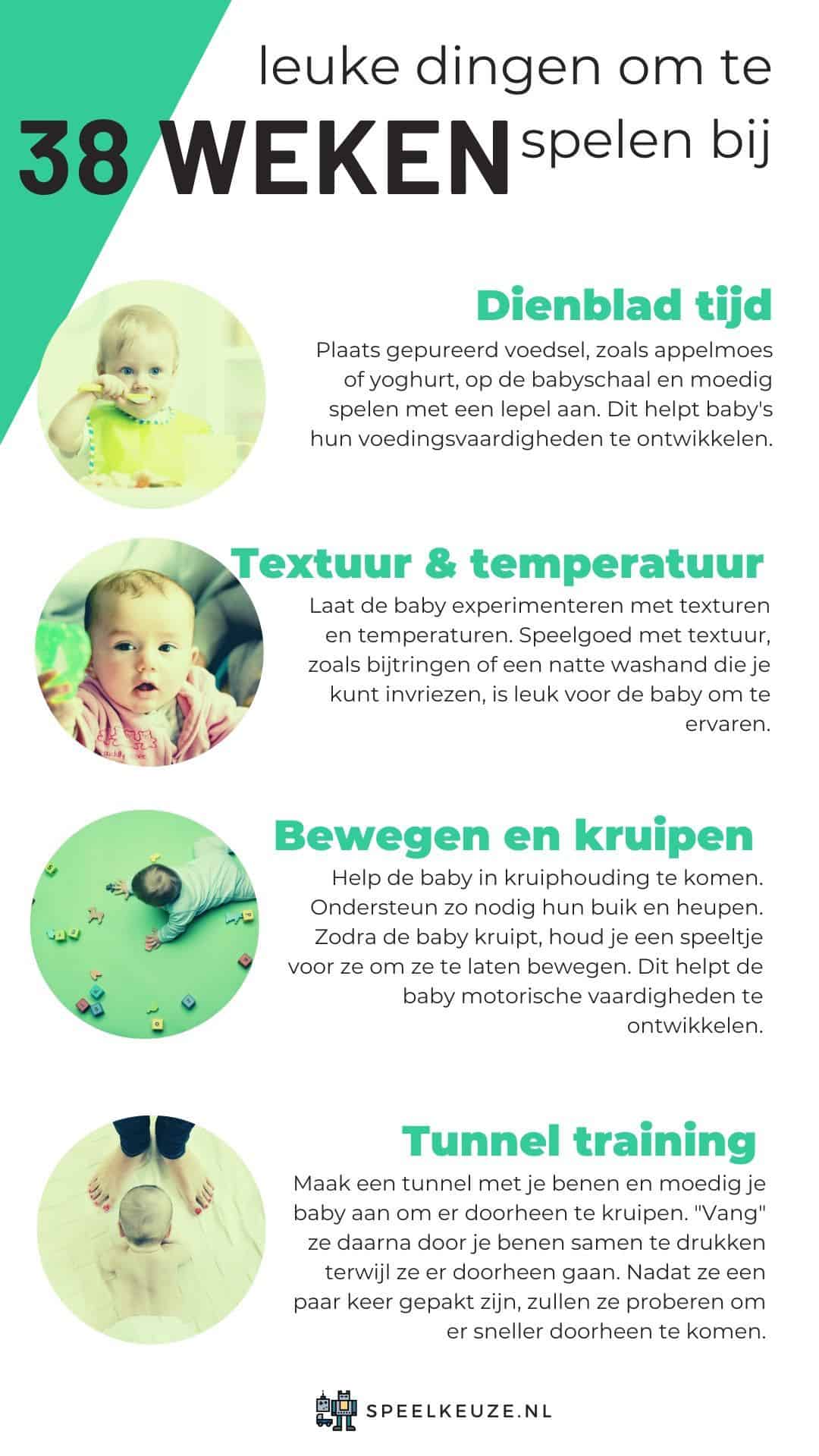
Tray time
Place pureed foods, such as applesauce or yogurt, on the baby bowl and encourage play with a spoon.
This helps babies develop their feeding skills.
Textures and temperatures
Let the baby experiment with textures and temperatures.
Textured toys like teethers or a wet washcloth that you can freeze are fun for the baby to experience.
It aids in sensory development.
Moving and crawling
Help the baby get into a crawling position. If necessary, support their abdomen and hips.
Once the baby crawls, hold a toy in front of them to make them move.
This helps the baby develop motor skills.
tunnel training
Make a tunnel with your legs and encourage your baby to crawl through it.
Then "catch" them by squeezing your legs together as they pass through. After being caught a few times, they will try to get through it faster.
This helps the baby develop gross motor skills.
Playing with your 39 week (9 month) baby
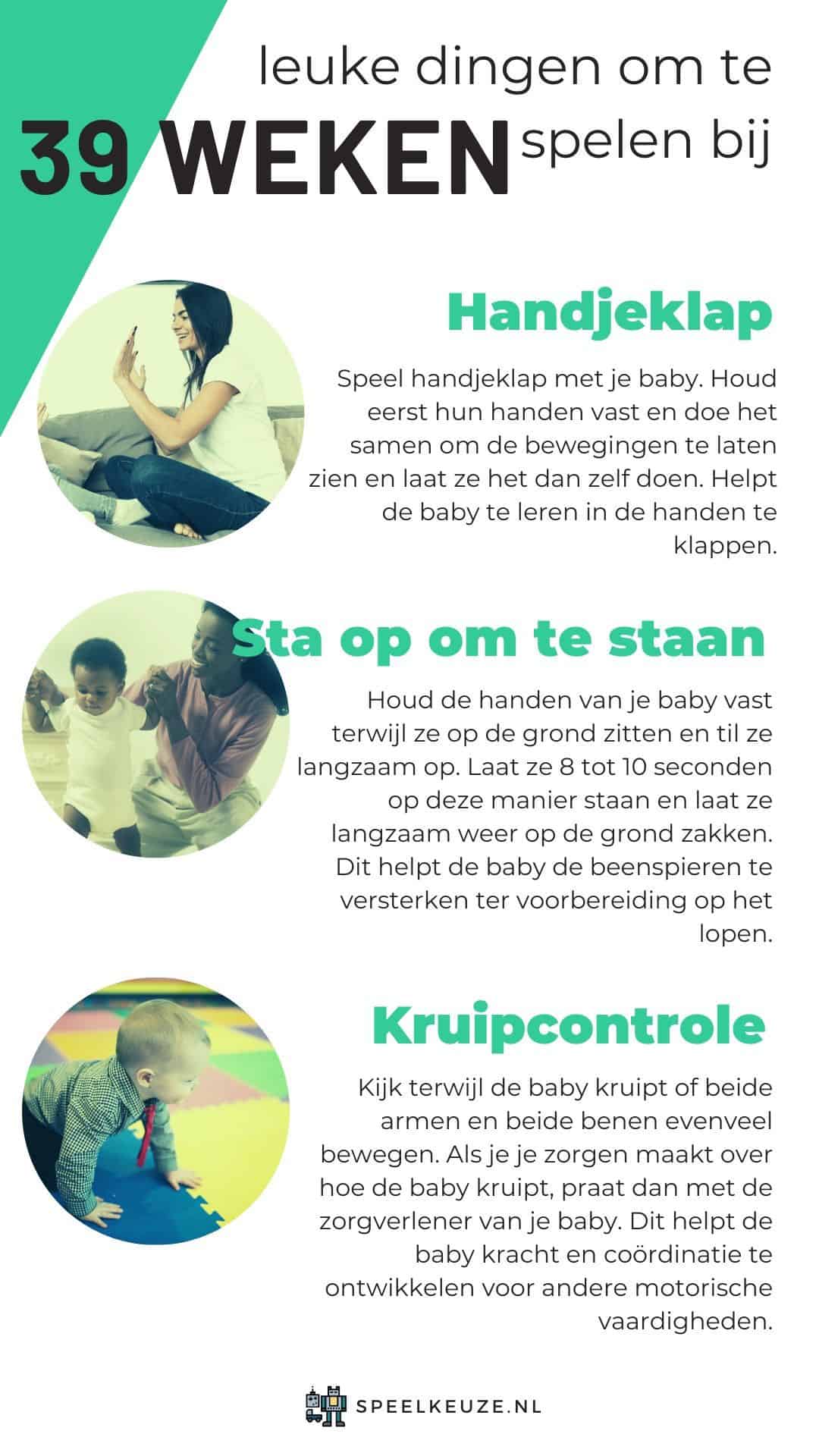
Hand clap
Play clapping hands with your baby. First, hold their hands and do it together to show the movements and then let them do it themselves.
Helps the baby learn to clap hands.
Get up to stand
Hold your baby's hands while they are on the floor and slowly lift them.
Let them stand this way for 8 to 10 seconds and slowly lower them back to the floor.
This helps the baby to strengthen the leg muscles in preparation for walking.
Creep control
As the baby crawls, see if both arms and both legs move equally.
If you are concerned about how the baby crawls, talk to your baby's health care provider.
This helps the baby develop strength and coordination for other motor skills.
Key milestones of 10-12 months
Motor milestones
- Pulls up to stand and walks past furniture
- In the end stands alone and takes several independent steps
- Moves in and out of different positions to explore the environment and get the toys you want
- Maintains balance while sitting when throwing objects
- Claps hands
- Can put items into a container with a large opening
- Uses thumb and index finger to pick up small items
Sensory milestones
- Likes to listen to songs
- Explores toys with fingers and mouth
- Crawls towards or away from objects the baby sees in the distance
Communication milestones
- Uses meaningful "mama" or "papa"
- Responds to simple directions, eg "Come here"
- Produces long stretches of gibberish in social communication
- Says one or two words
- Imitates speech sounds
- Chatting has sounds and speech rhythms
- Pay attention to where you look and point
- Responds to “no”
- Starts to use hand movements to communicate wants and needs, eg reaching out to be picked up
Nutritional milestones
- Finger feeds itself
- Eating an increasing variety of foods
- Starts using an open cup
- Ready to try soft-cooked vegetables, soft fruits and finger food (banana slices, cooked pasta)
- Maybe you are ready to start self-feeding with spoons and soft forks
- Enjoy a wider variety of scents and flavors
Play with your 40 week old baby
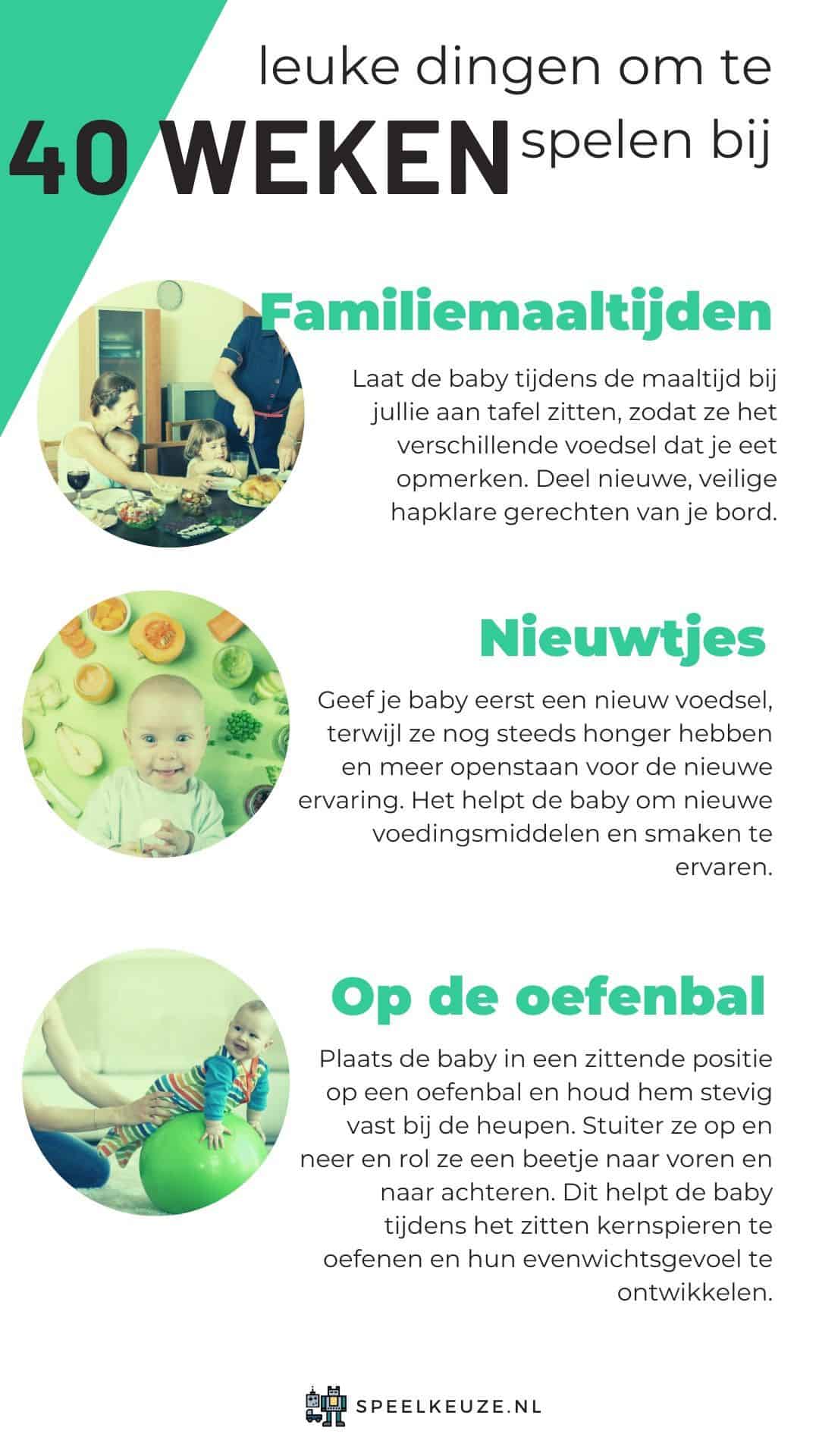
Family meals
During the meal, have the baby sit with you at the table so that they notice the different foods you eat.
Share new, safe, bite-sized dishes from your plate.
This helps expose the baby to different smells and sights.
News
Give your baby a new food first, while they are still hungry and more open to the new experience.
It helps the baby to experience new foods and flavors.
Sit on the exercise ball
Place the baby in a sitting position on an exercise ball and hold it firmly by the hips.
Bounce them up and down and roll them back and forth a bit.
This helps the baby to exercise core muscles and develop their sense of balance while sitting.
Play with your 41 week old baby
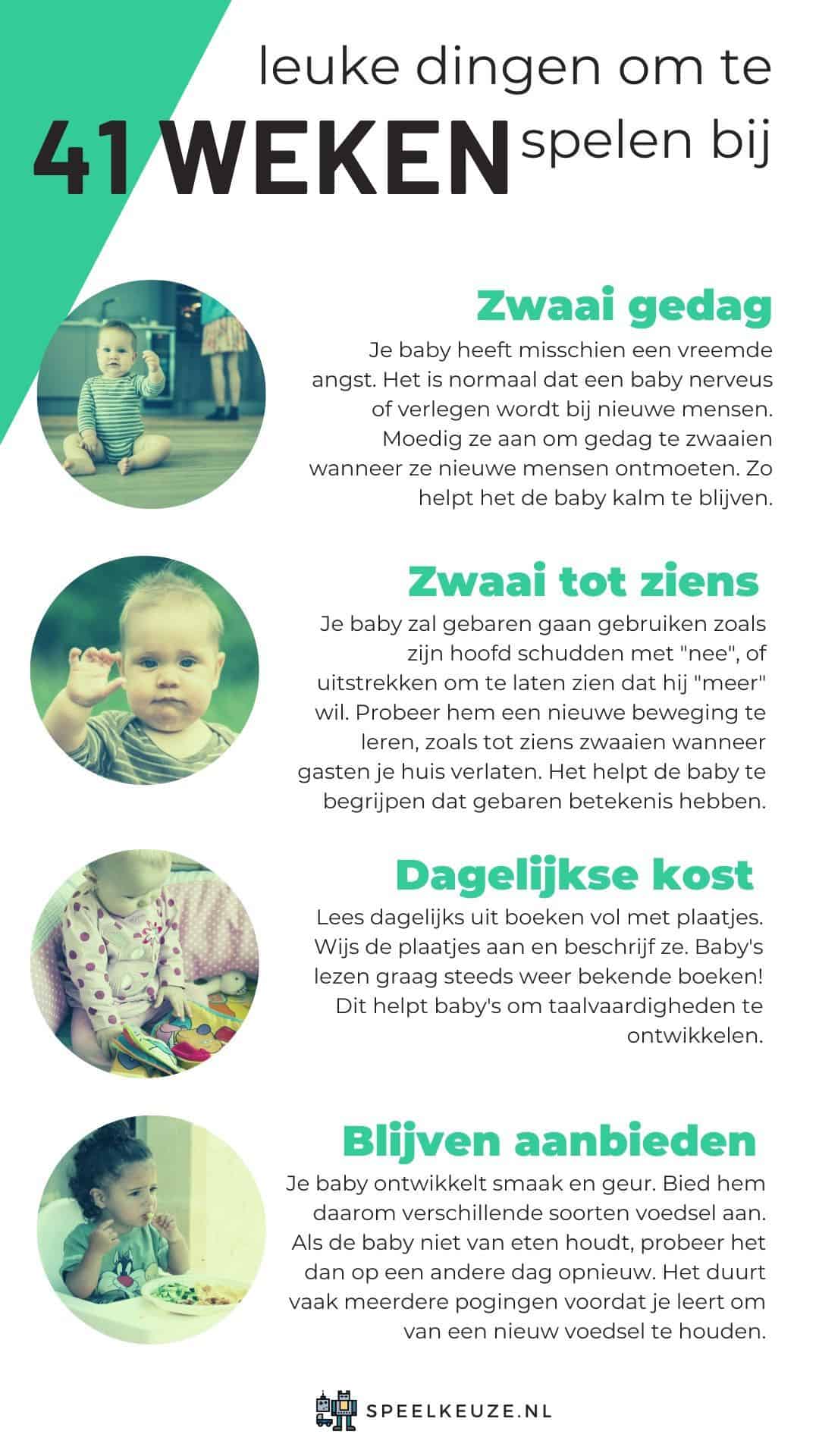
Wave goodbye
Your baby may have a strange fear. It is normal for a baby to become nervous or shy around new people.
Encourage them to wave goodbye when they meet new people.
Thus, it helps the baby to stay calm.
Wave goodbye
Your baby will start using gestures such as shaking his head with “no” or stretching out to show that he wants “more”.
Try to teach him a new move, such as waving goodbye when guests leave your house.
It helps the baby understand that gestures have meaning.
Daily food
Read books full of pictures every day. Point to the pictures and describe them.
Babies love to read well-known books over and over again!
This helps babies develop language skills.
Continue to offer
Your baby develops taste and smell. Therefore, offer him different types of food.
If the baby doesn't like to eat, try again another day. It often takes several tries before you learn to love a new food.
This helps babies develop their sense of taste and smell and learn what foods they like.
Play with your 42 week old baby
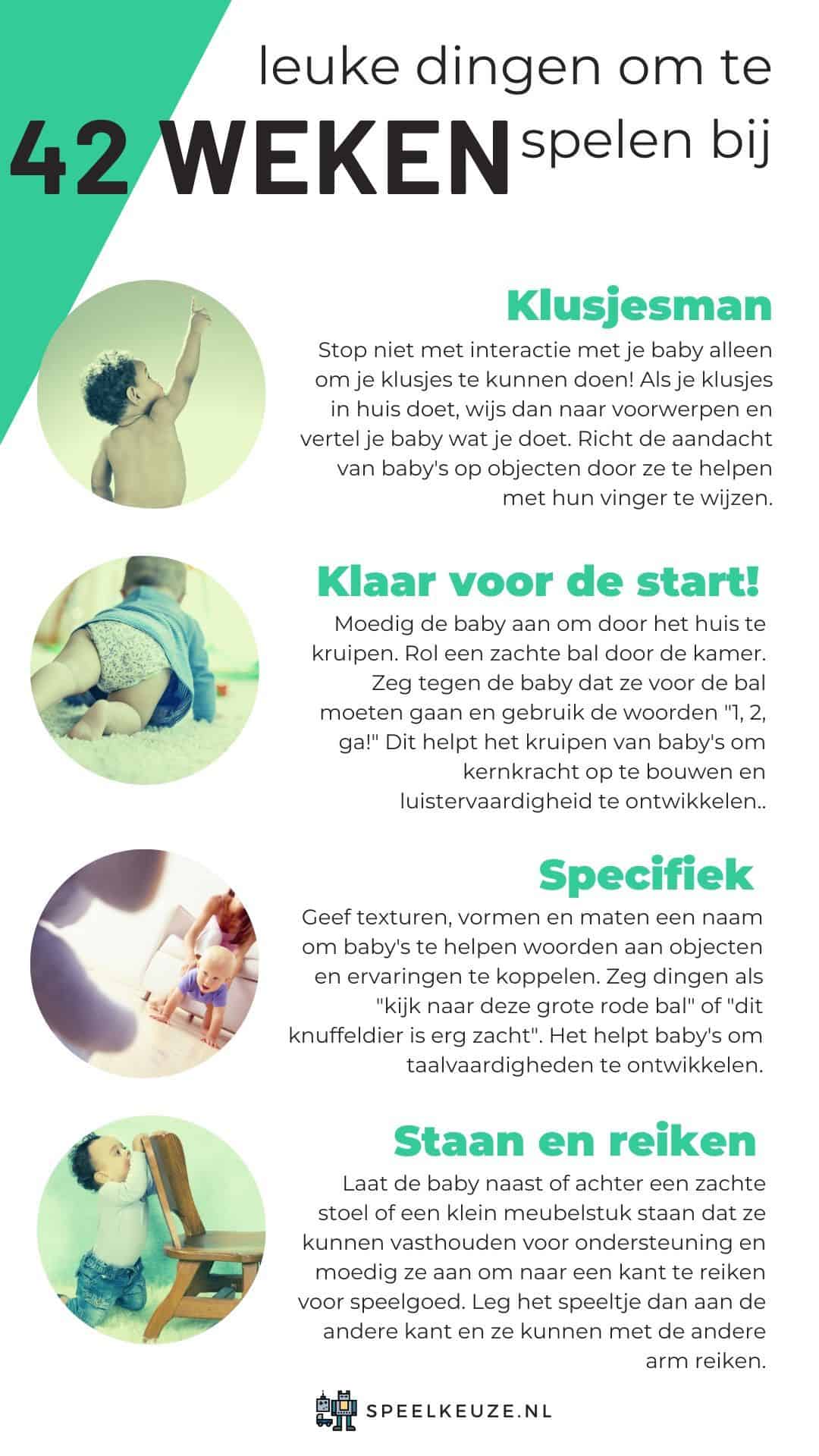
Handyman
Don't stop interacting with your baby just to do your chores!
When doing chores around the house, point to objects and tell your baby what you are doing. Draw babies' attention to objects by helping them point their finger.
This helps babies learn to focus their attention.
Ready!
Encourage the baby to crawl around the house.
Roll a soft ball across the room. Tell the baby to go for the ball and use the words “1, 2, go!”.
This helps babies crawl to build core strength and develop listening skills.
Specific
Name textures, shapes and sizes to help babies associate words with objects and experiences.
Say things like "look at this big red ball" or "this stuffed animal is very soft".
It helps babies develop language skills.
Stand and reach
Have the baby stand next to or behind a soft chair or small piece of furniture they can hold for support and encourage them to reach to one side for toys.
Then put the toy on the other side and they can reach out with the other arm.
It helps the baby learn to shift weight to prepare for walking.
Playing with your 43 week (10 month) baby
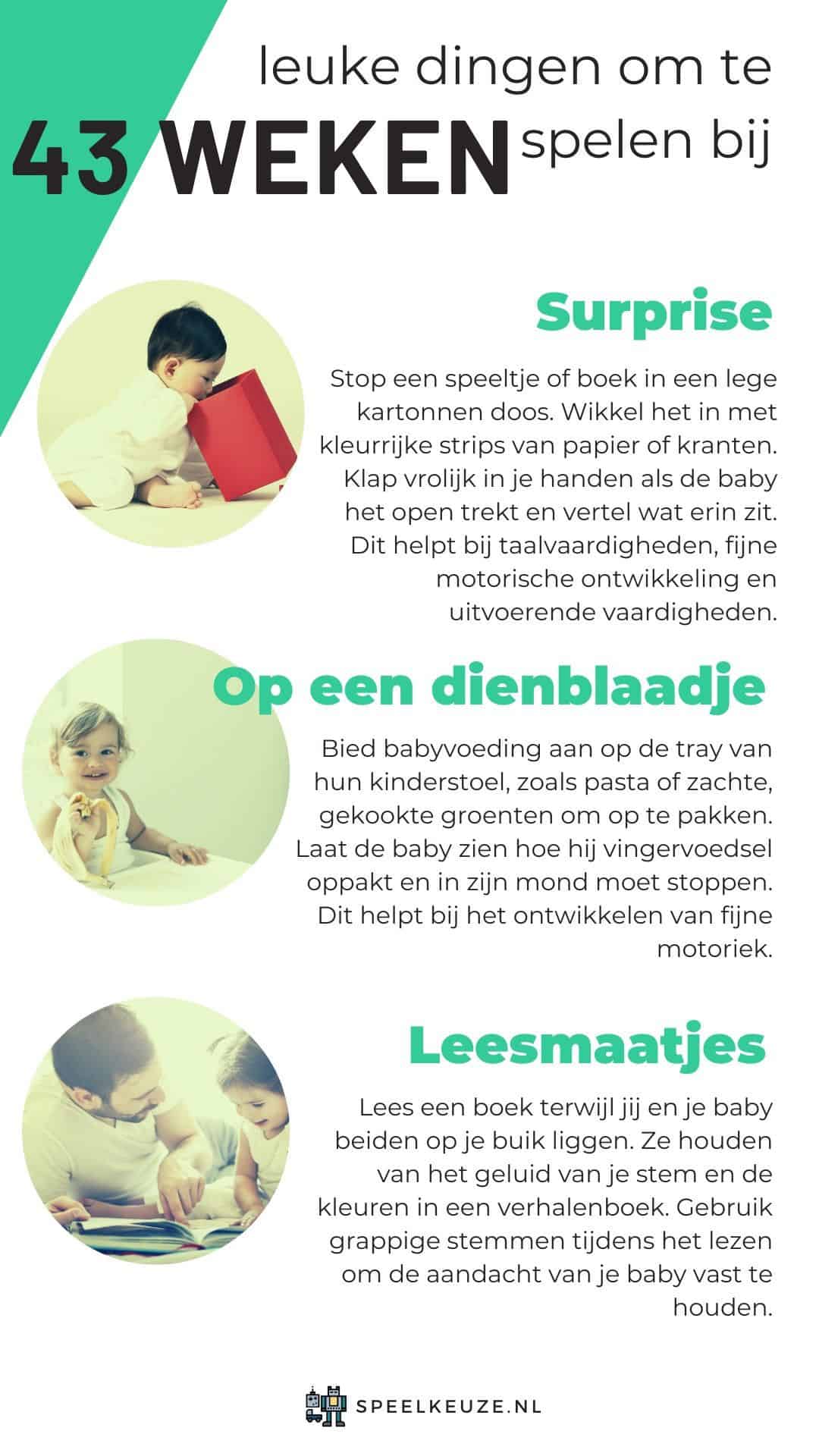
Surprise
Place a toy or book in an empty cardboard box. Wrap it with colorful strips of paper or newspaper.
Cheerfully clap your hands when the baby pulls it open and tell them what's inside.
This helps with language skills, fine motor development and executive skills.
On a tray
Offer baby food on the tray of their high chair, such as pasta or soft, cooked vegetables to pick up.
Show the baby how to pick up finger food and put it in his mouth.
This helps develop fine motor skills.
Reading buddies
Read a book while you and your baby are both on your stomach.
They love the sound of your voice and the colors in a storybook. Use funny voices while reading to keep your baby's attention.
It helps the baby have fun during Tummy Time.
Play with your 44 week old baby
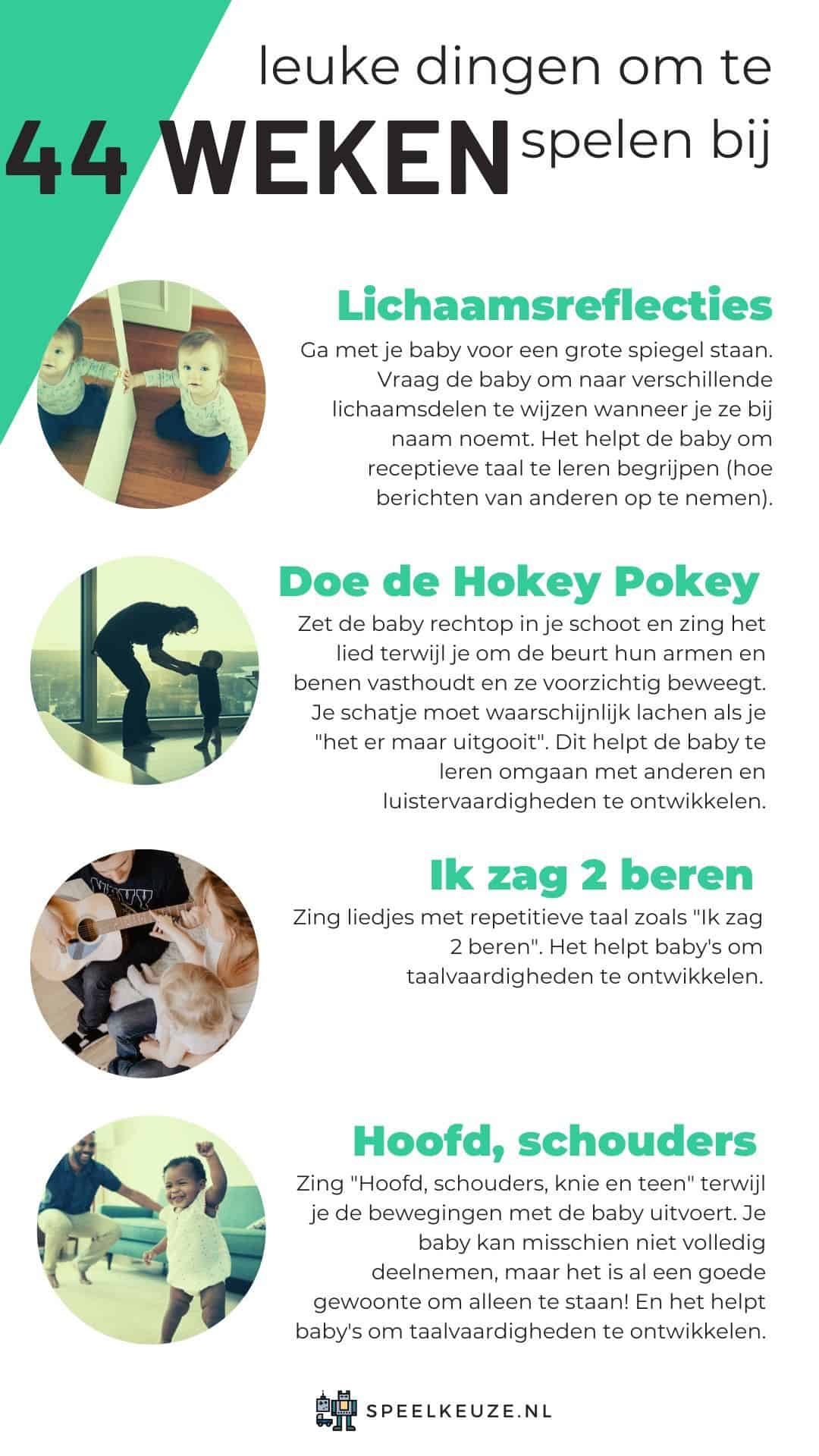
Body reflections
Stand in front of a large mirror with your baby.
Ask the baby to point to different body parts when you call them by name.
It helps the baby to understand receptive language (how to record messages from others).
Do the Hokey Pokey
Sit the baby upright in your lap and sing the song while taking turns holding their arms and legs and moving them gently.
Your baby should probably laugh if you "just throw it out".
This helps the baby learn to interact with others and develop listening skills.
I saw 2 bears
Sing songs with repetitive language such as “I saw 2 bears”.
It helps babies develop language skills.
Head shoulders knee and toe
Sing "Head, Shoulders, Knees and Toes" as you perform the movements with the baby.
Your baby may not be able to fully participate, but it is already good practice to stand alone!
And it helps babies develop language skills.
Play with your 45 week old baby
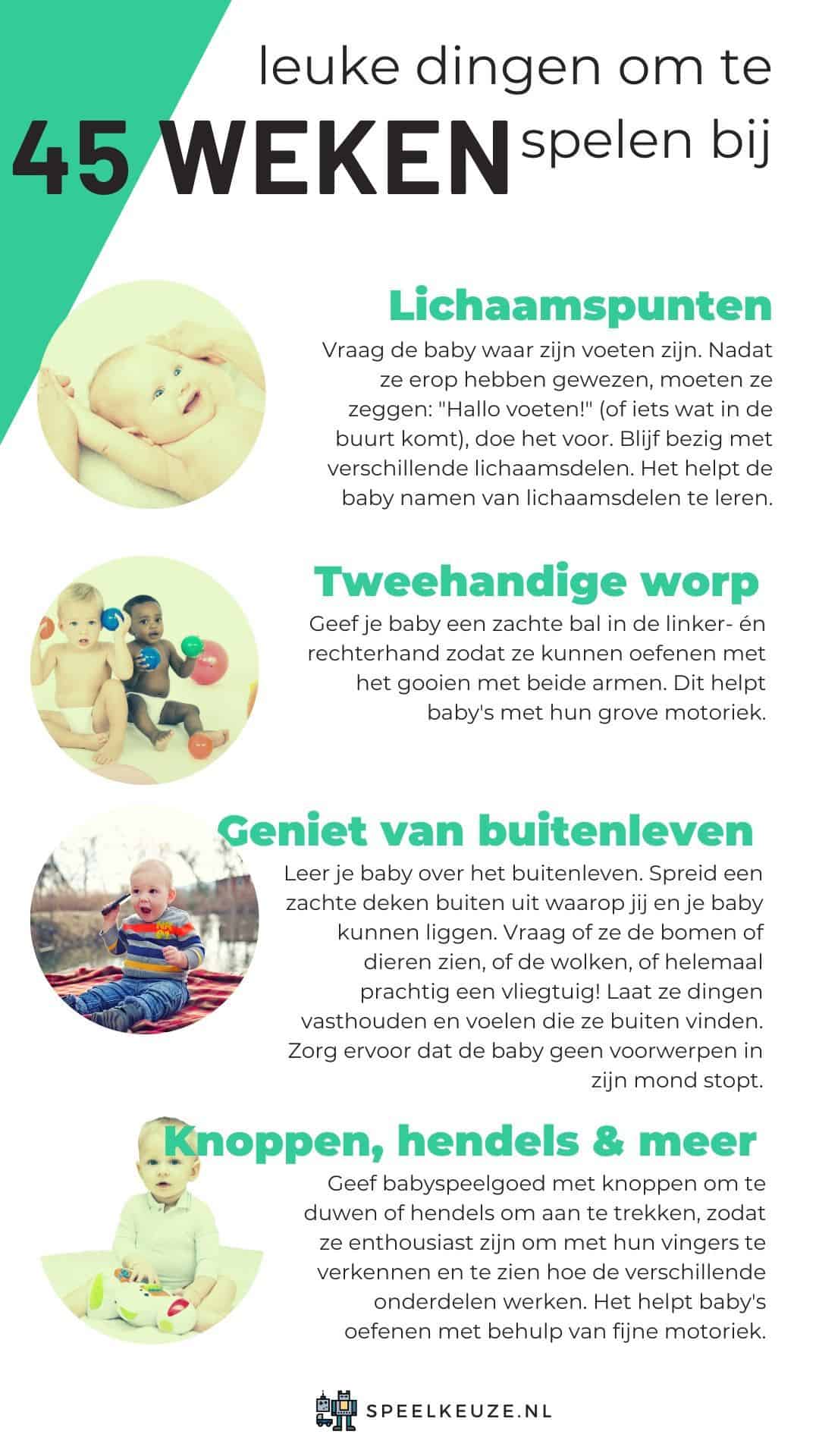
Body points
Ask the baby where his feet are.
After pointing it out, they should say, "Hello feet!" (or something close to it), demonstrate it. Keep busy with different body parts.
It helps the baby learn names of body parts.
Two-handed throw
Give your baby a soft ball in the left and right hands so they can practice throwing with both arms.
This helps babies with their gross motor skills.
Enjoy the outdoors
Teach your baby about the outdoors. Spread a soft blanket outside for you and your baby to lie on.
Ask if they see the trees or animals, or the clouds, or a beautiful plane! Let them hold and feel things they find outside.
Make sure the baby does not put any objects in its mouth.
This helps babies develop their sense of touch and smell as they get to know the world around them.
Buttons, levers and more
Provide baby toys with buttons to push or levers to pull so they are excited to explore with their fingers and see how the different parts work.
It helps babies practice using fine motor skills.
Play with your 46 week old baby
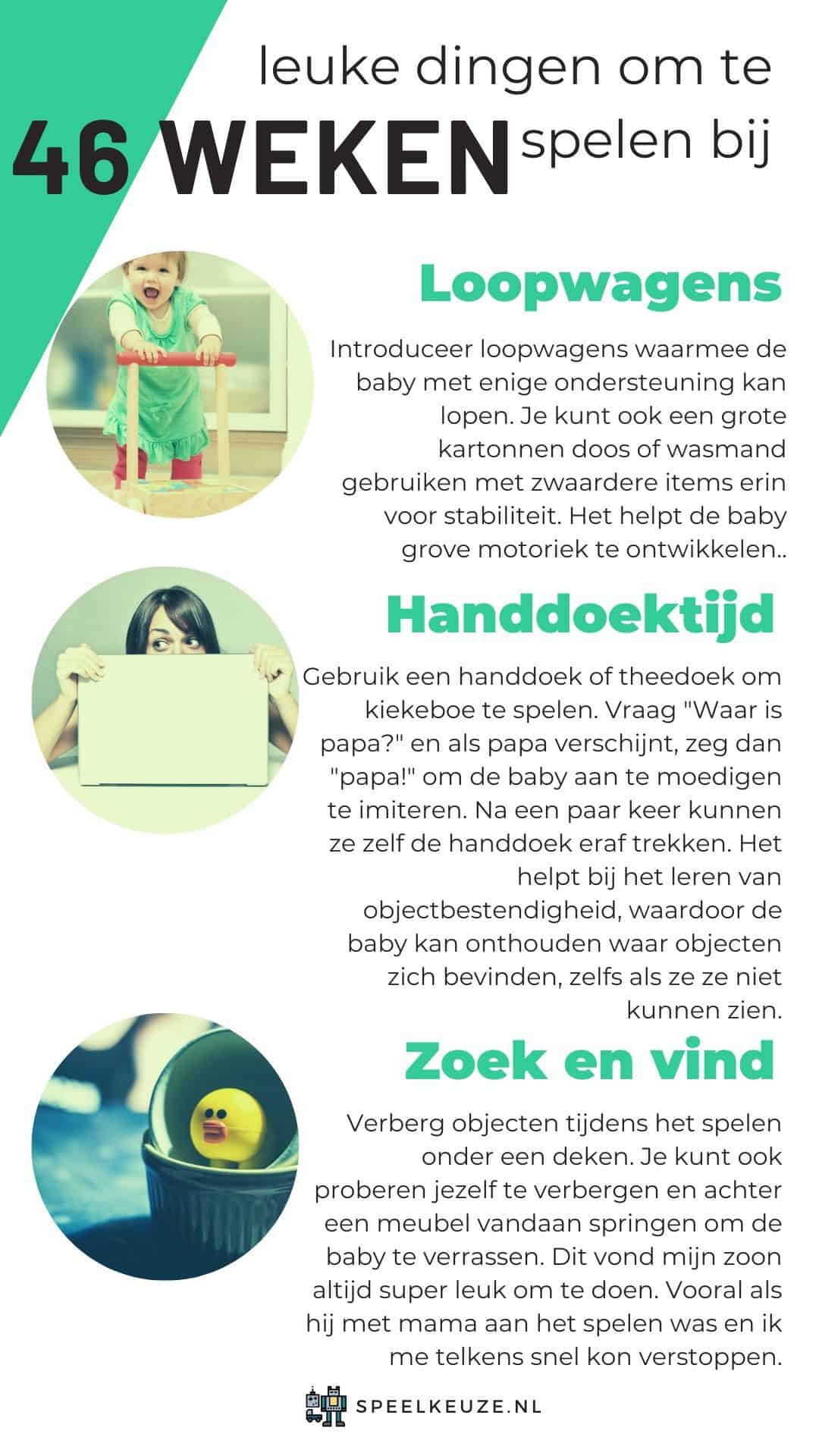
Carriages
Introduce walkers that allow the baby to walk with some support.
You can also use a large cardboard box or laundry basket with heavier items inside for stability. My child somehow always wanted to run around with the unfolded Albert Heijn crates that came with the order (really a godsend by the way, ordering groceries online during this busy period).
It helps the baby develop gross motor skills.
Towel time
Use a towel or tea towel to peekaboo (good for development!) to play.
Ask "Where's Daddy?" and when daddy shows up, say "daddy!" to encourage the baby to imitate. After a few times they can pull the towel off themselves.
It helps in learning object constancy, allowing the baby to remember where objects are, even if they can't see them.
Seek and find
Hide objects under a blanket while playing. You can also try to hide and jump out from behind a piece of furniture to surprise the baby.
My son always loved doing this. Especially when he was playing with Mom and I could hide quickly every time.
I also have to mention this one because a great toy for this is this Miffy hide and seek game. It is a Miffy that will shout itself when you hide her and certainly good for a lot of play sessions:

This also helps in learning object permanence.
Play with your 47 week old baby
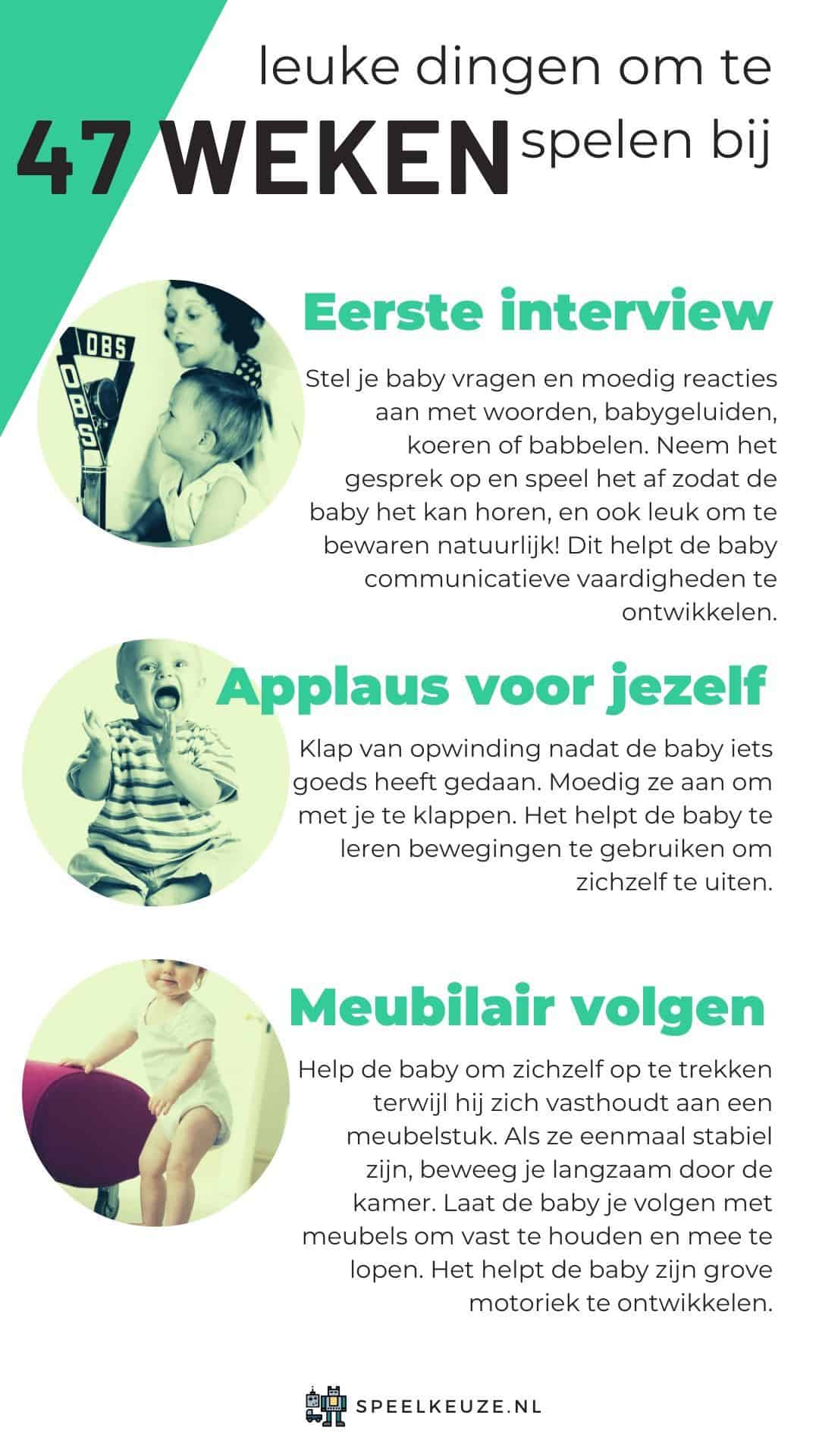
First interview
Ask your baby questions and encourage responses with words, baby sounds, cooing or chatting. Record the conversation and play it back for the baby to hear, and it's also fun to keep!
This helps the baby develop communication skills.
Give yourself a round of applause
Clap with excitement after the baby does something good. Encourage them to clap with you.
It helps the baby learn to use movements to express themselves.
Follow furniture
Help the baby pull himself up while holding on to a piece of furniture.
Once they are stable, slowly move around the room. Have the baby follow you with furniture to hold and walk with.
It helps the baby develop gross motor skills.
Playing with your 48 week (11 month) baby
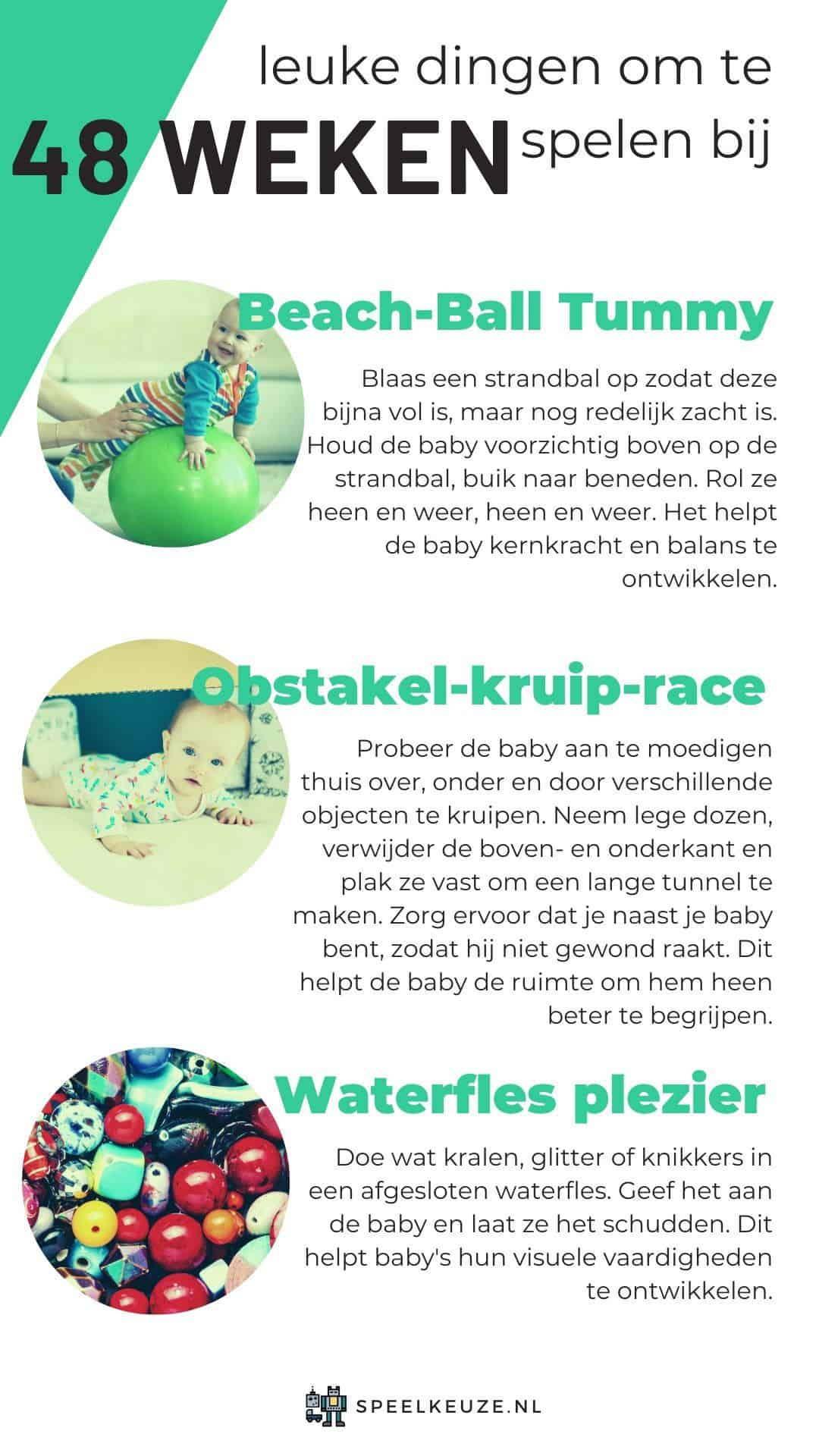
Beach Ball Tummy Time
Blow up a beach ball so that it is almost full, but still quite soft.
Gently hold the baby on top of the beach ball, tummy down. Roll them back and forth, back and forth.
It helps the baby develop core strength and balance.
Obstacle crawl race
Try to encourage the baby to crawl over, under and through various objects at home.
Take empty boxes, remove the top and bottom and tape them to make a long tunnel. Make sure you are next to your baby so he doesn't get hurt.
This helps the baby better understand the space around him.
Water bottle fun
Put some beads, glitter or marbles in a sealed water bottle. Give it to the baby and let them shake it.
This helps babies develop their visual skills.
Play with your 49 week old baby
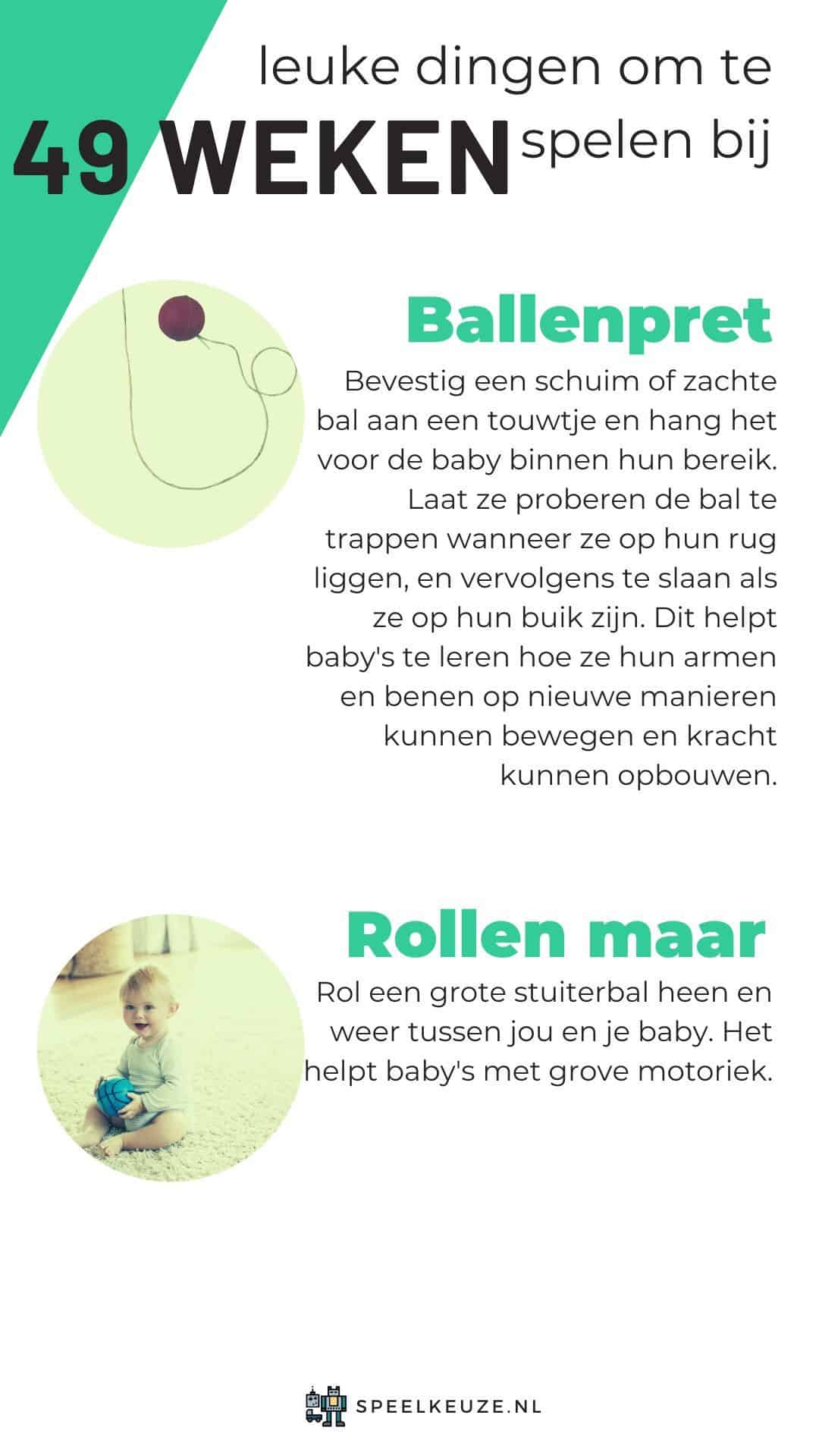
Ball fun
Attach a foam or soft ball to a string and hang it within reach of the baby.
Have them try to kick the ball when they are on their back, then hit when they are on their stomach.
This helps babies learn how to move their arms and legs in new ways and build strength.
Just roll
Roll a large bouncing ball back and forth between you and your baby.
It helps babies with gross motor skills.
Play with your 50 week old baby
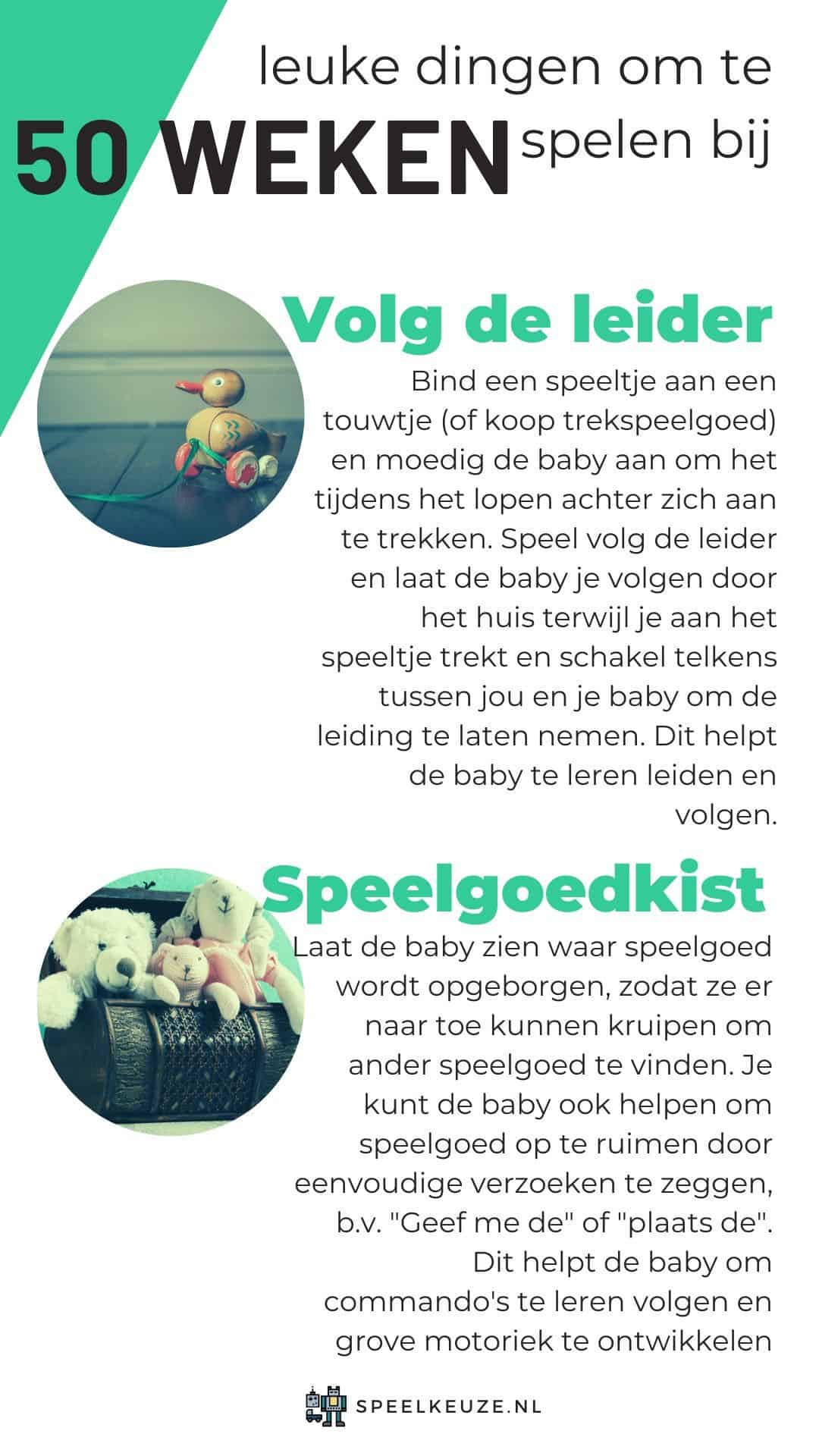
follow the leader
Tie a toy on a string (or buy a pull toy) and encourage the baby to pull it behind him while walking.
Play follow the leader and let the baby follow you around the house as you pull the toy, switching between you and your baby each time to let them take charge.
This helps the baby learn to lead and follow.
Toy box
Show the baby where toys are stored in the toy box so they can crawl over to find other toys.
You can also help the baby to put away toys by saying simple requests, eg "Give me the" or "Place the".
This helps the baby learn to follow commands and develop gross motor skills
Play with your 51 week old baby
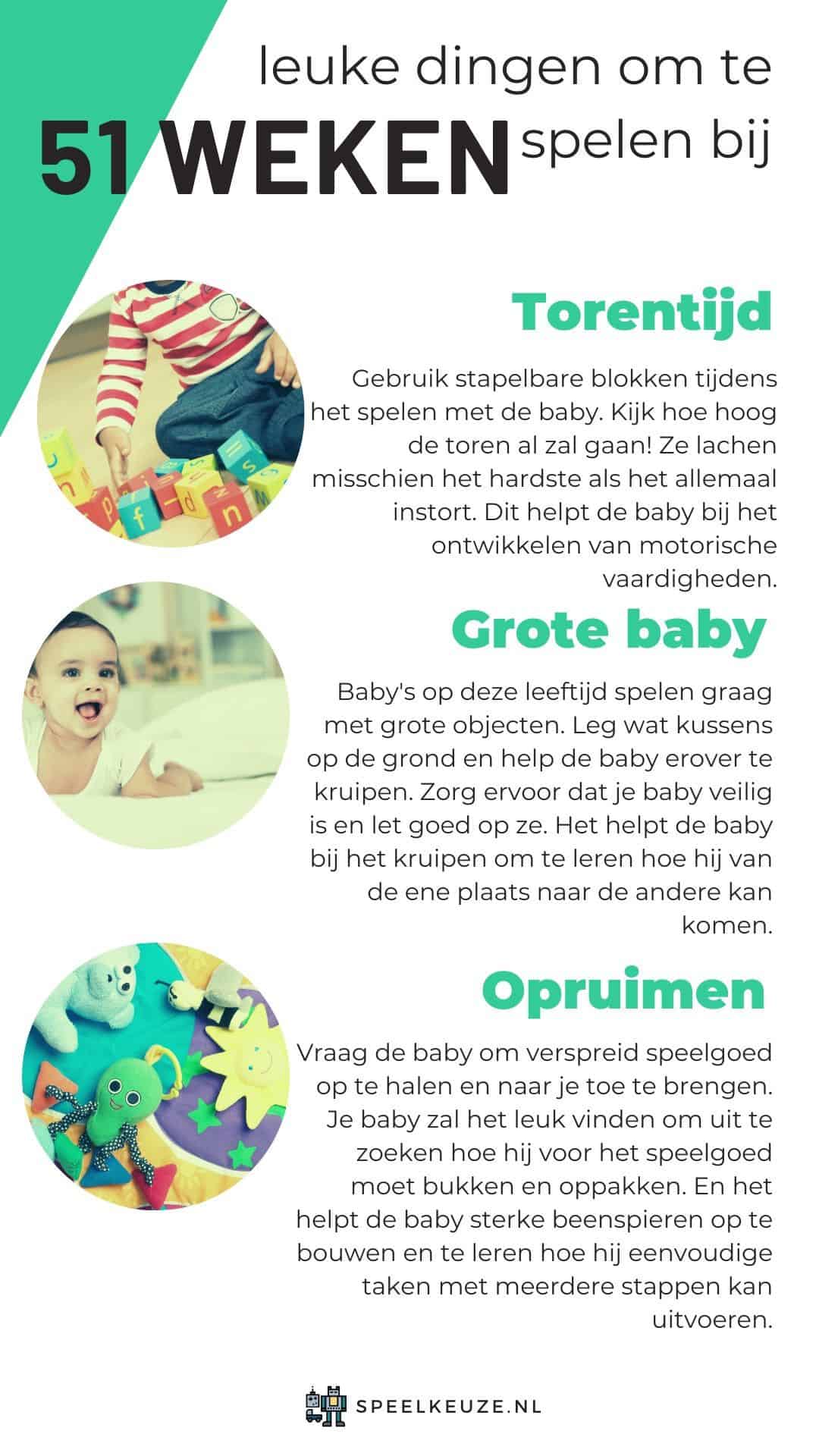
Tower time
Use stackable blocks while playing with the baby.
See how high the tower will go! They may laugh the loudest when it all collapses.
This helps the baby develop motor skills.
Big baby
Babies at this age like to play with large objects.
Place some pillows on the floor and help the baby crawl over them. Make sure your baby safe and and pay close attention to them.
It helps the baby in crawling to learn how to get from one place to another.
To clean up
Ask the baby to pick up and bring scattered toys to you.
Your baby will enjoy figuring out how to bend and pick up in front of the toy.
And it helps the baby build strong leg muscles and learn how to perform simple multi-step tasks.
Playing with your 52 week (12 month) baby
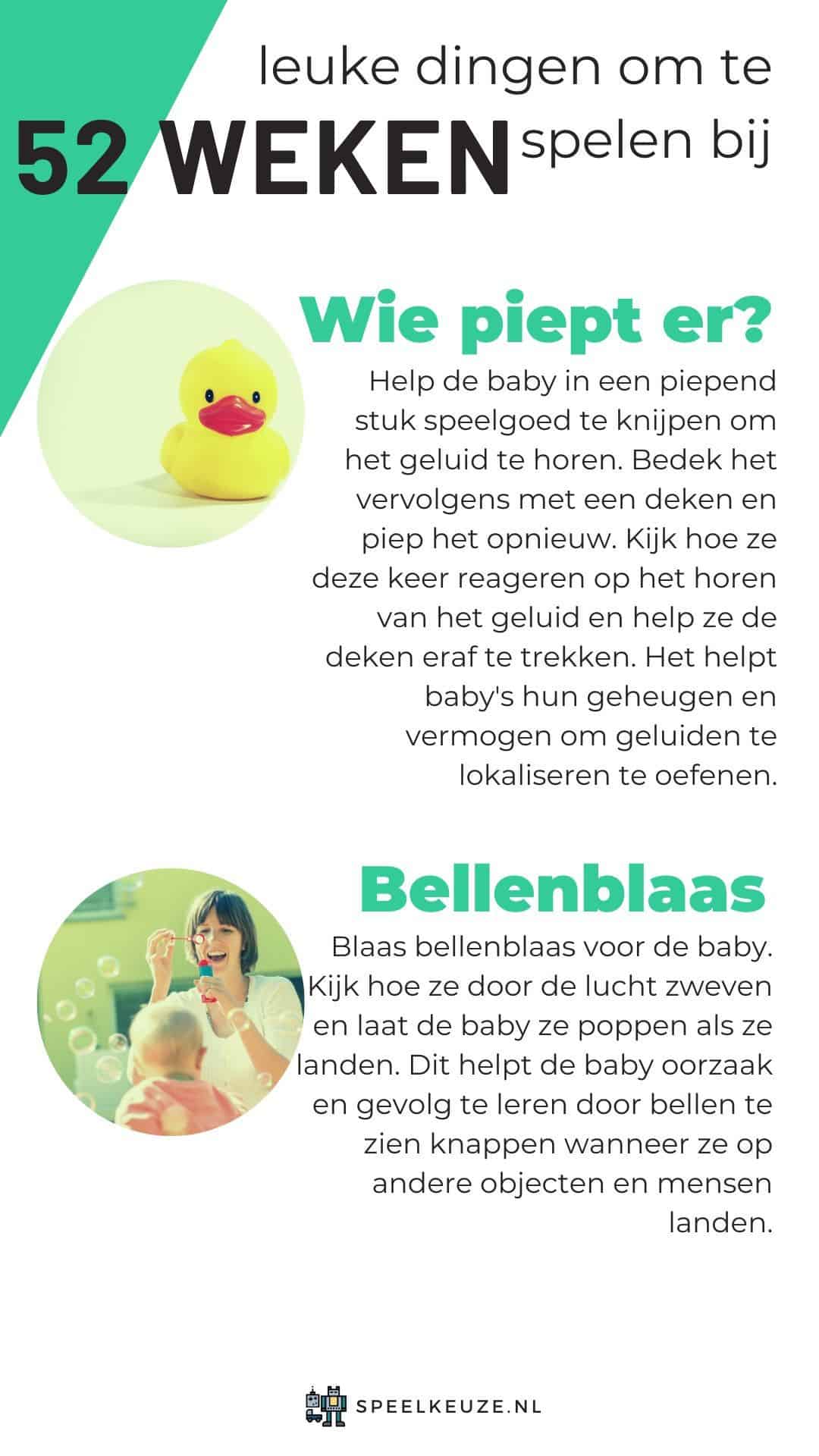
Hear who is beeping?
Help the baby squeeze a squeaky toy to hear the sound.
Then cover it with a blanket and squeak it again. This time, watch how they react to hearing the sound and help them pull the blanket off.
It helps babies exercise their memory and ability to locate sounds.
Bubbles
Blow bubbles for the baby. Watch them float through the air and let baby pop them when they land.
This helps the baby learn cause and effect by seeing bubbles pop when they land on other objects and people.
How does a baby learn about itself?
When a baby looks in the mirror before its first year of life, it has no idea who or what it is looking at.
Between six and 18 months, a baby does become interested in its own reflection; it will laugh and look at it, even if it does not know exactly who or what it is seeing.
Children are not born with thoughts about themselves. They learn about themselves through what is said to them by others and how others behave towards them.
In the second half of its first year of life, a baby does not learn to imagine itself.
The first years of a child's life are extremely important for developing a (positive) self-image, and the role of parents in this is crucial.

Always something to do for the holidays or rainy day?
Play Choice now has the ultimate activity book collection, with over 60 pages of fun coloring pages and educational puzzles.
Joost Nusselder, the founder of Speelkeuze.nl is a content marketer, father and loves trying out new toys. As a child he came into contact with everything related to games when his mother started the Tinnen Soldaat in Ede. Now he and his team create helpful blog articles to help loyal readers with fun play ideas.
